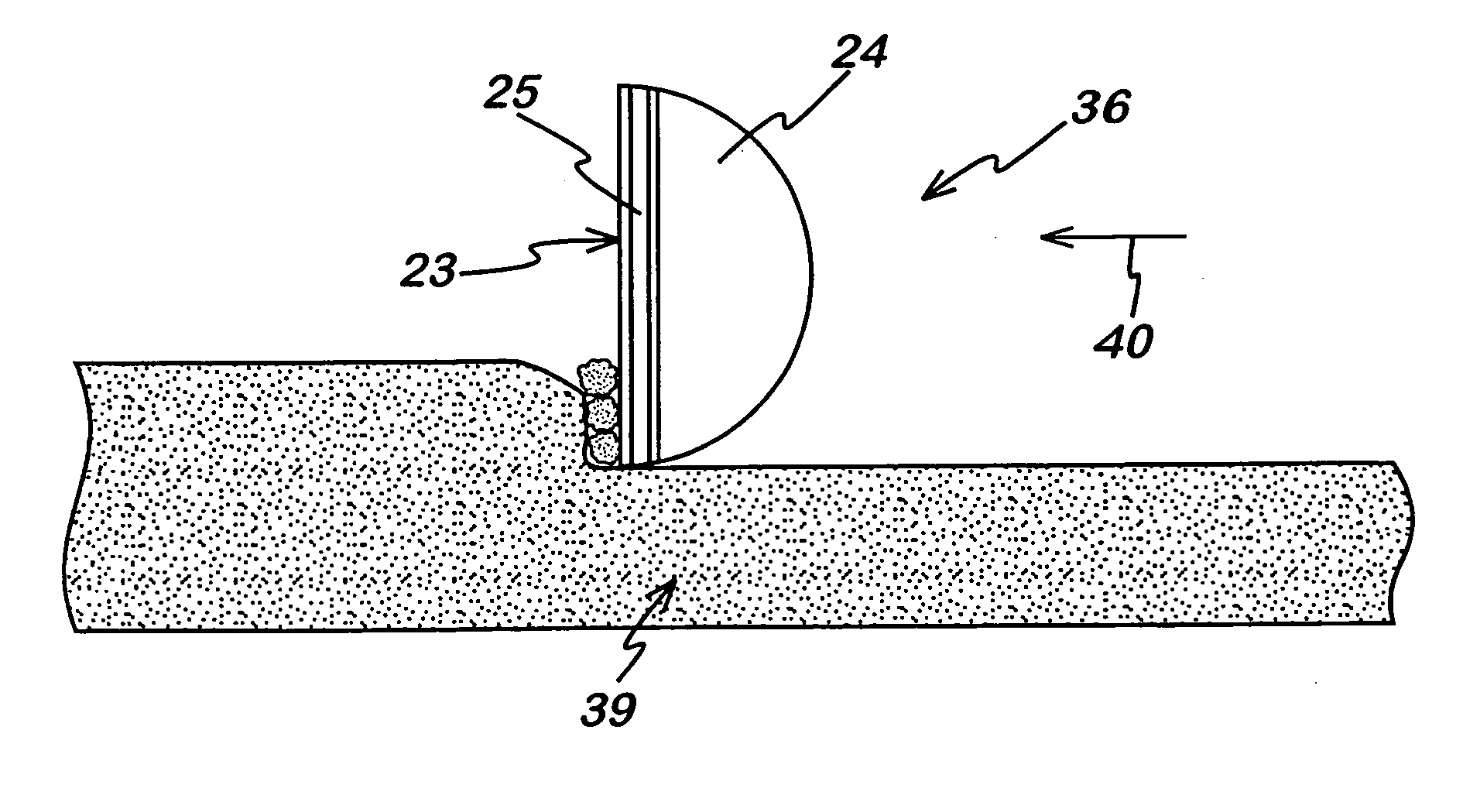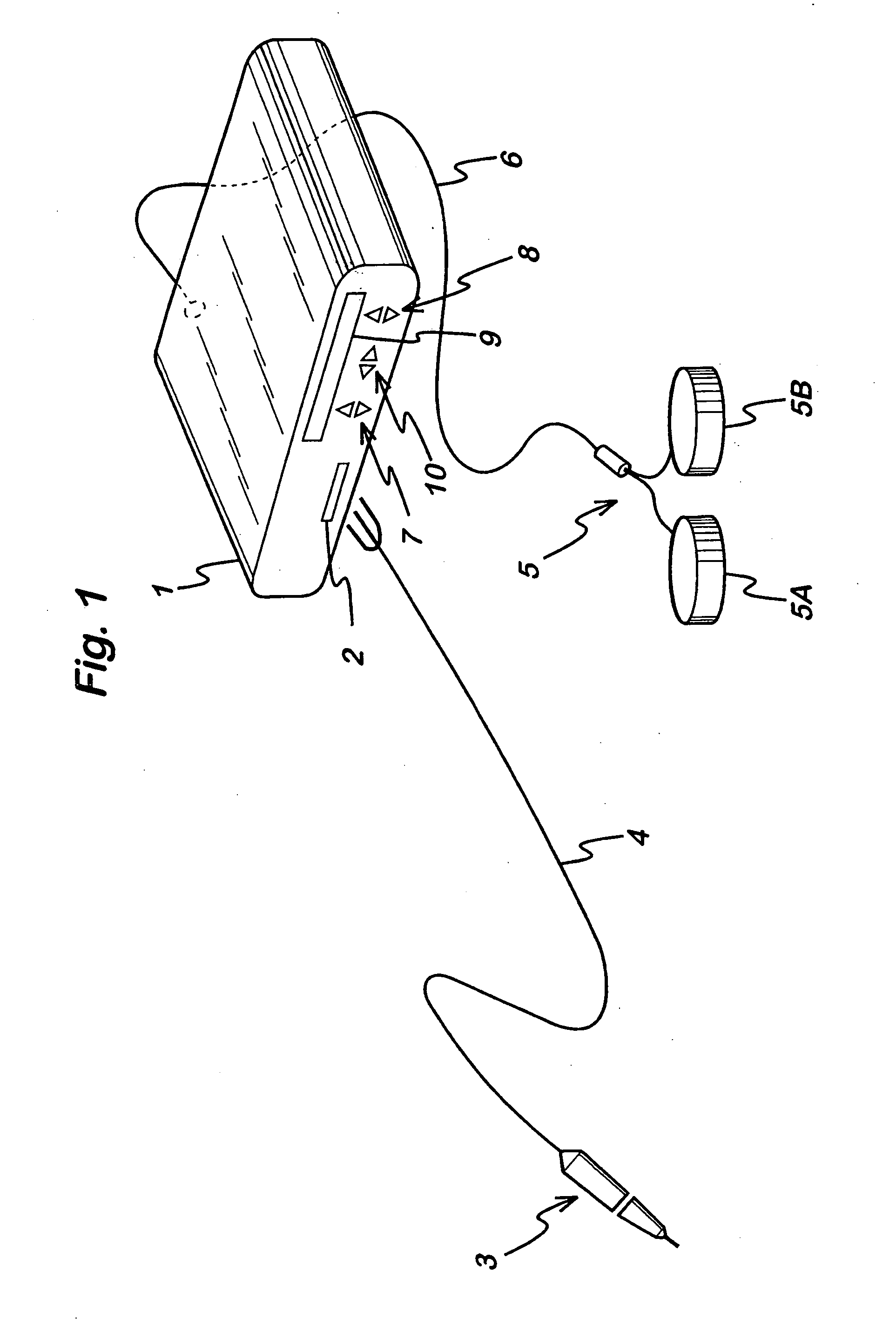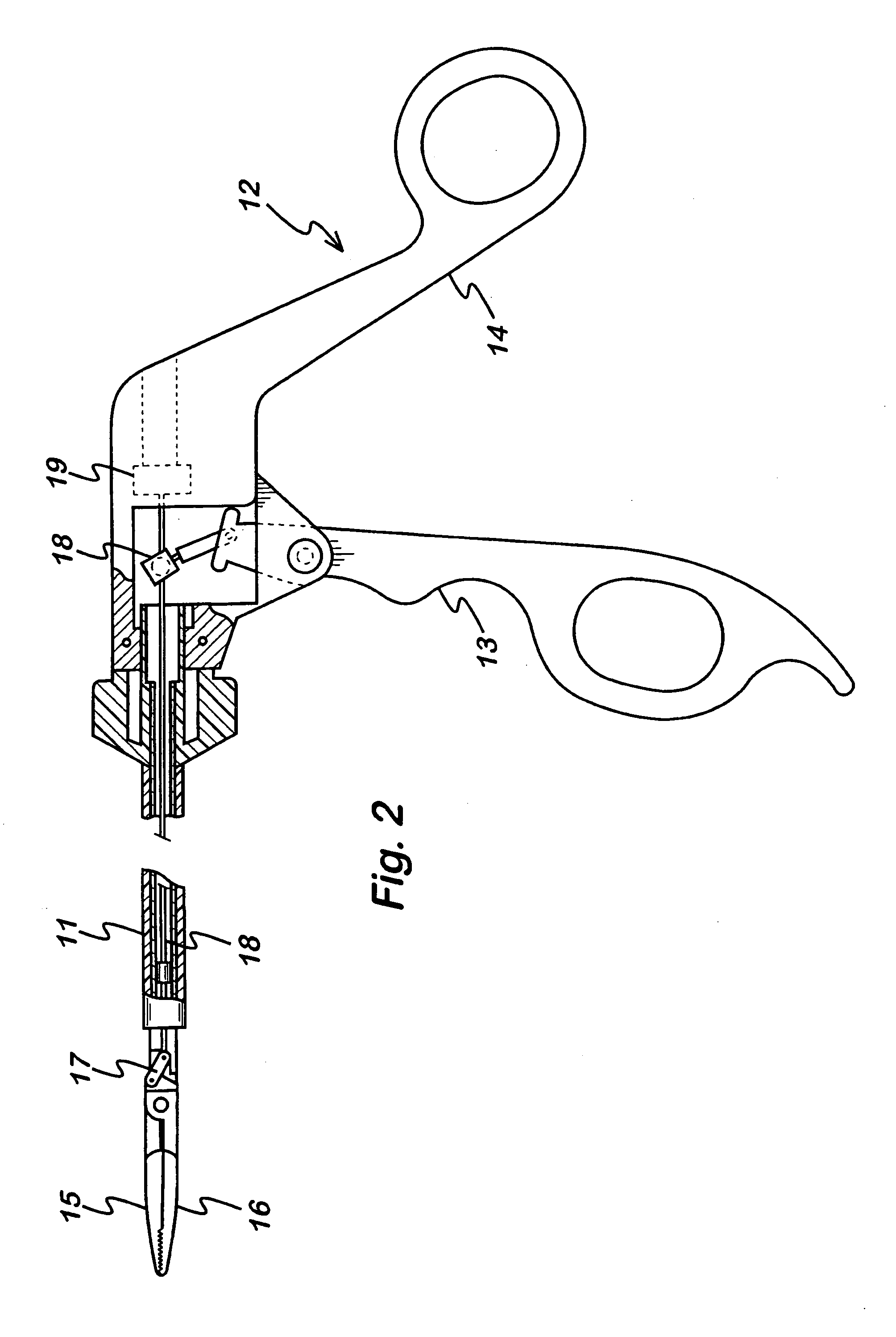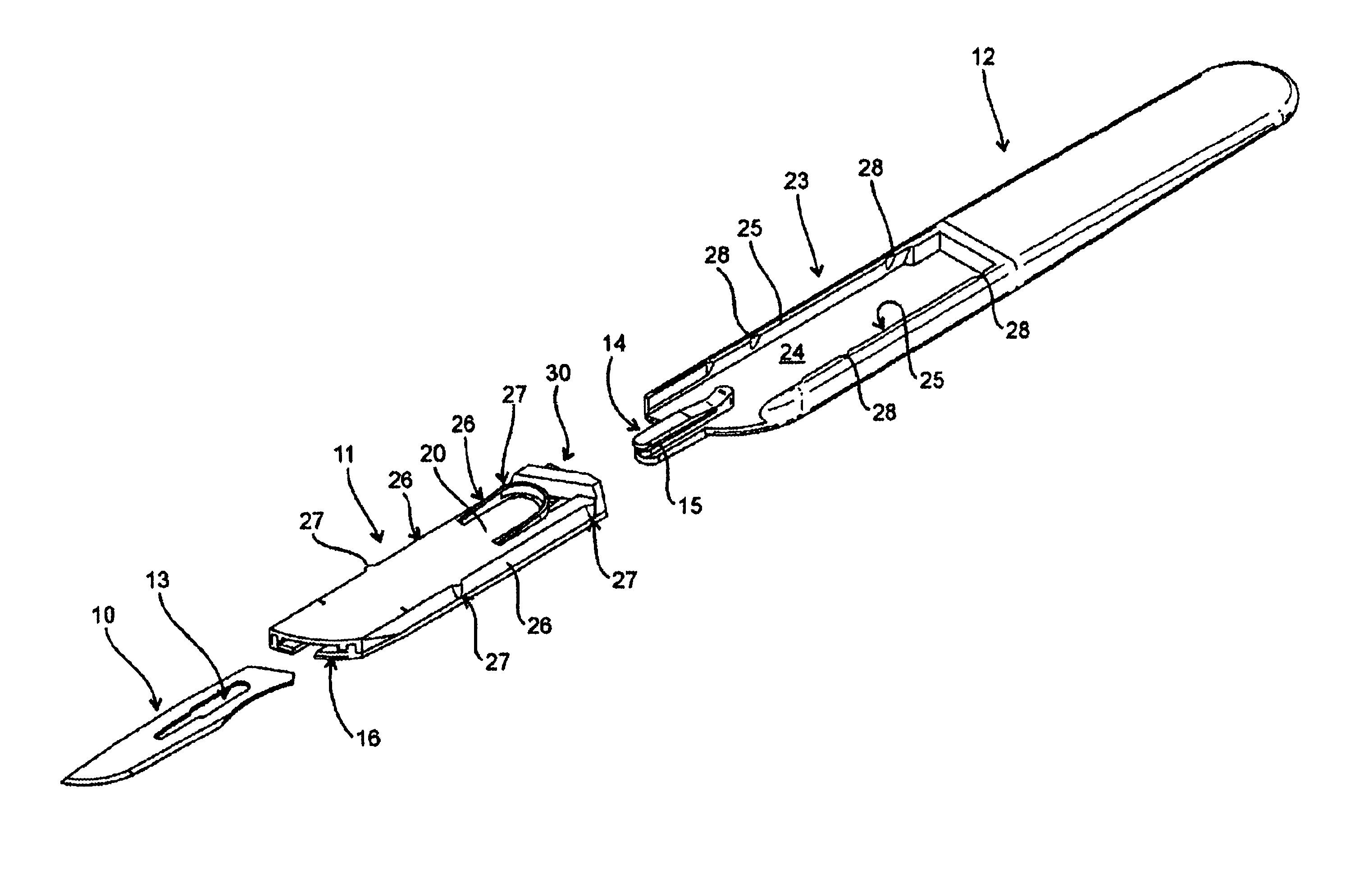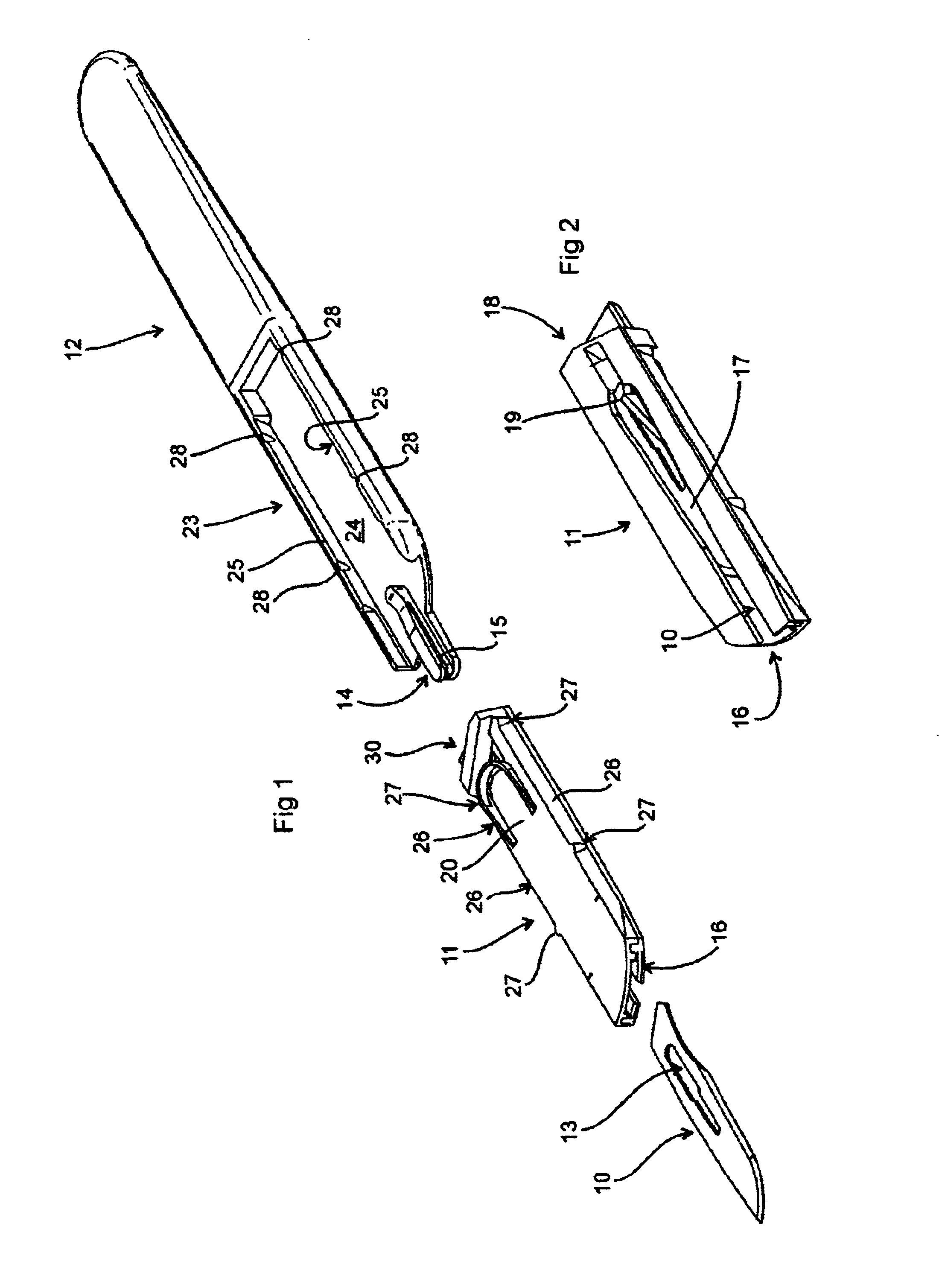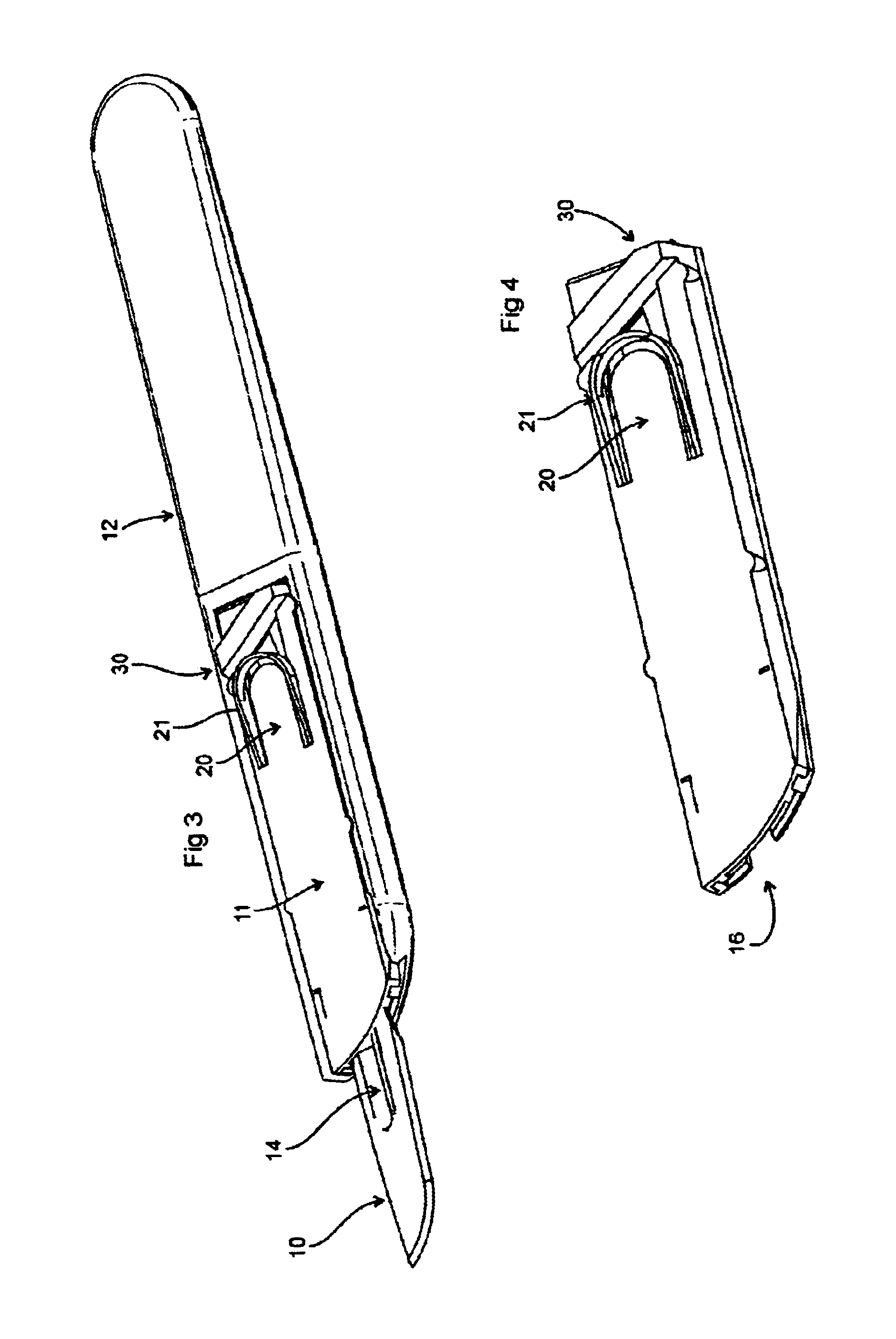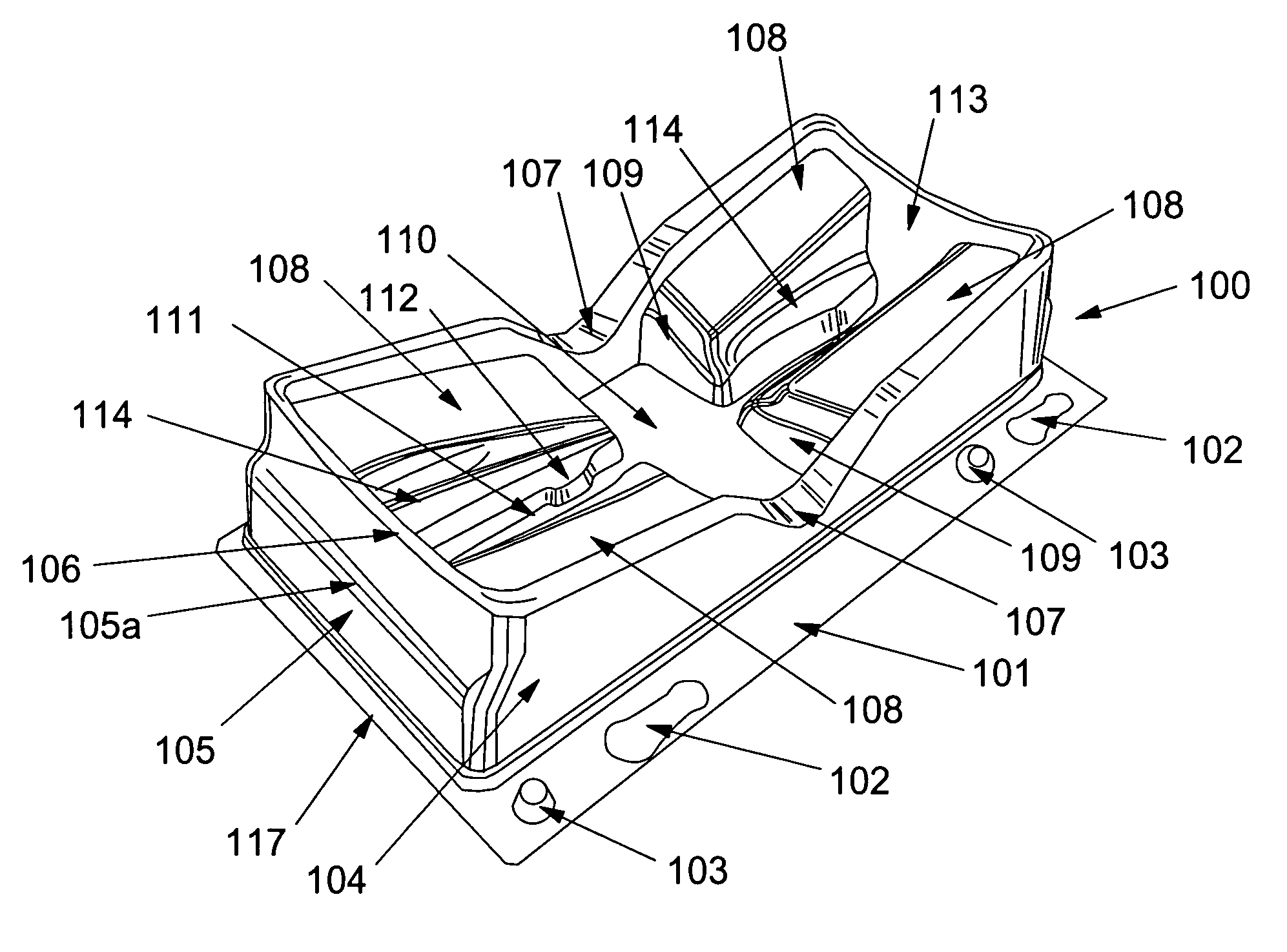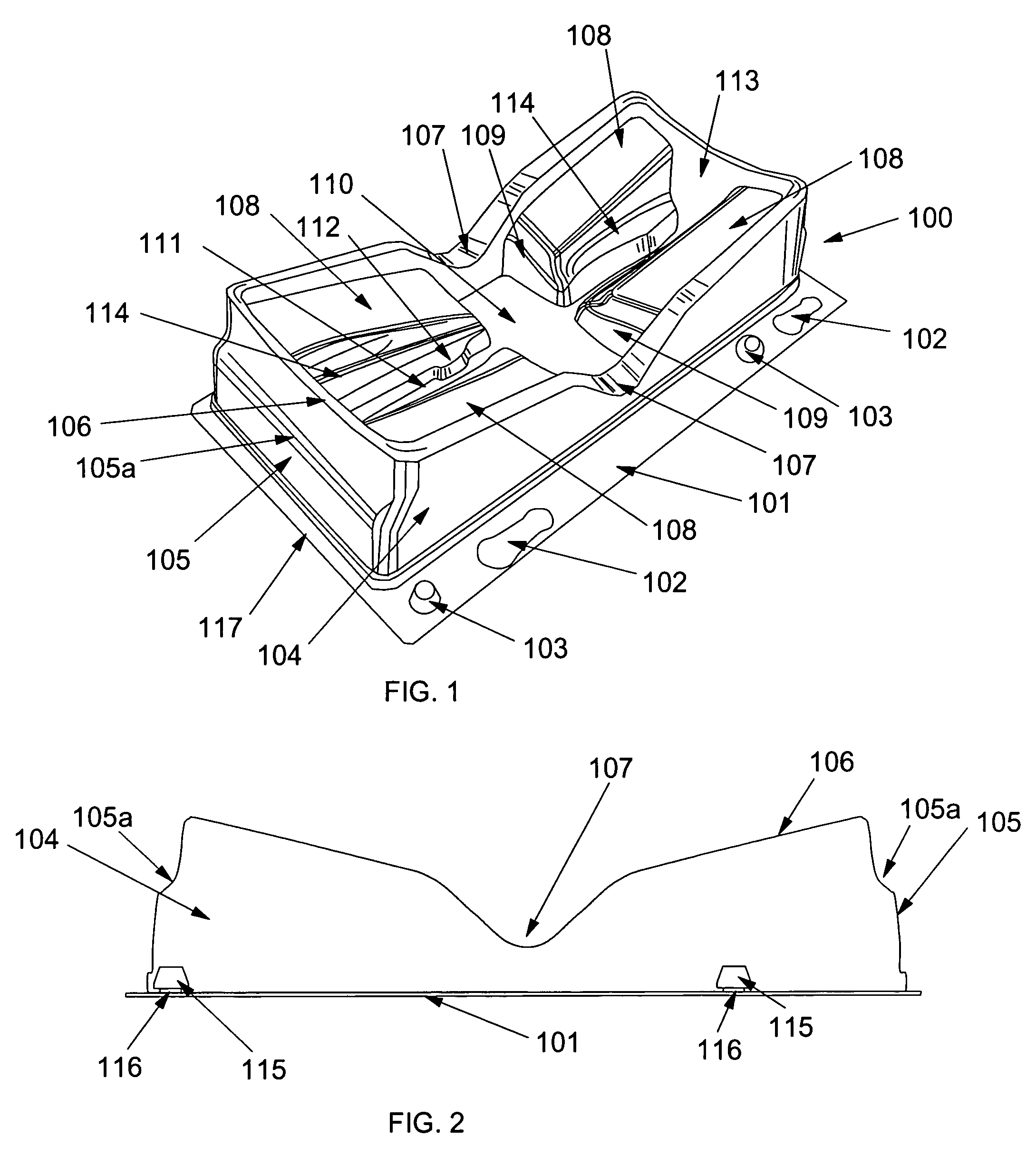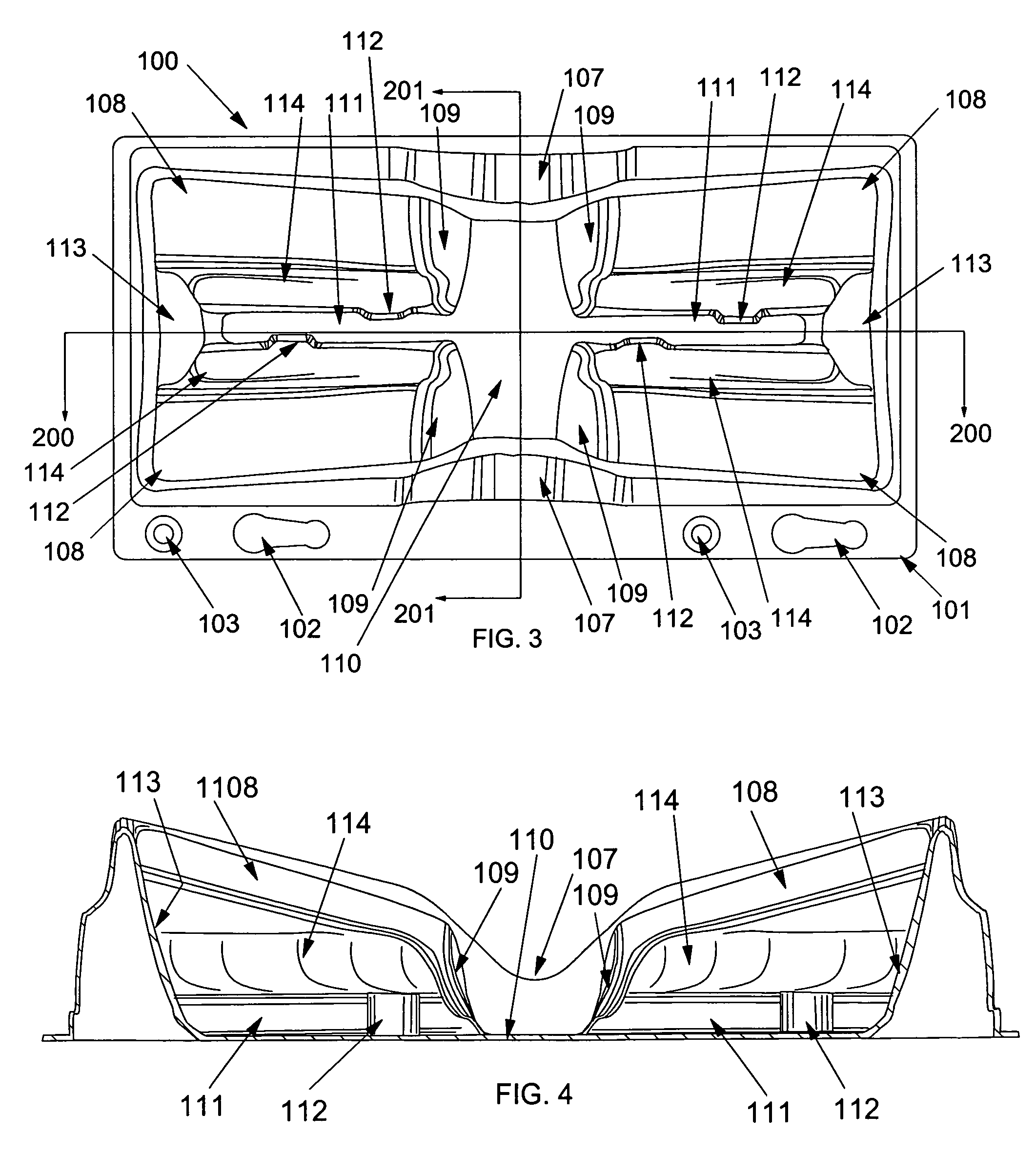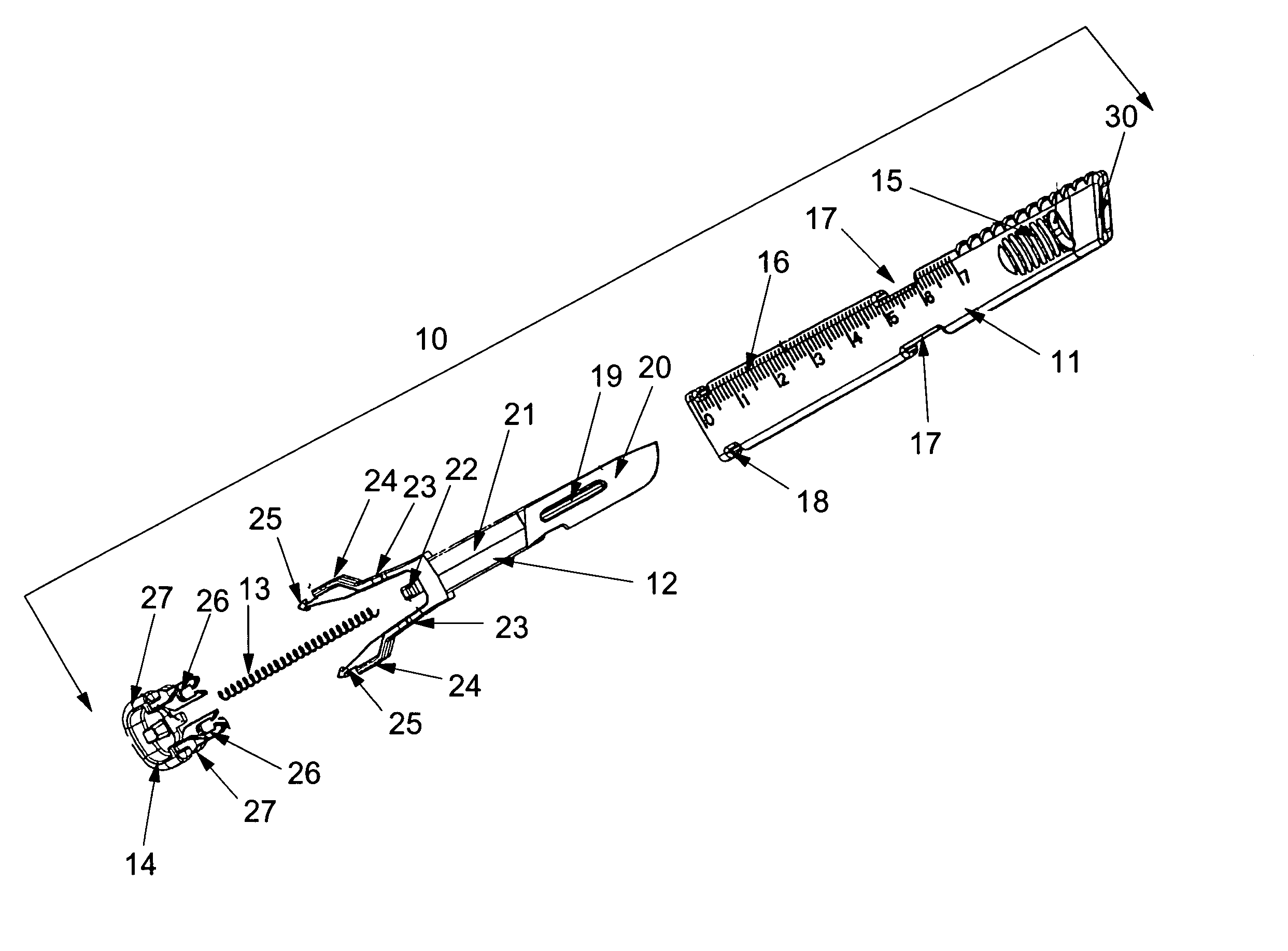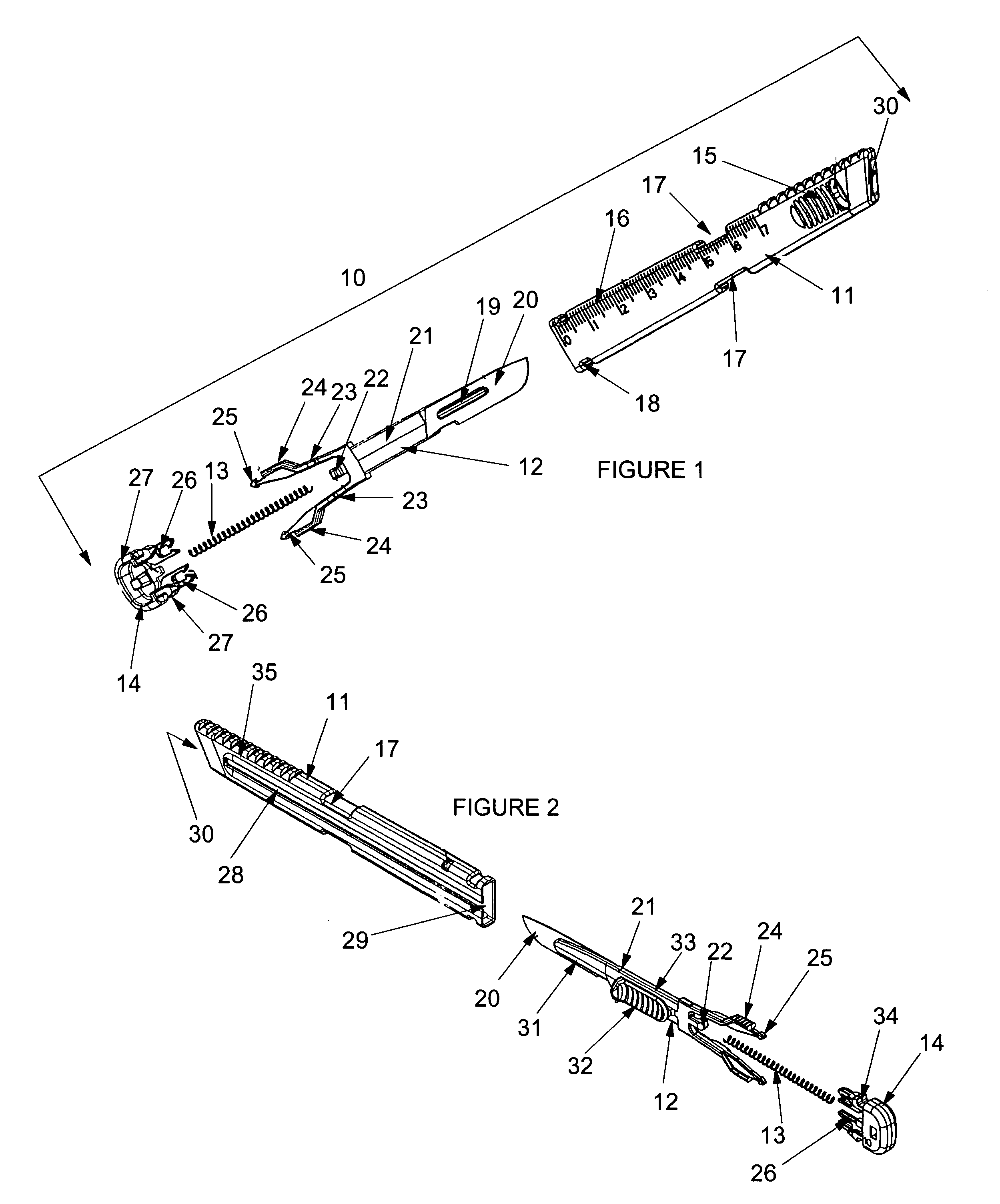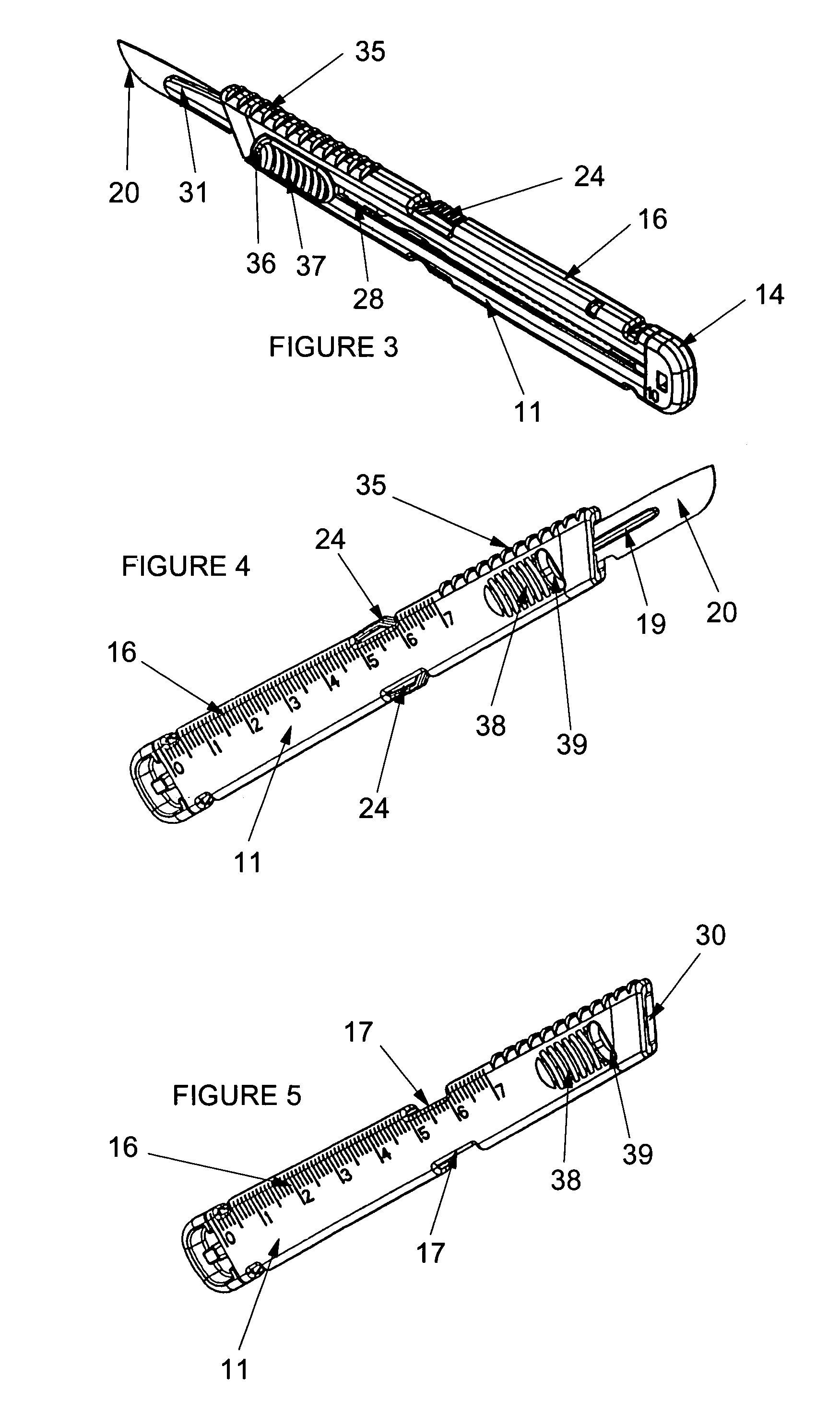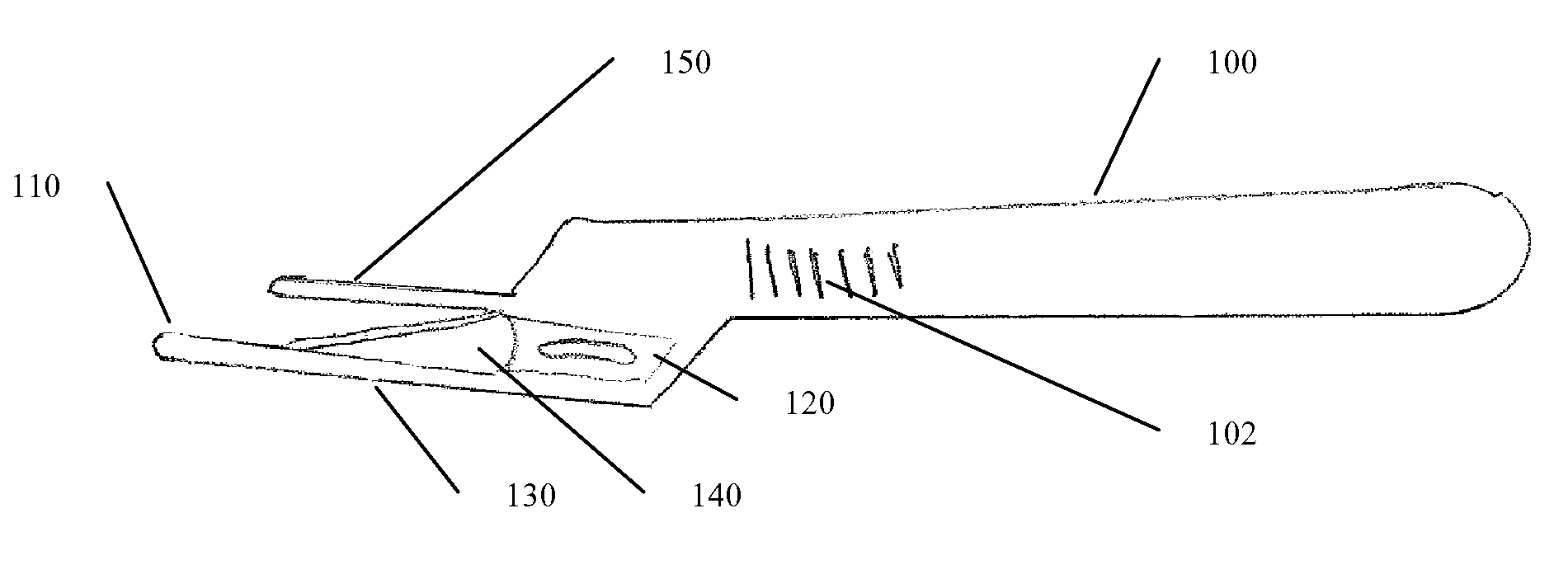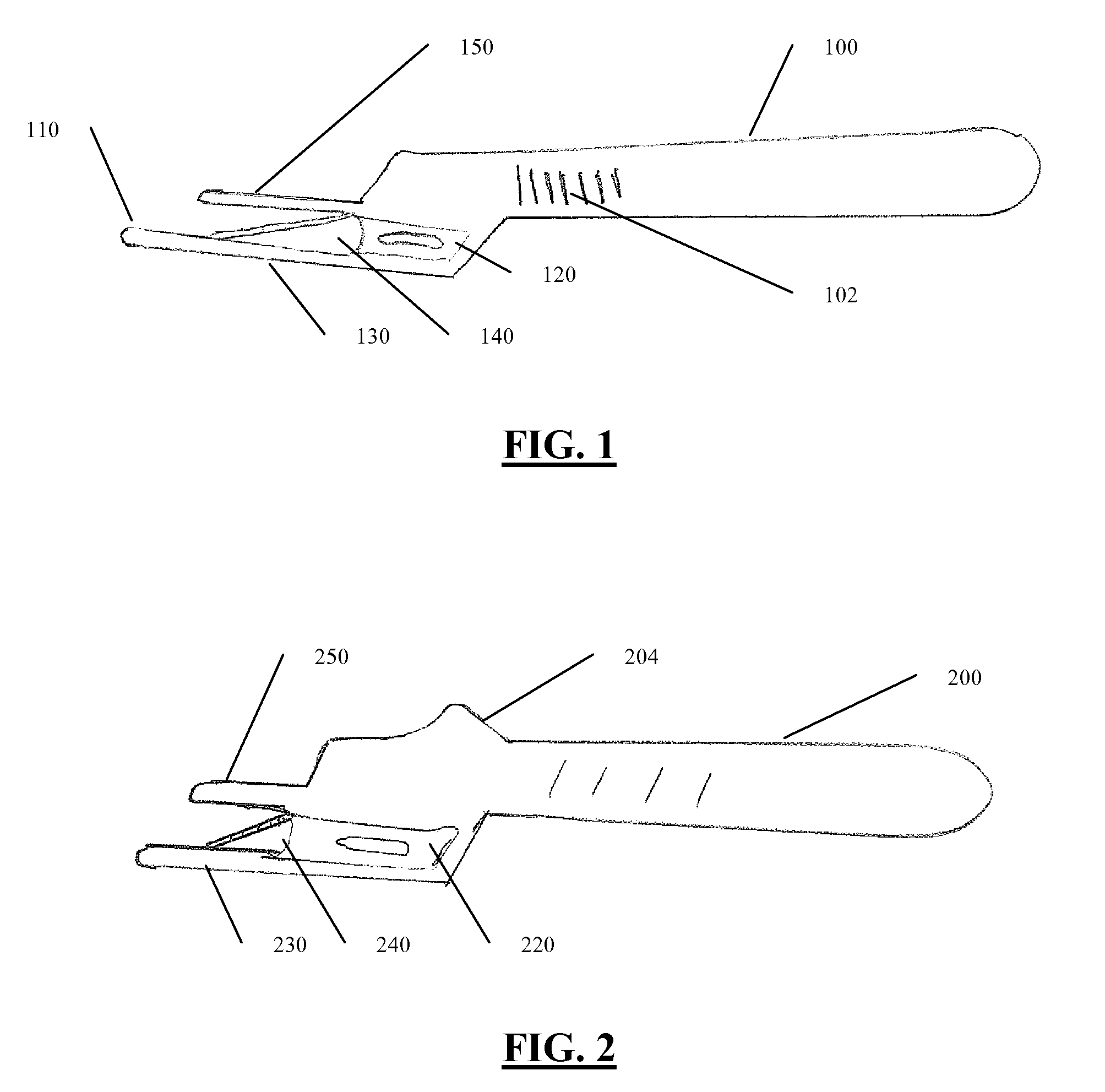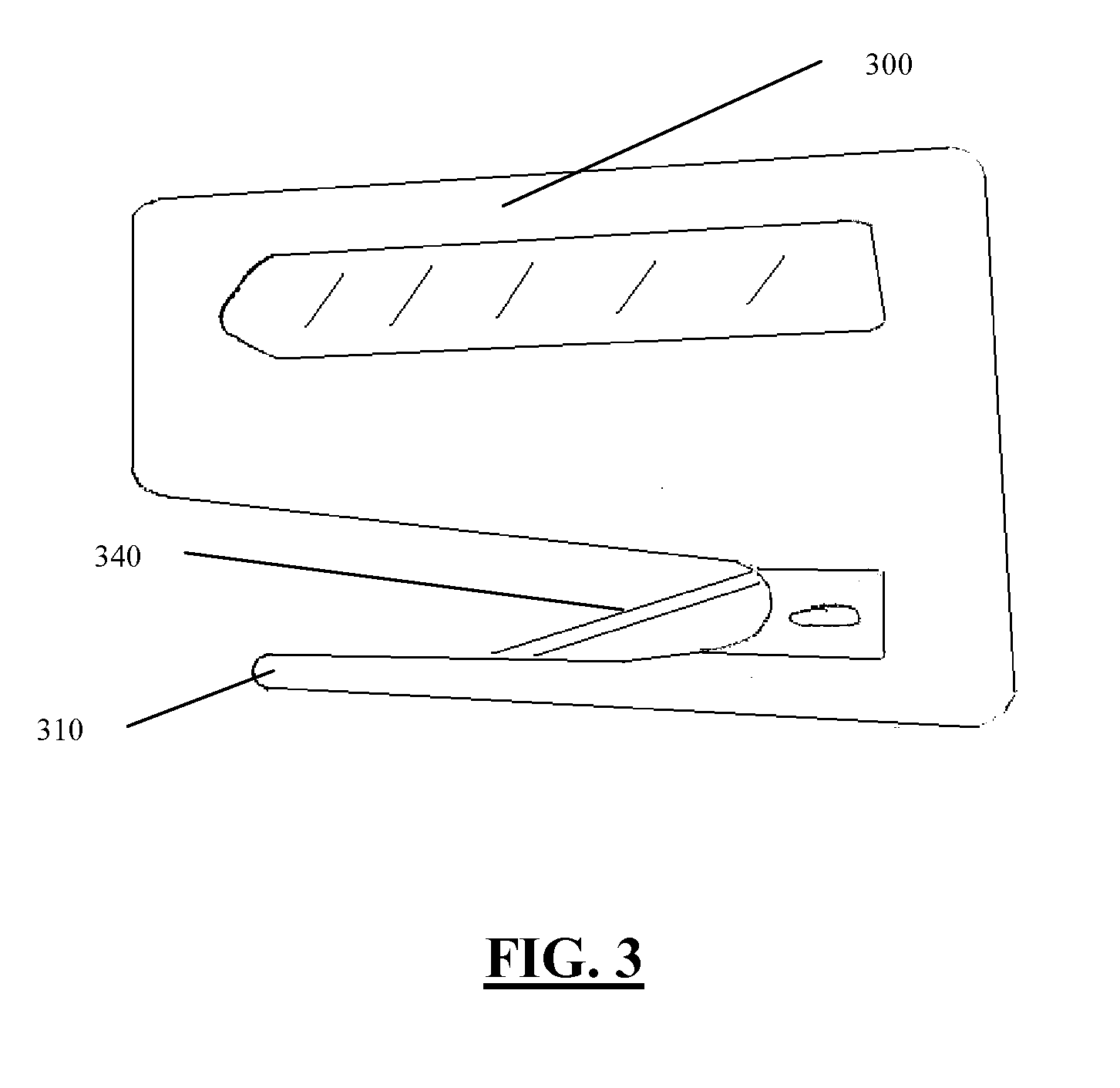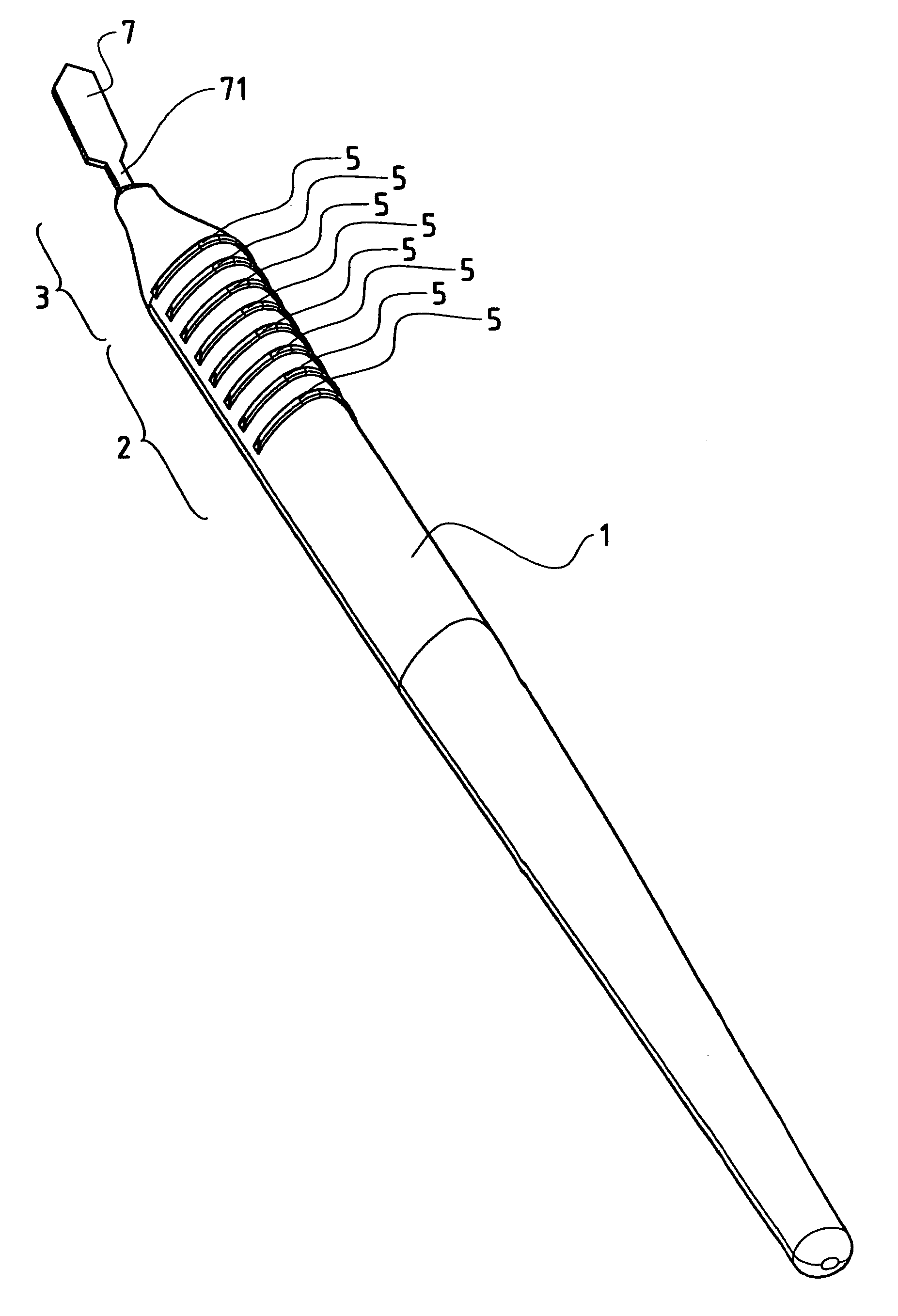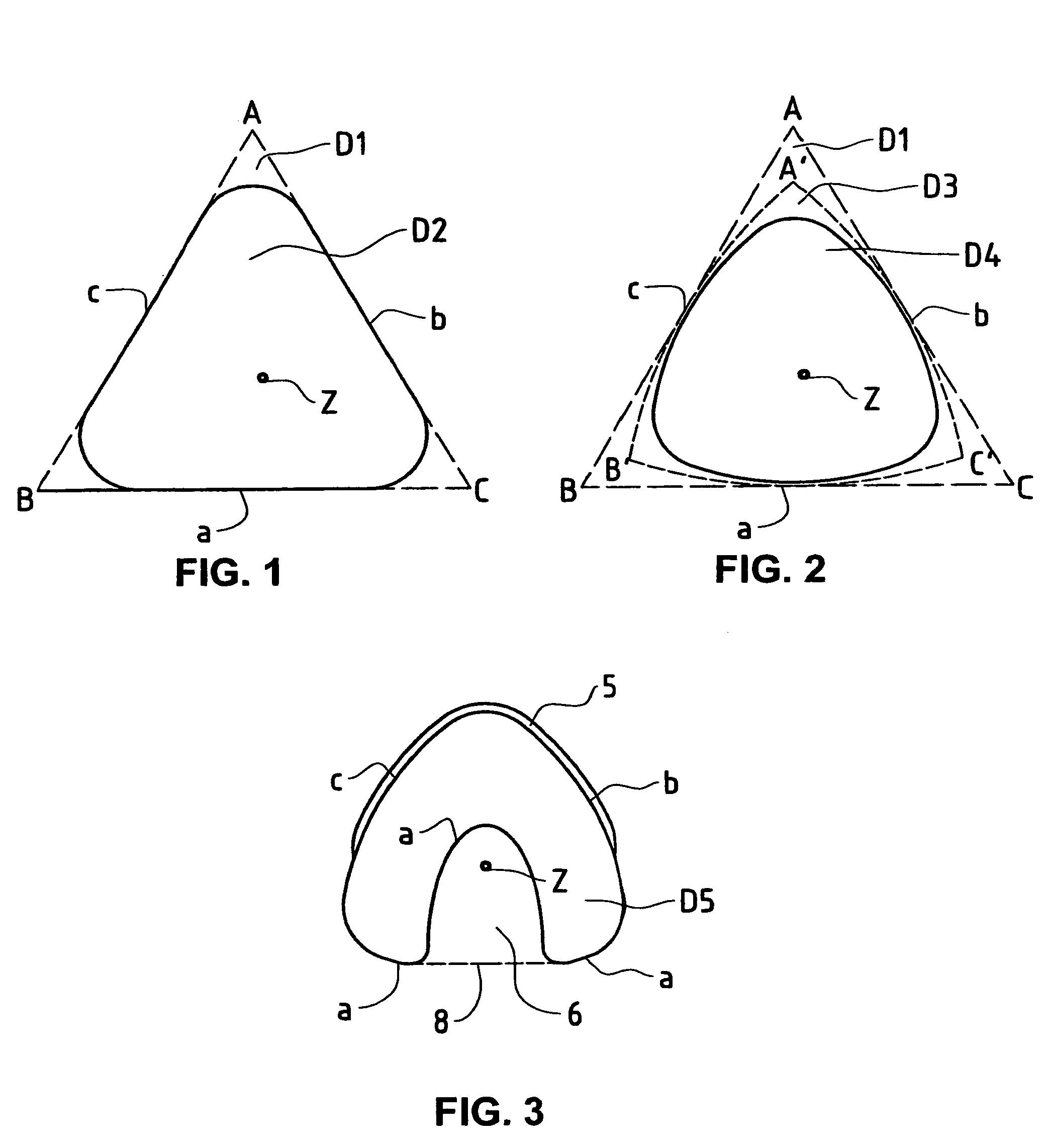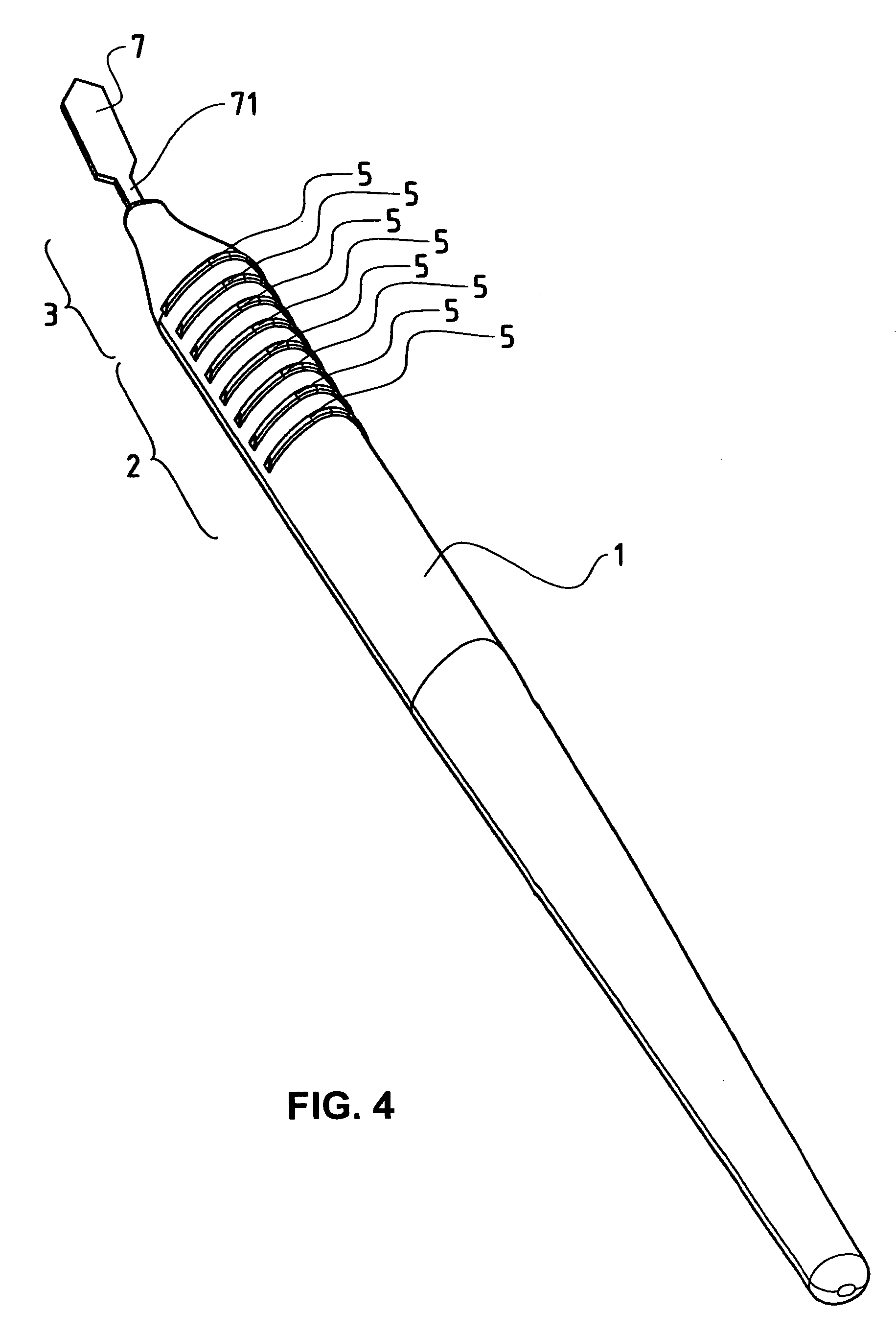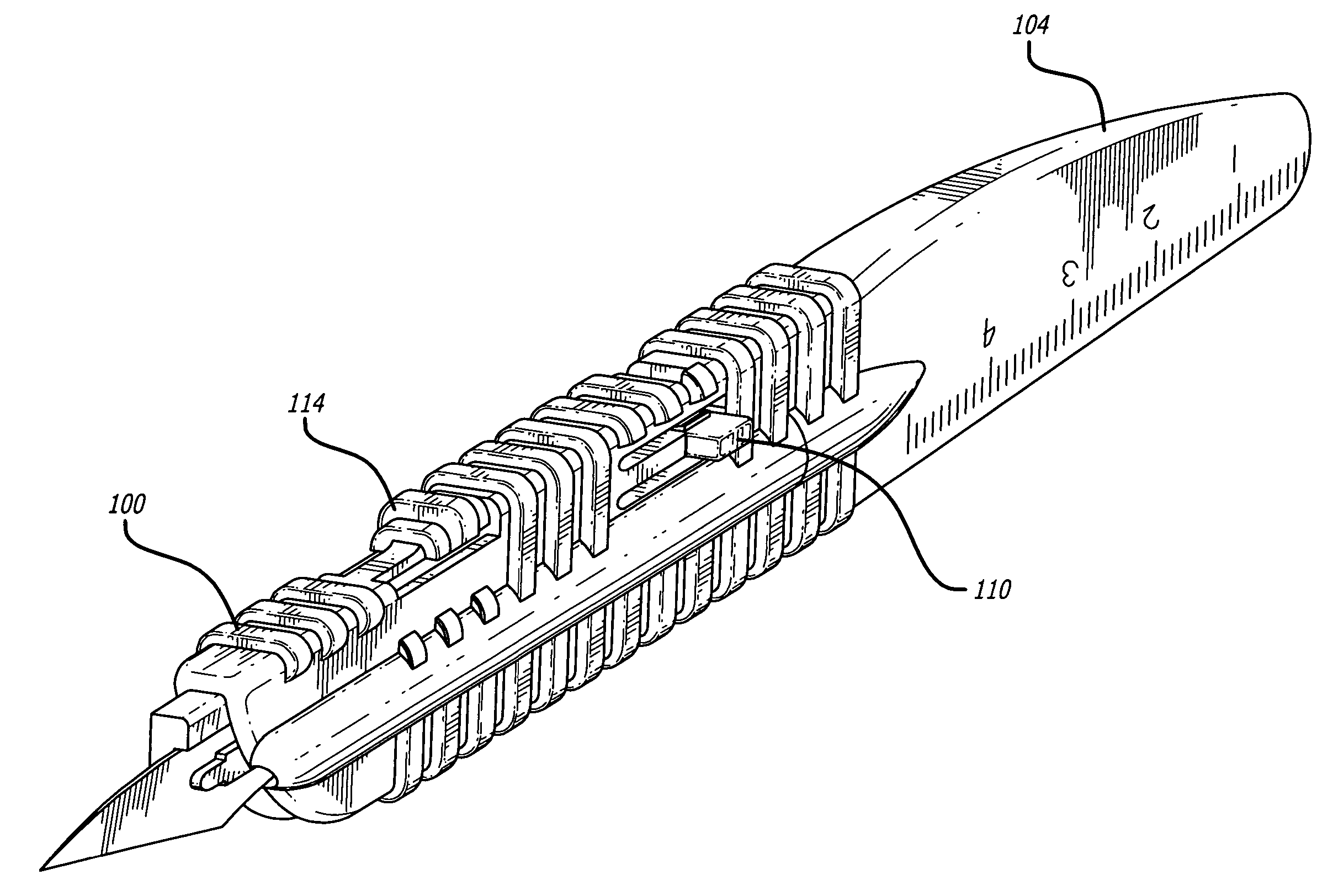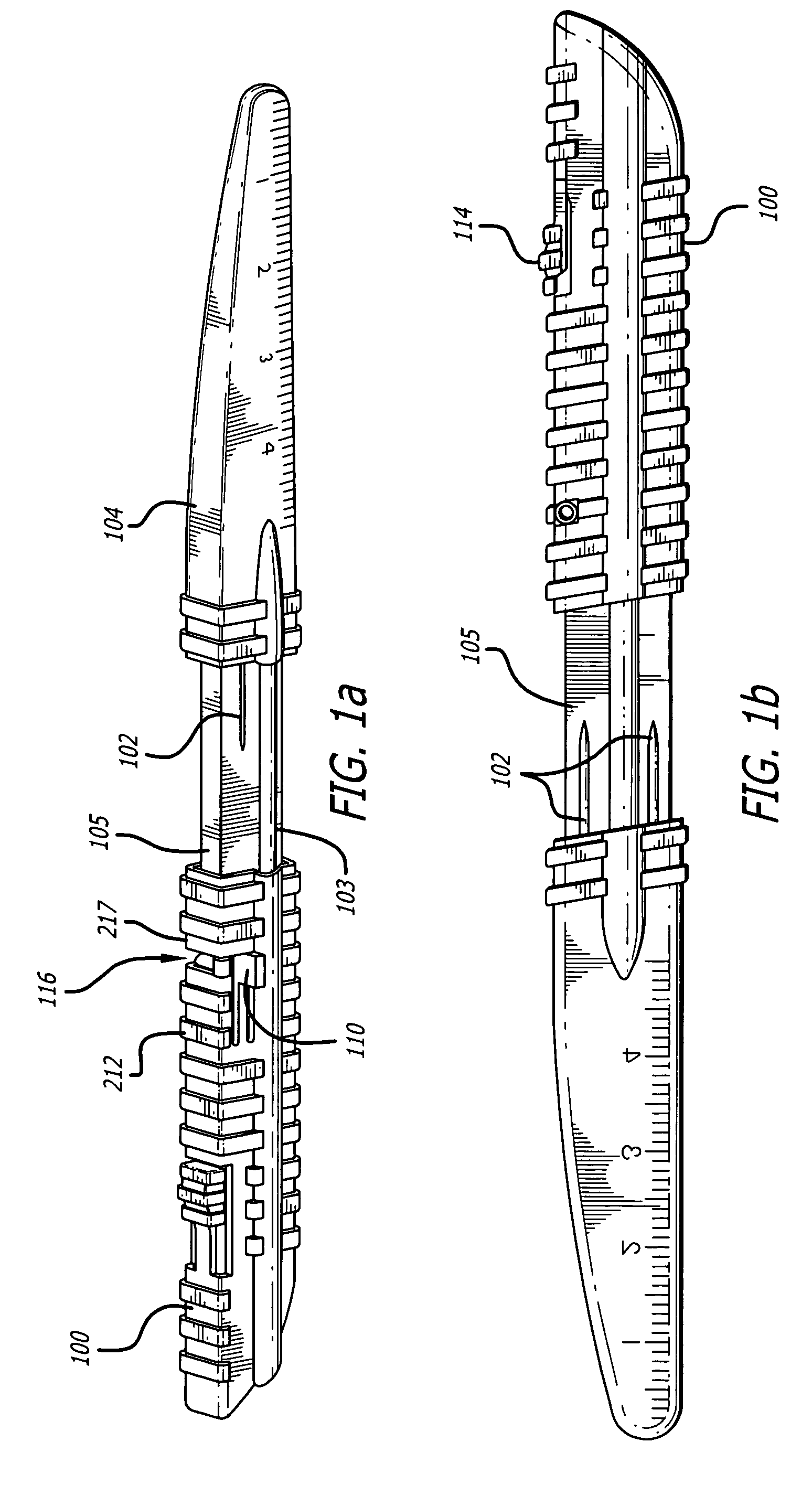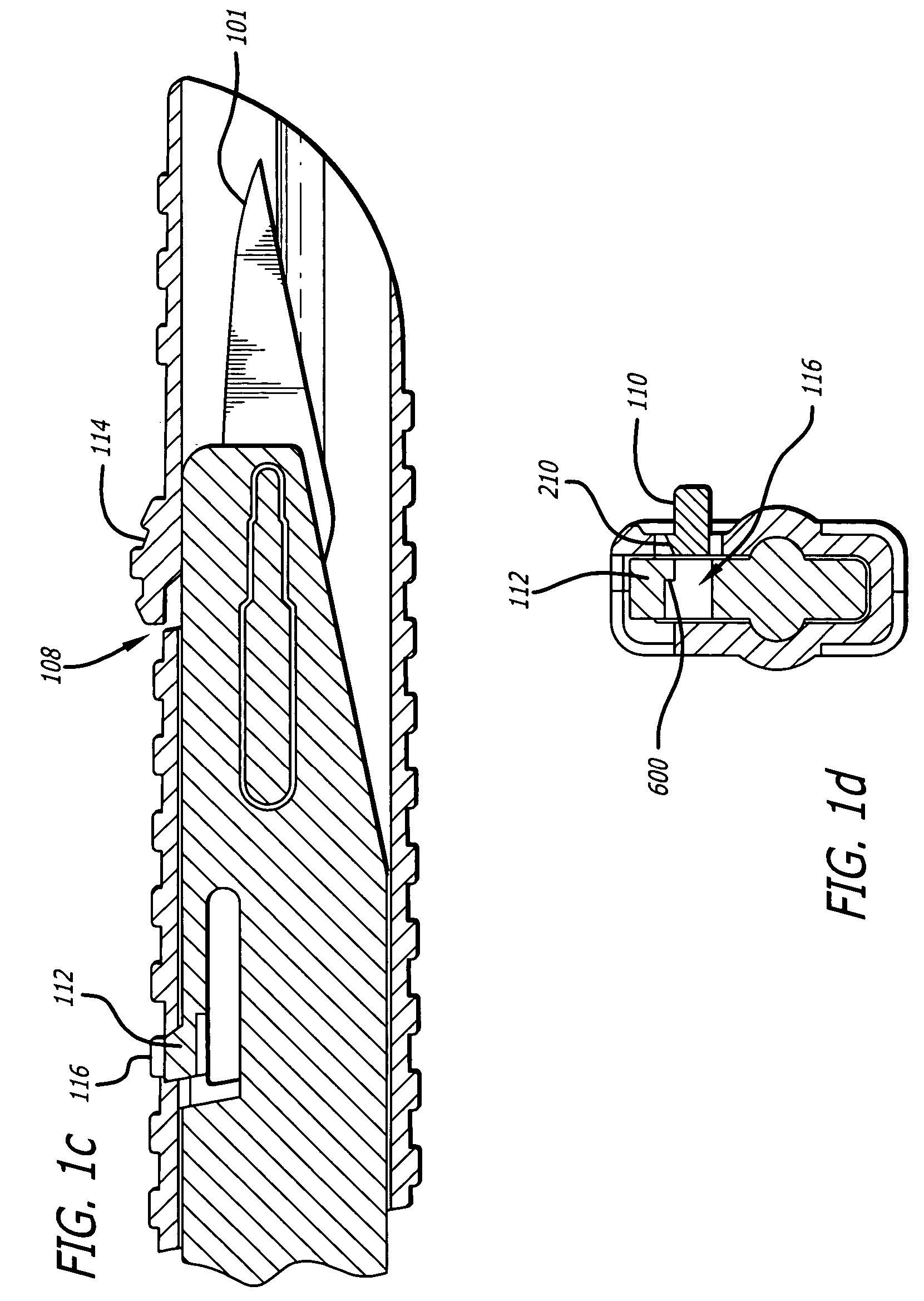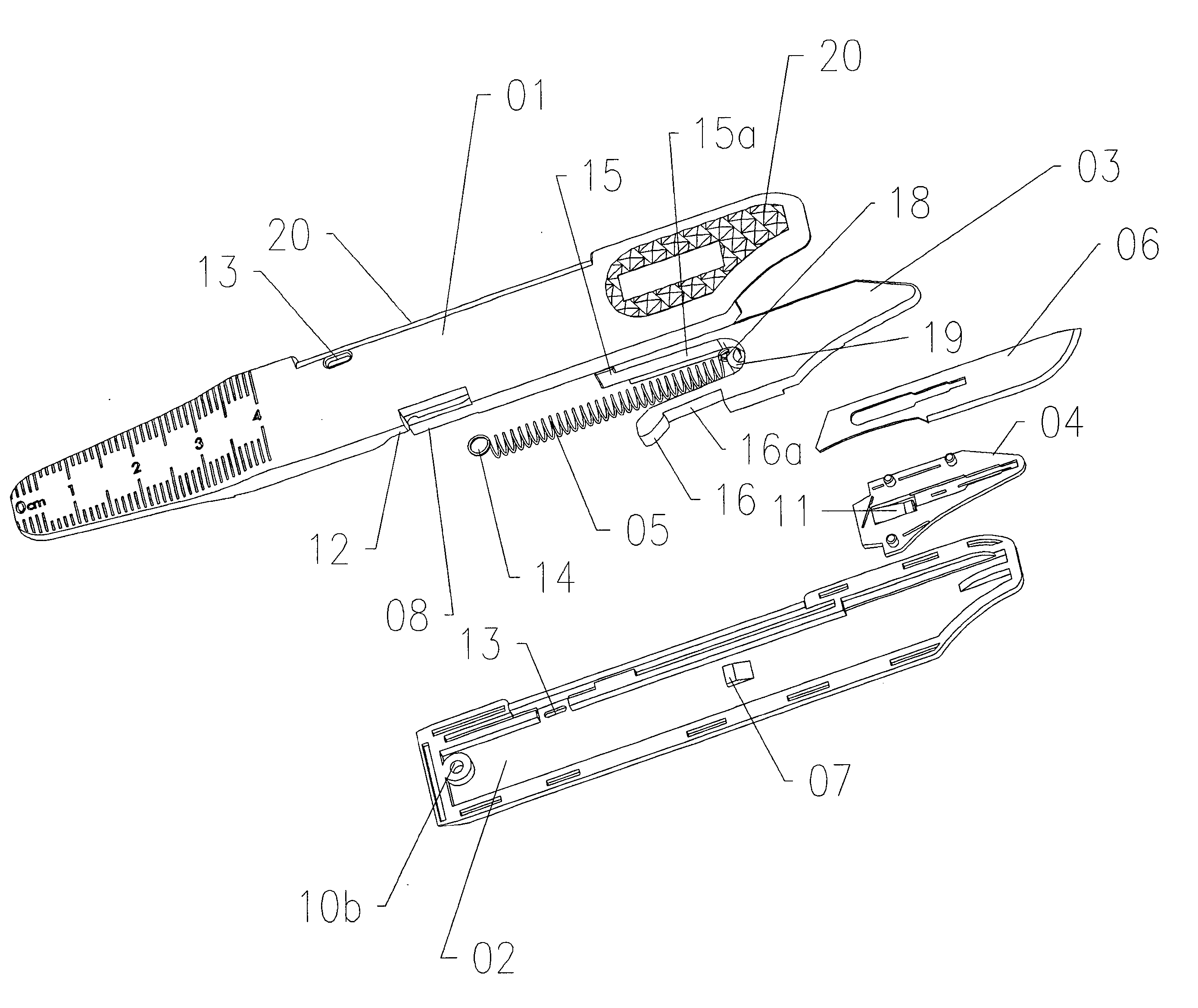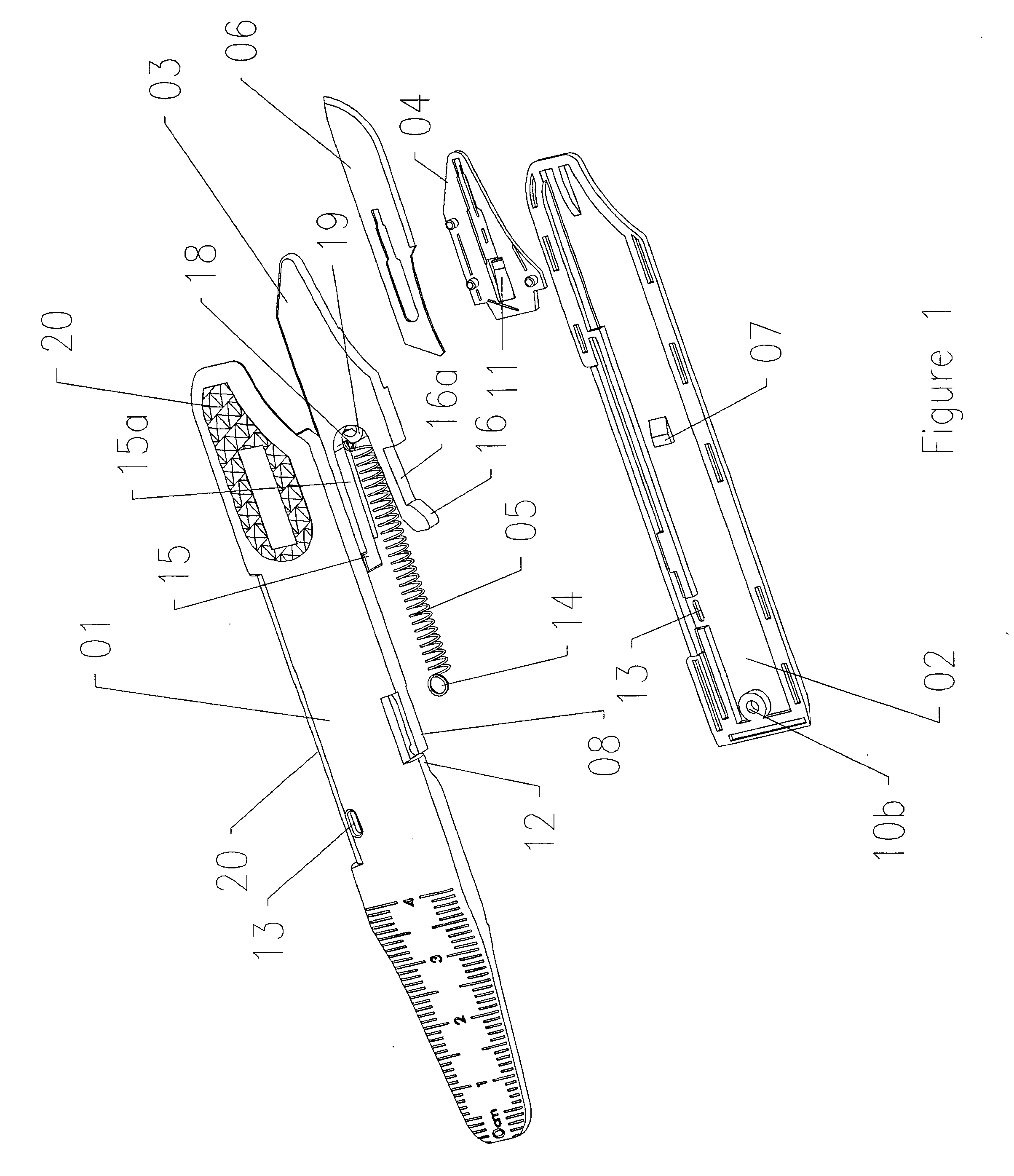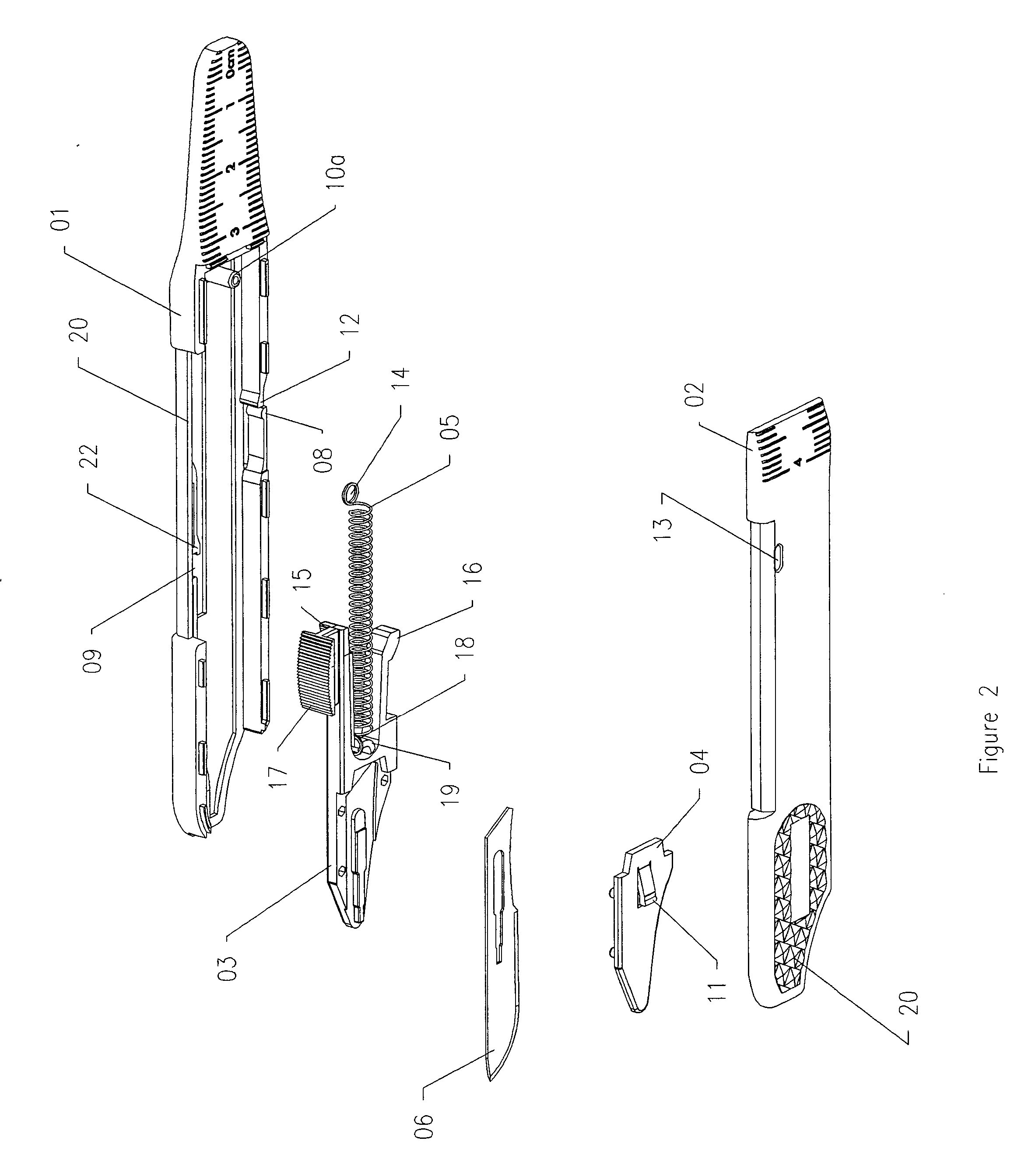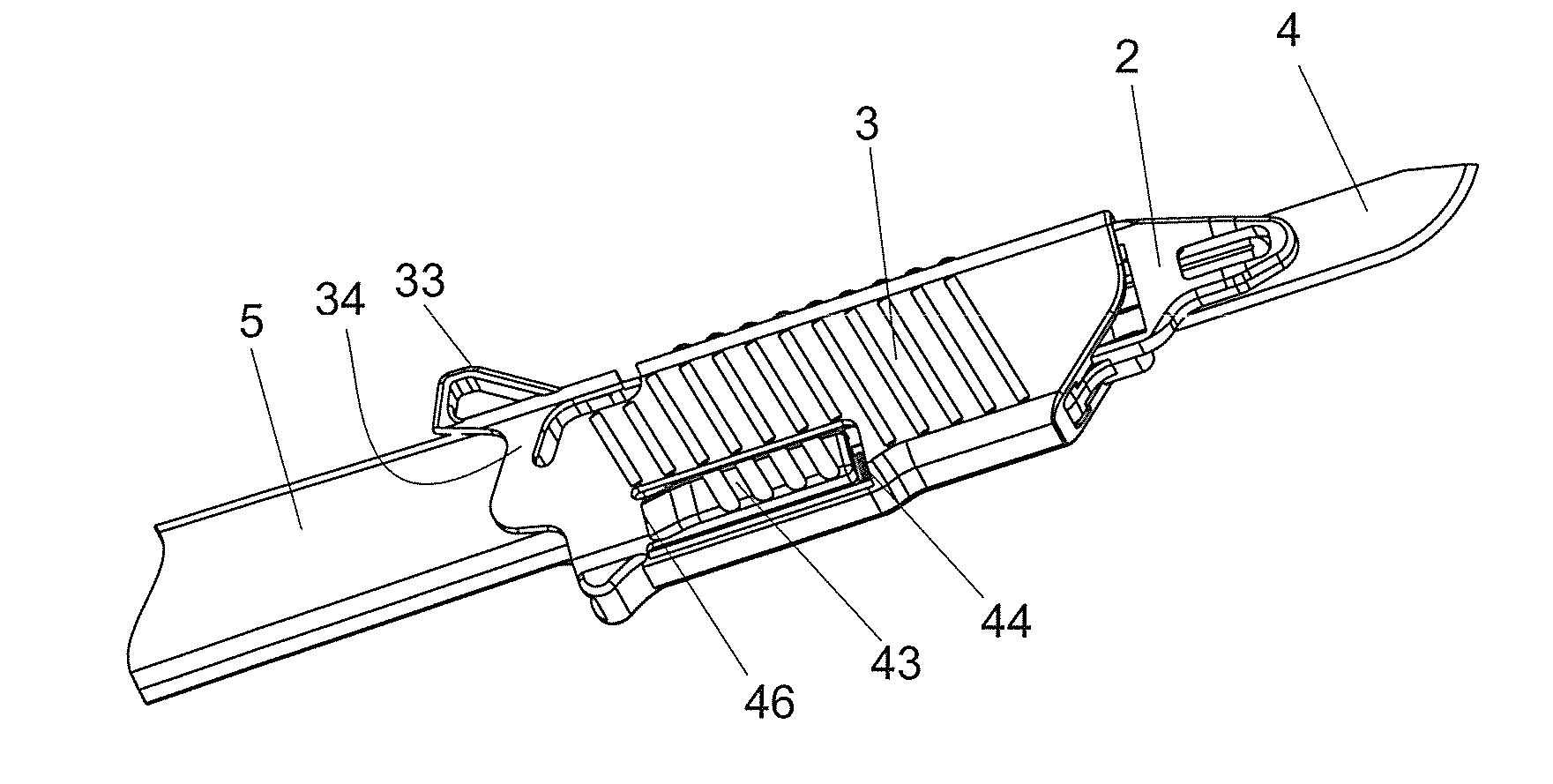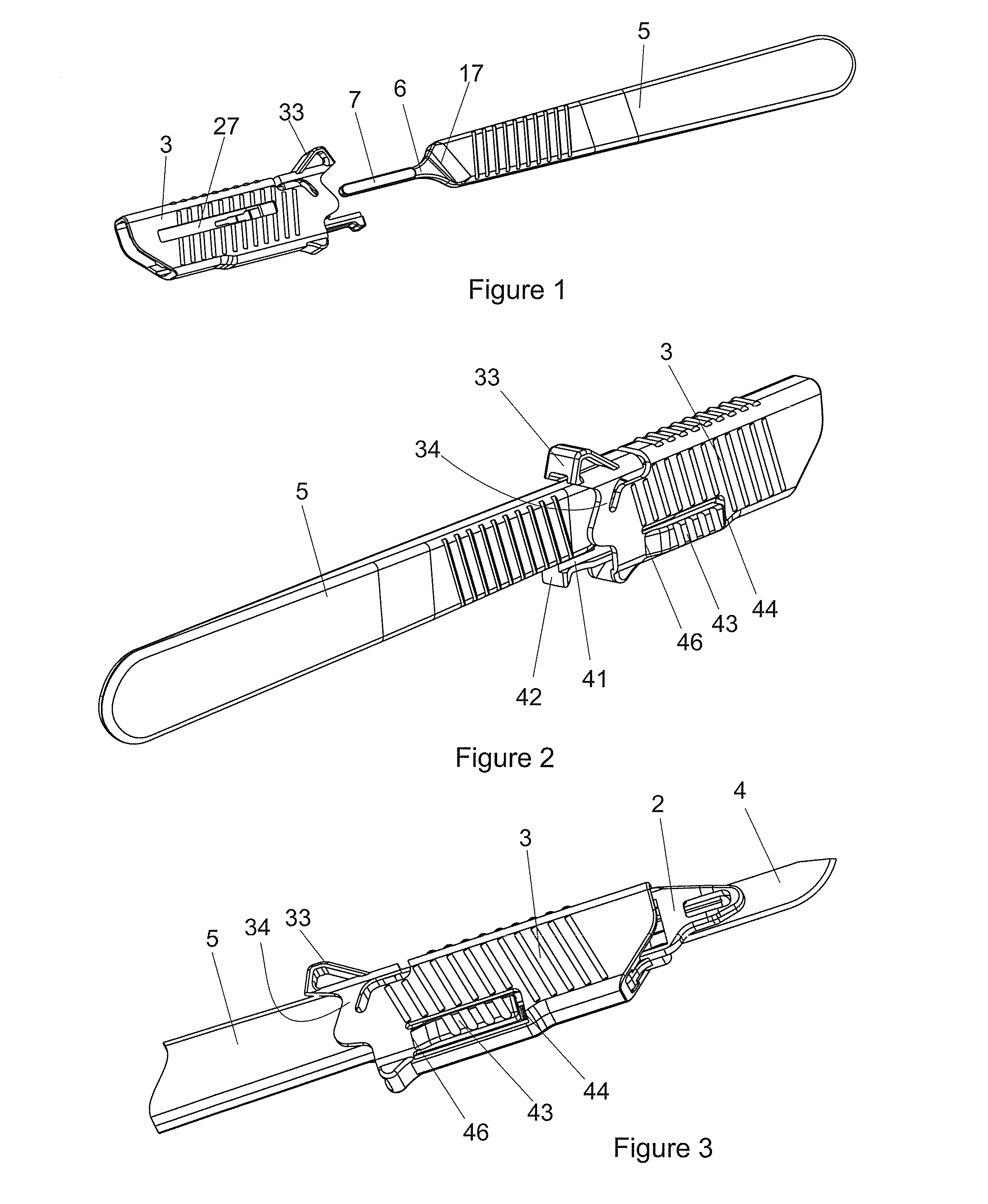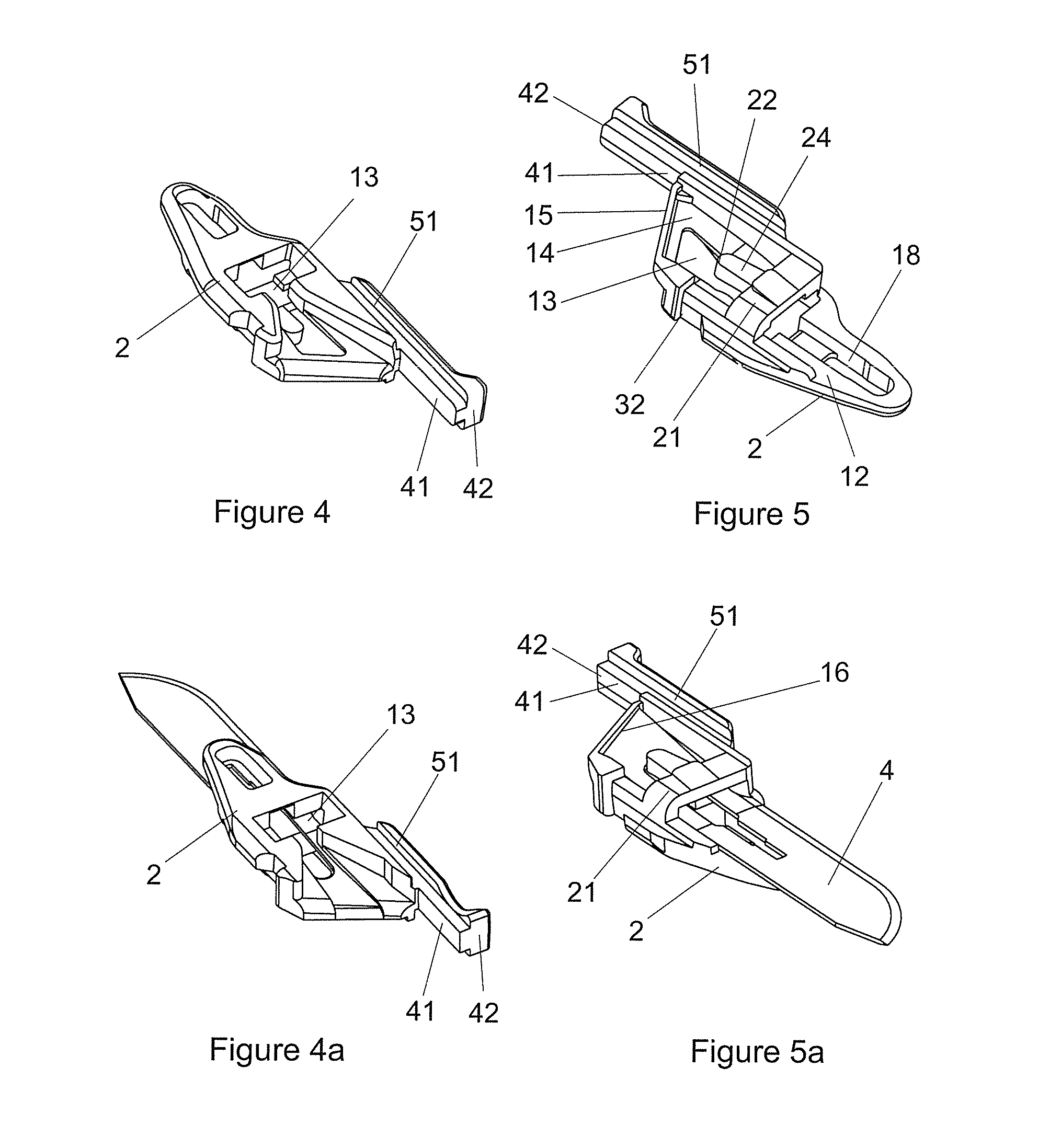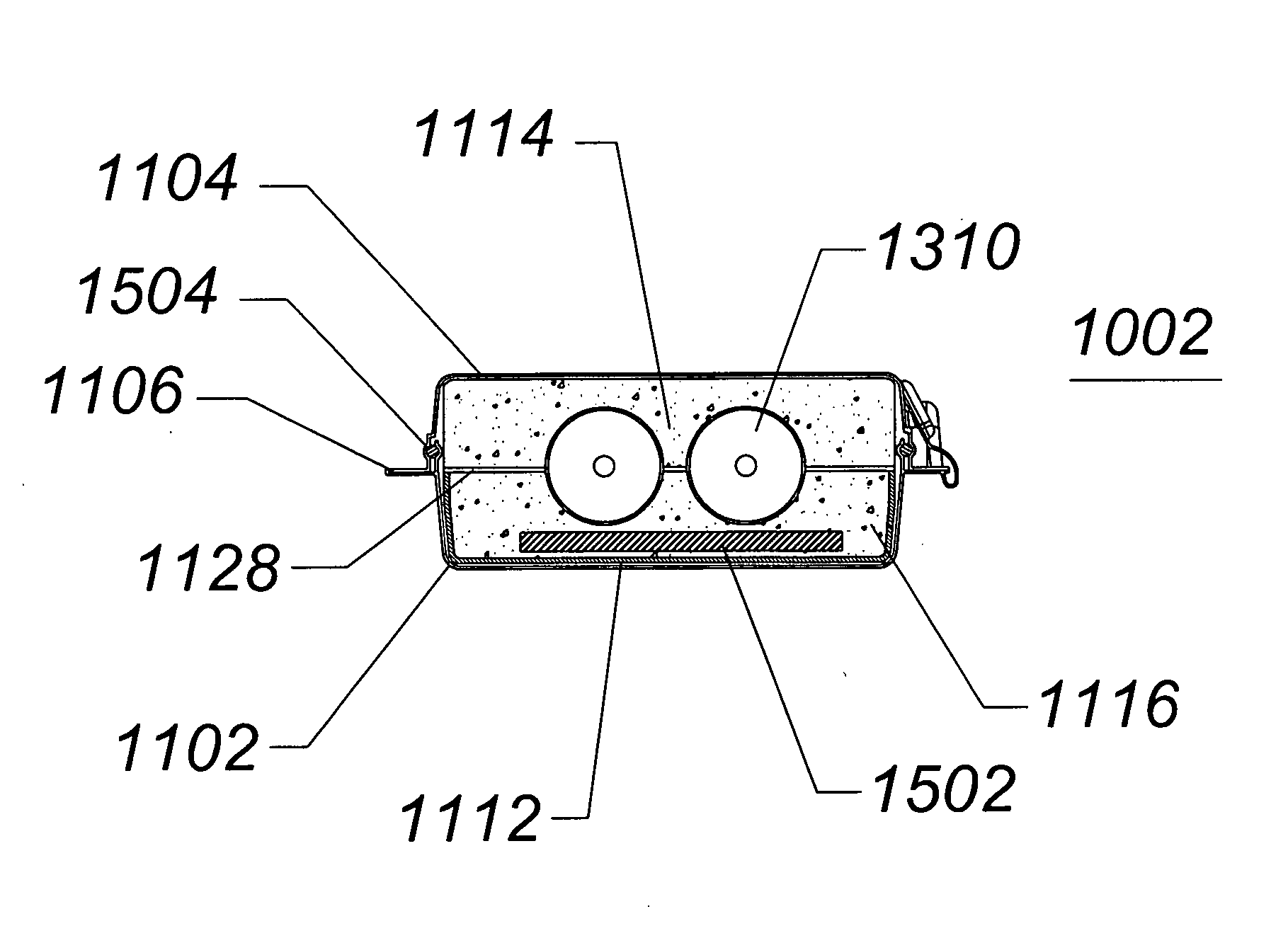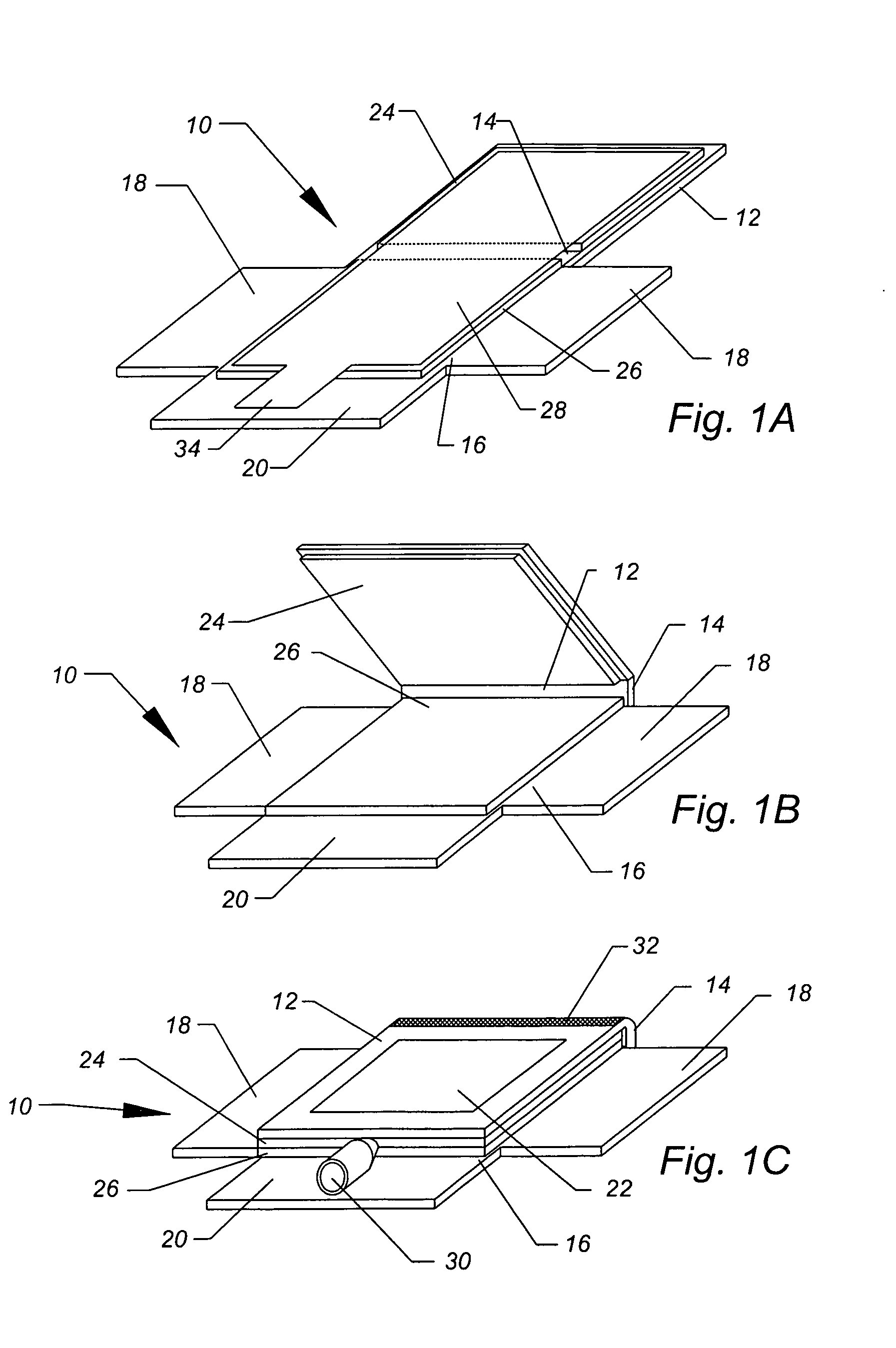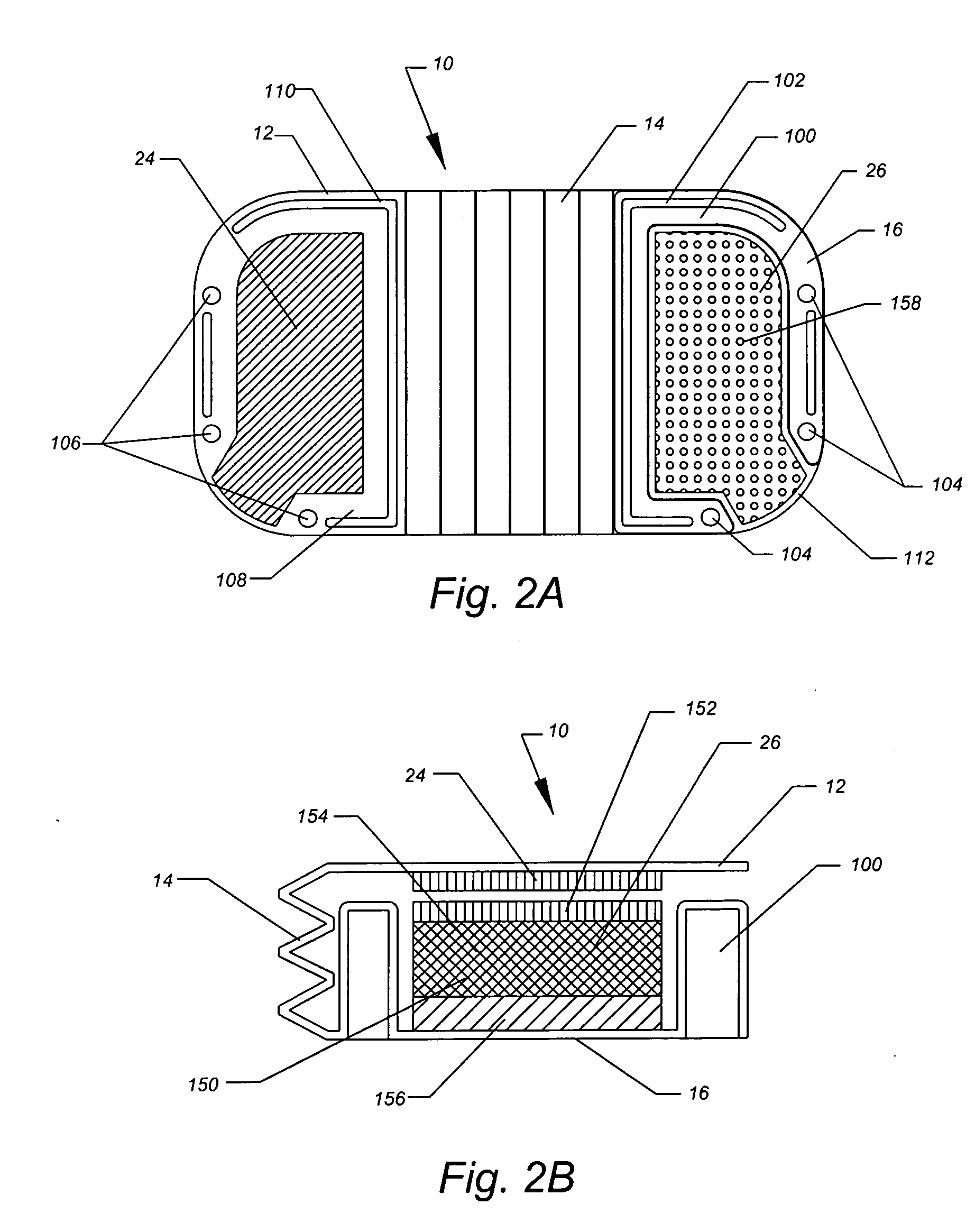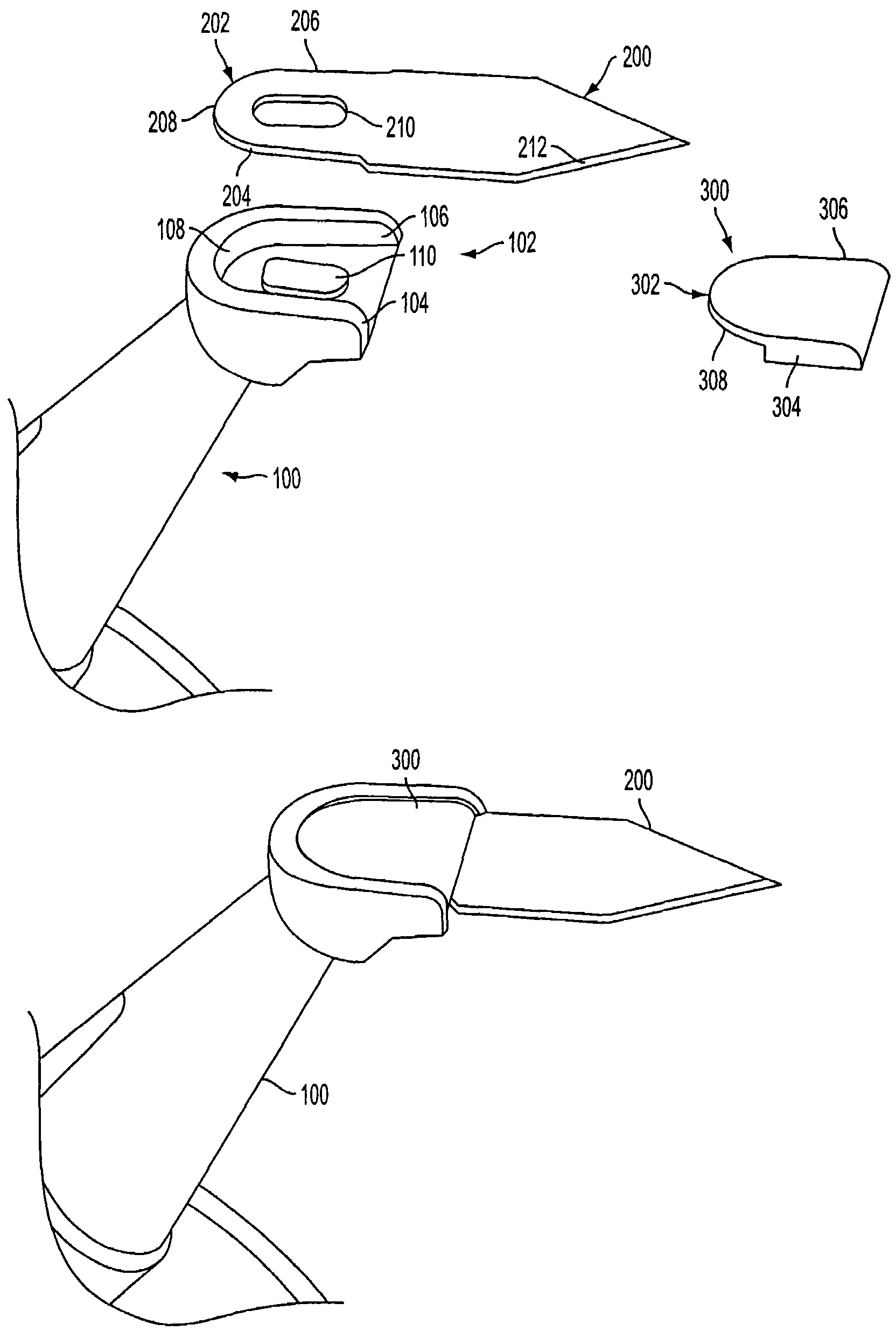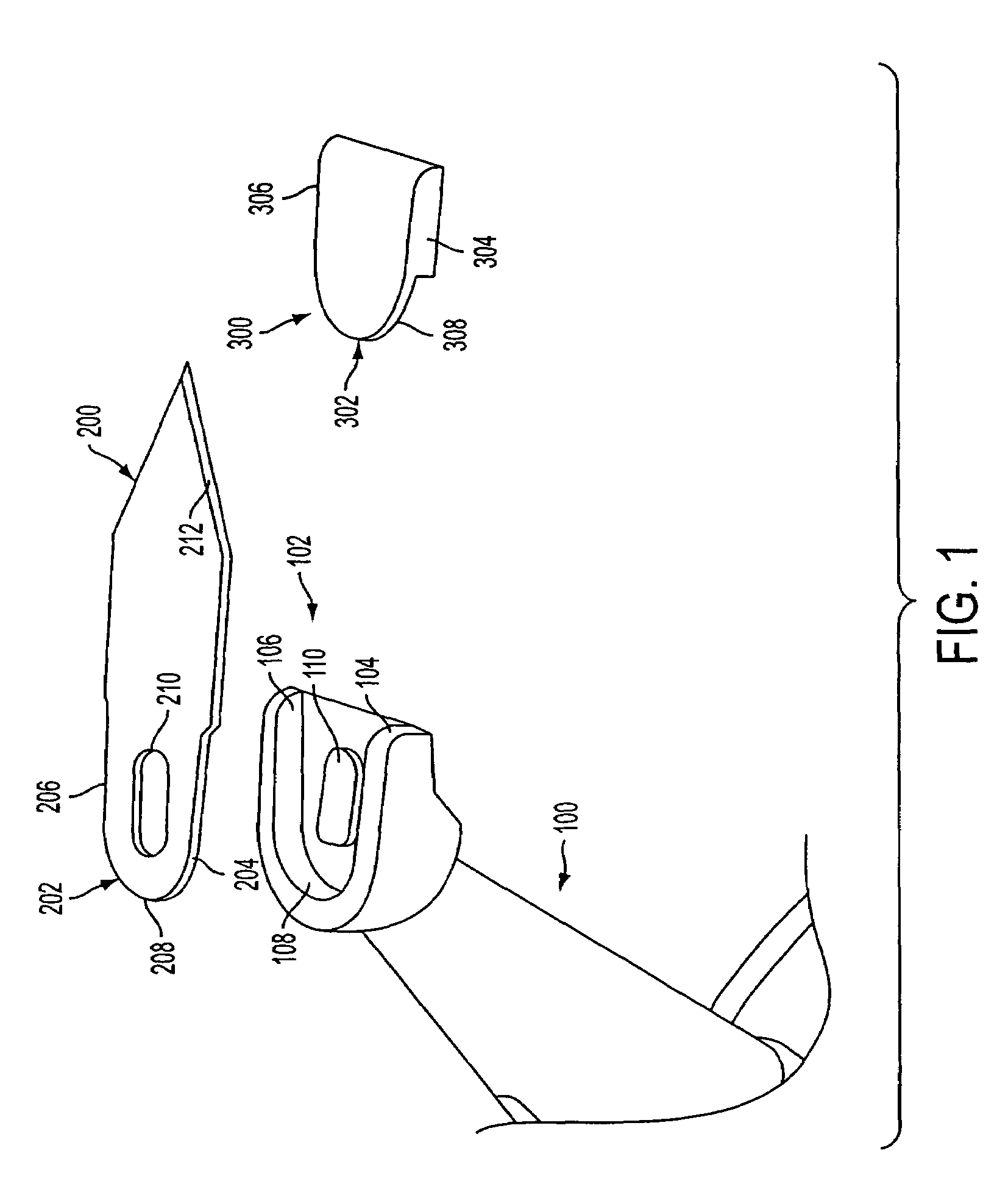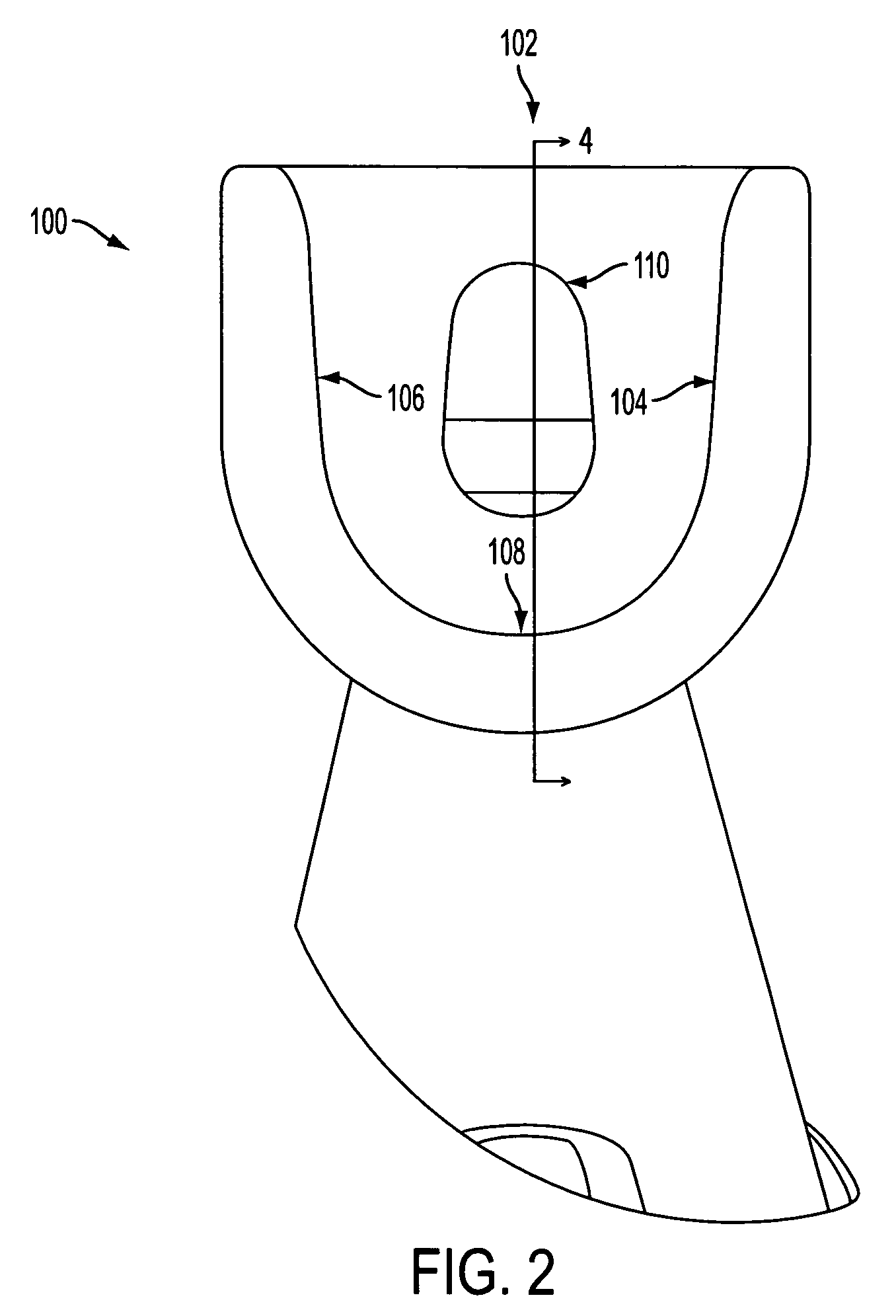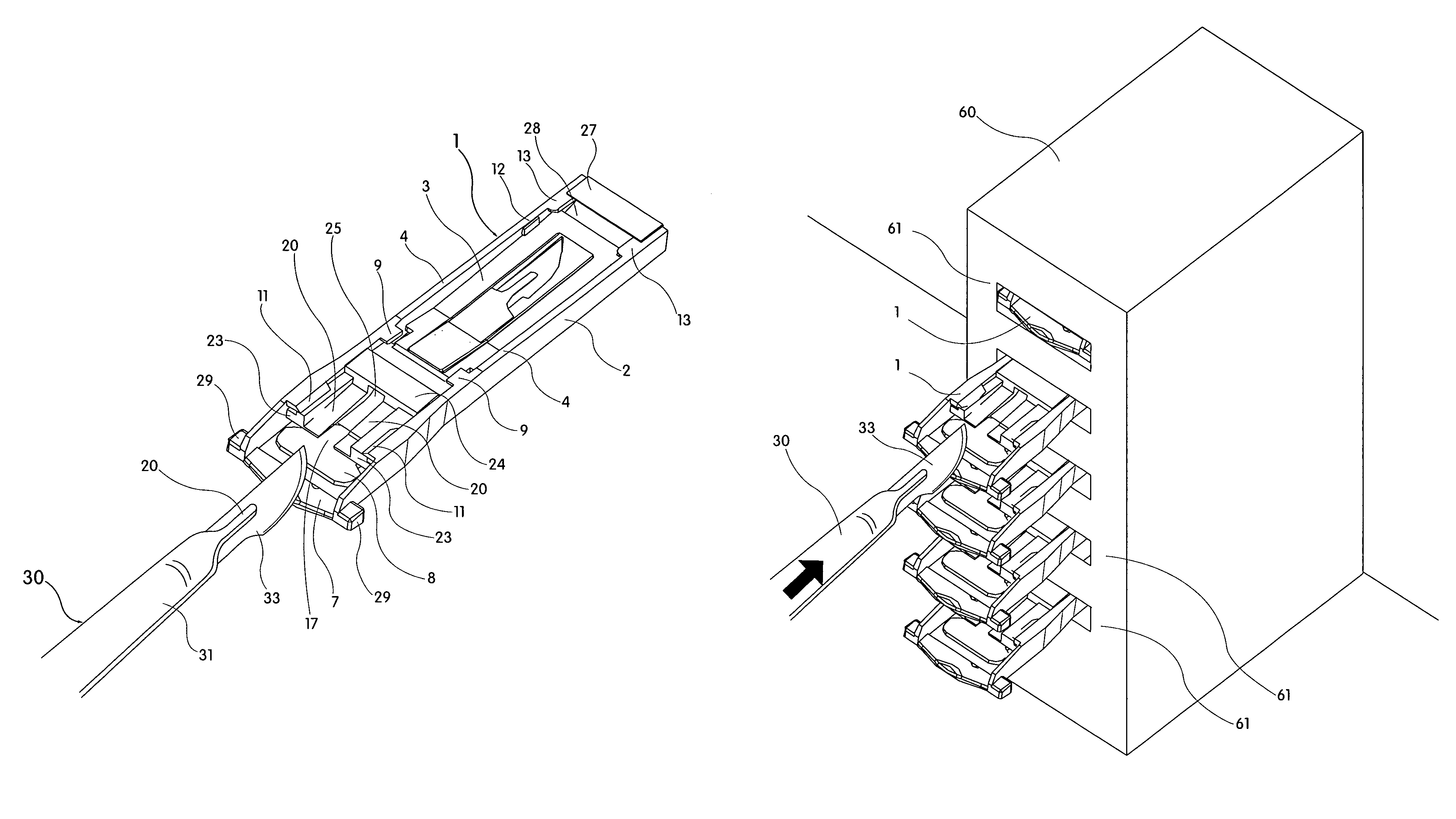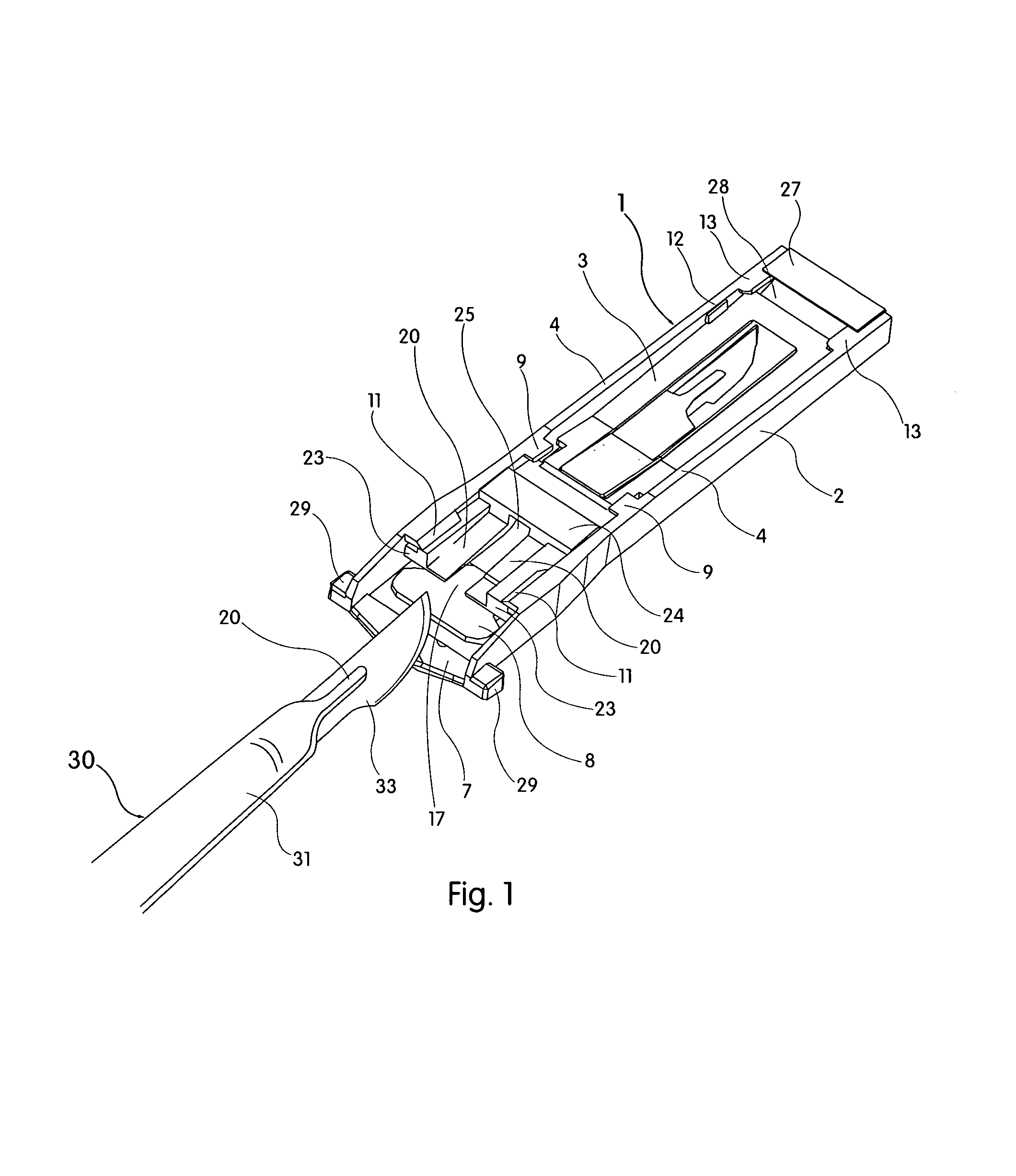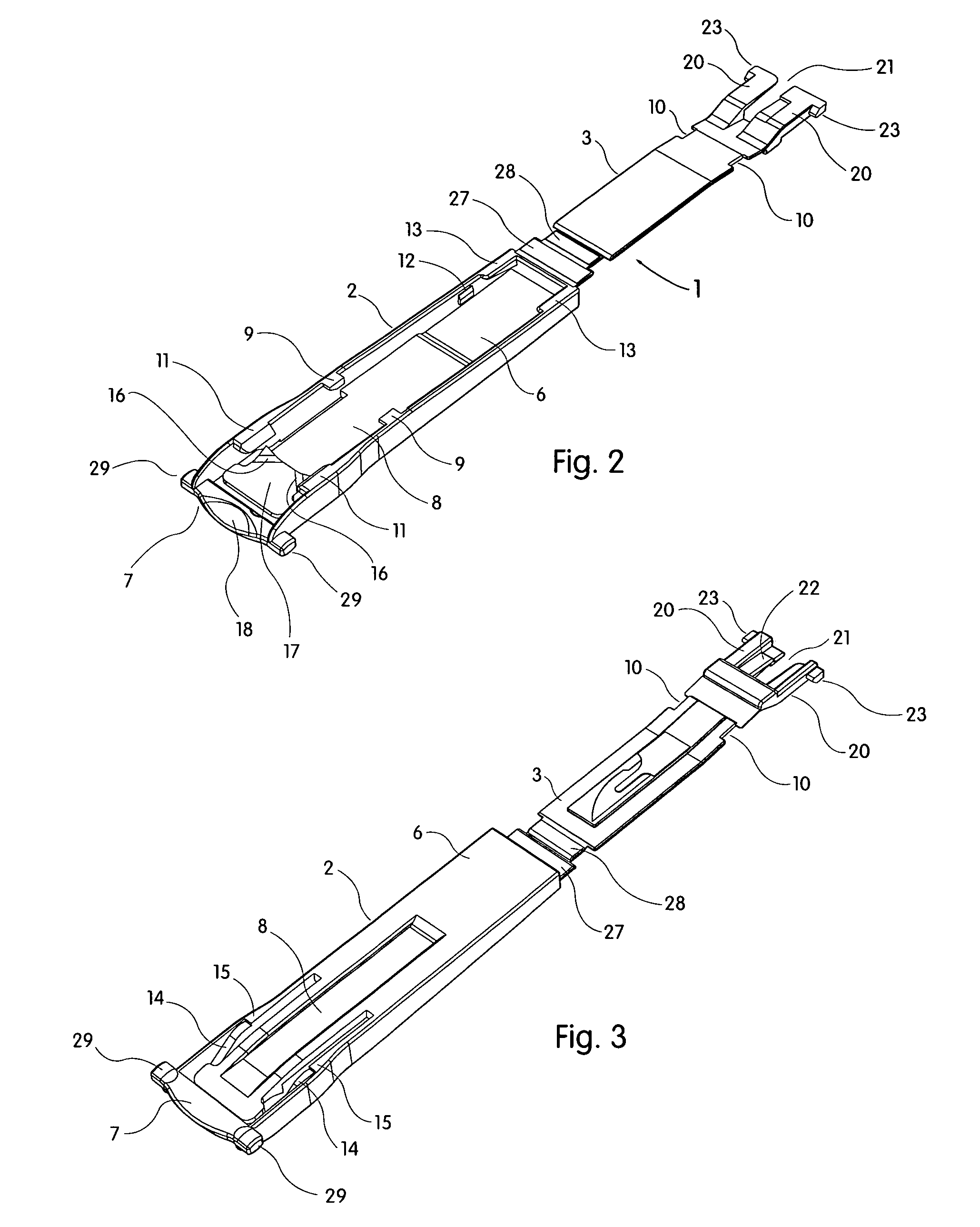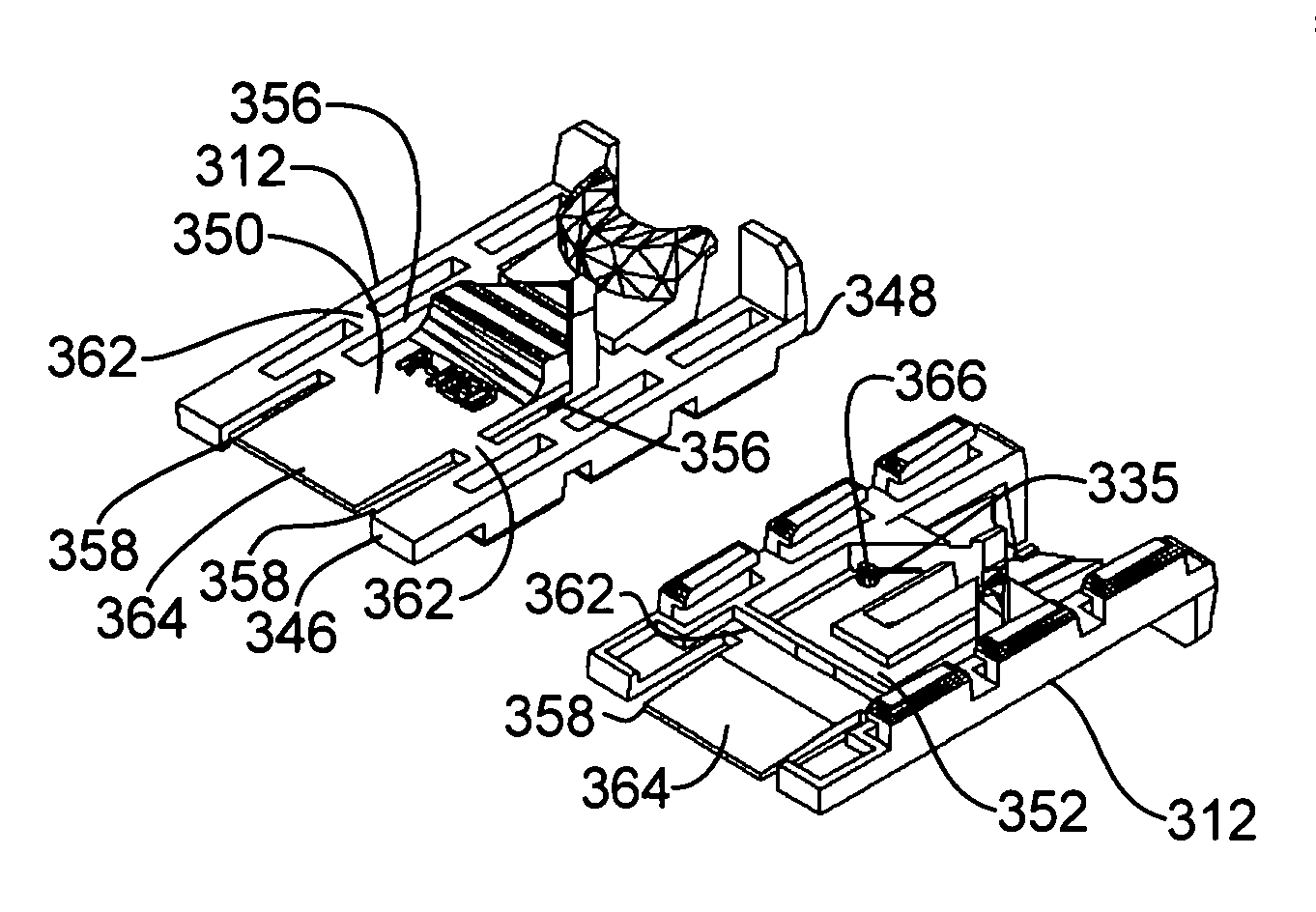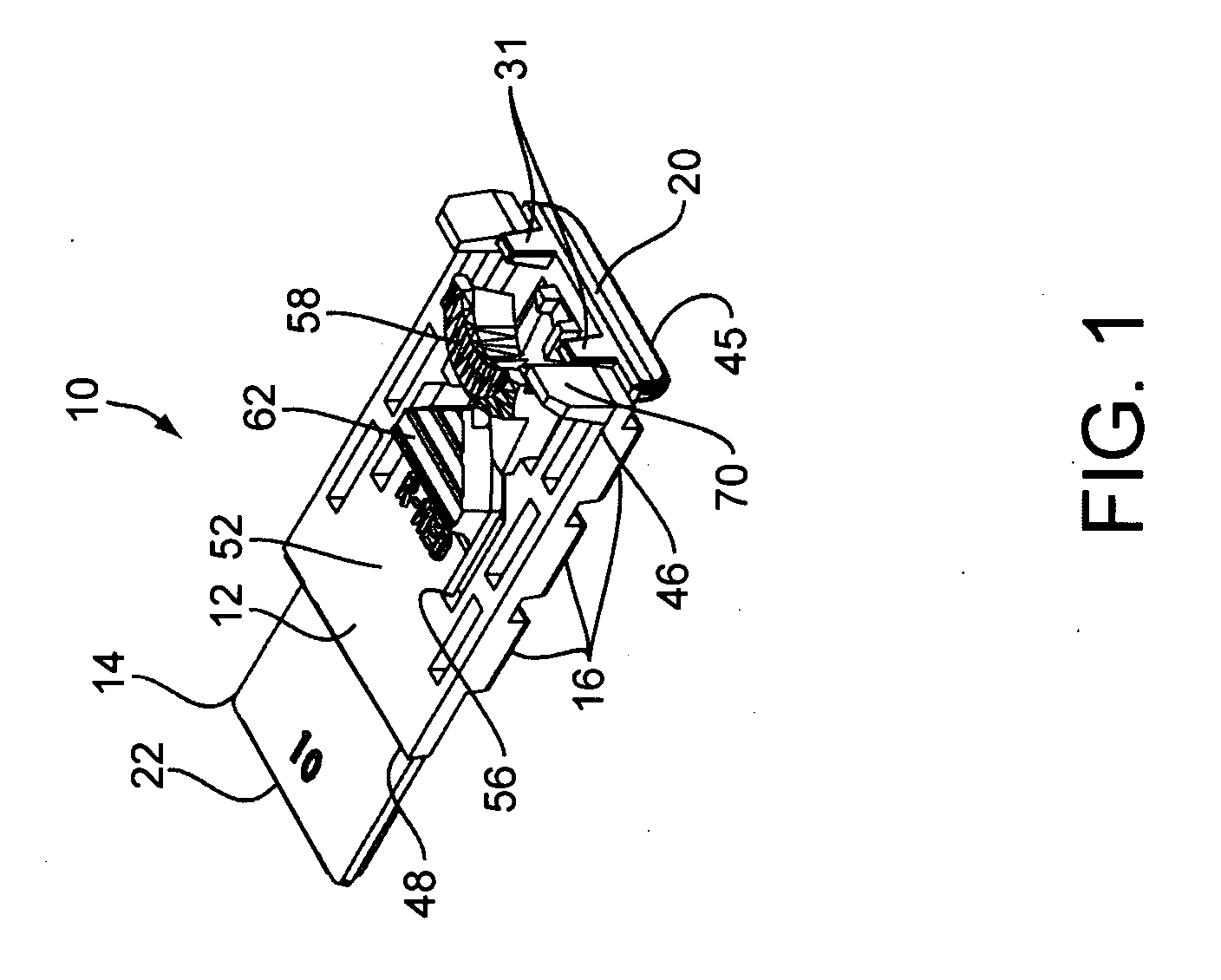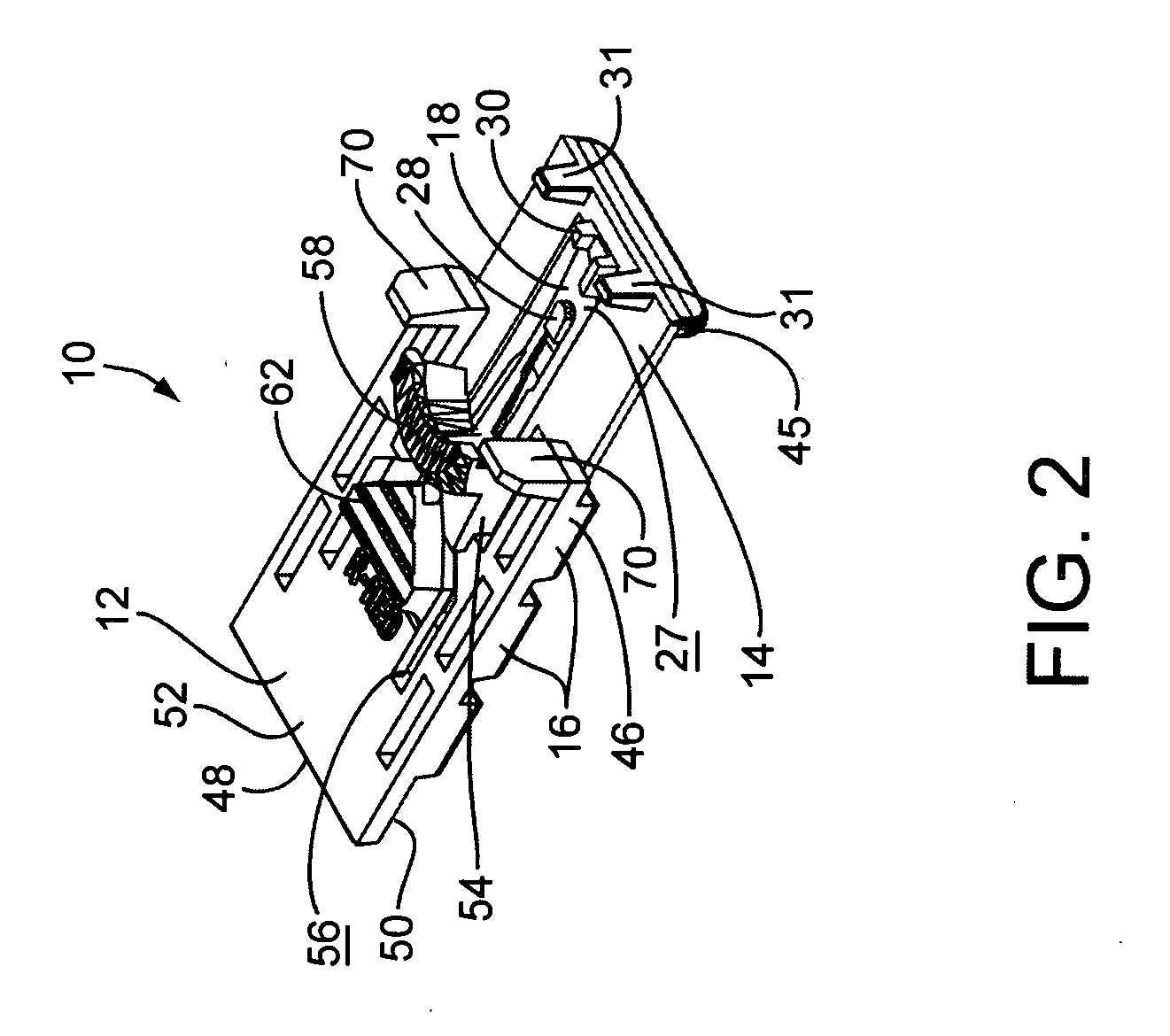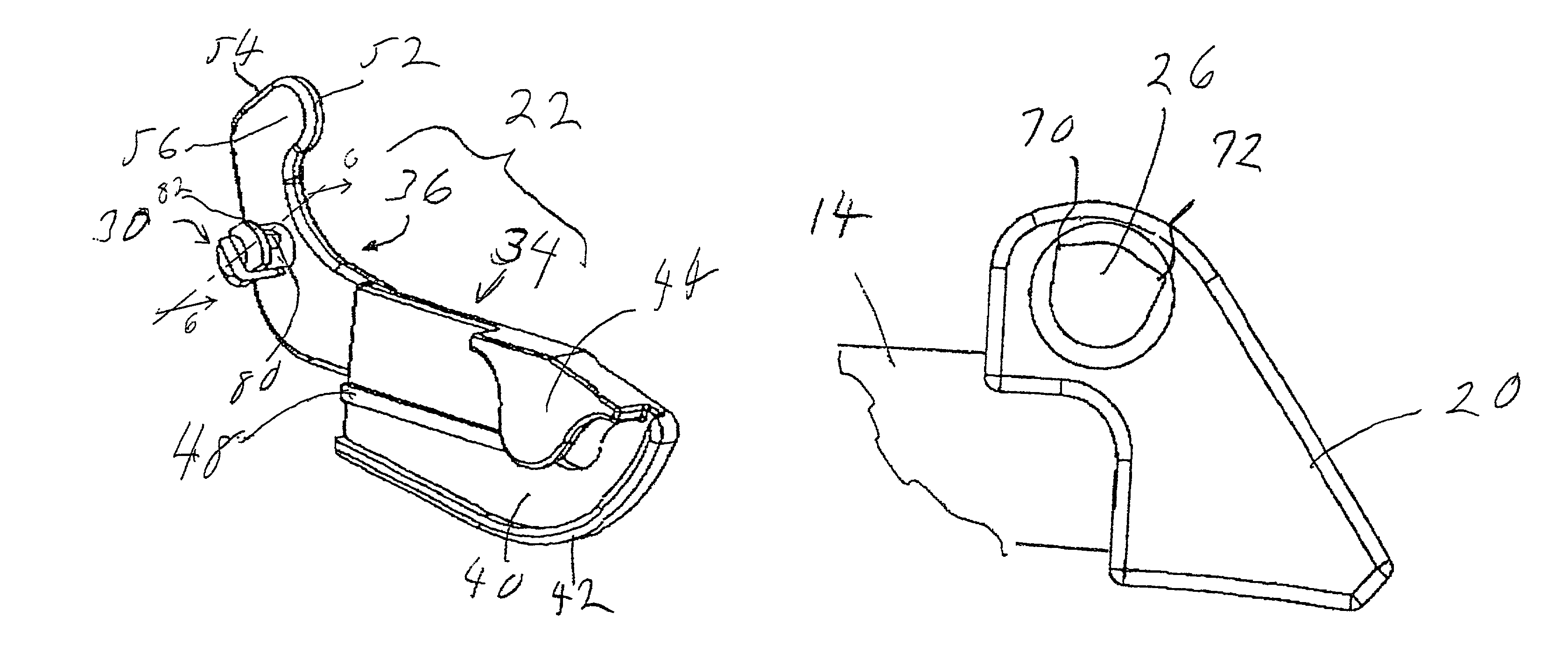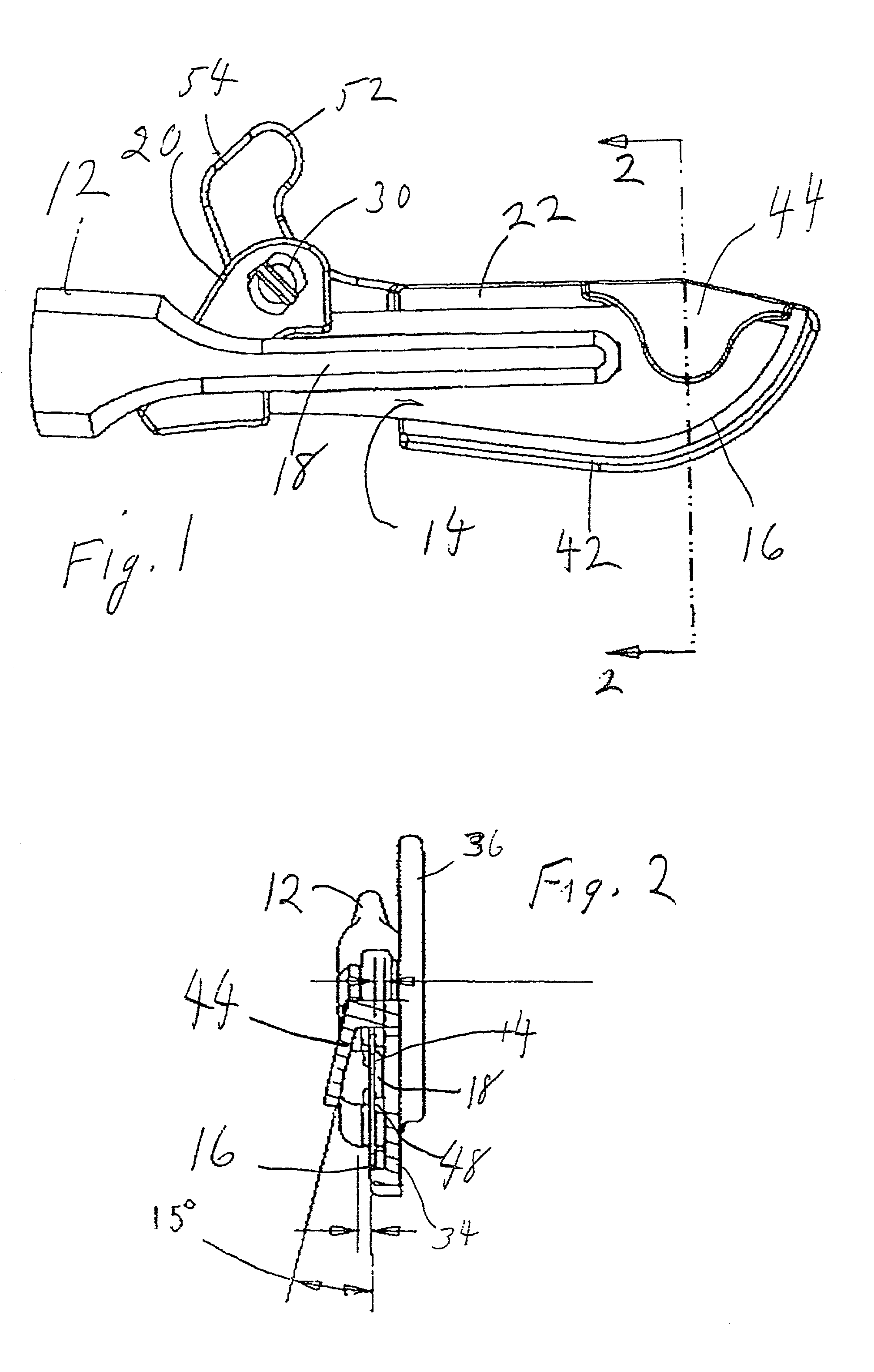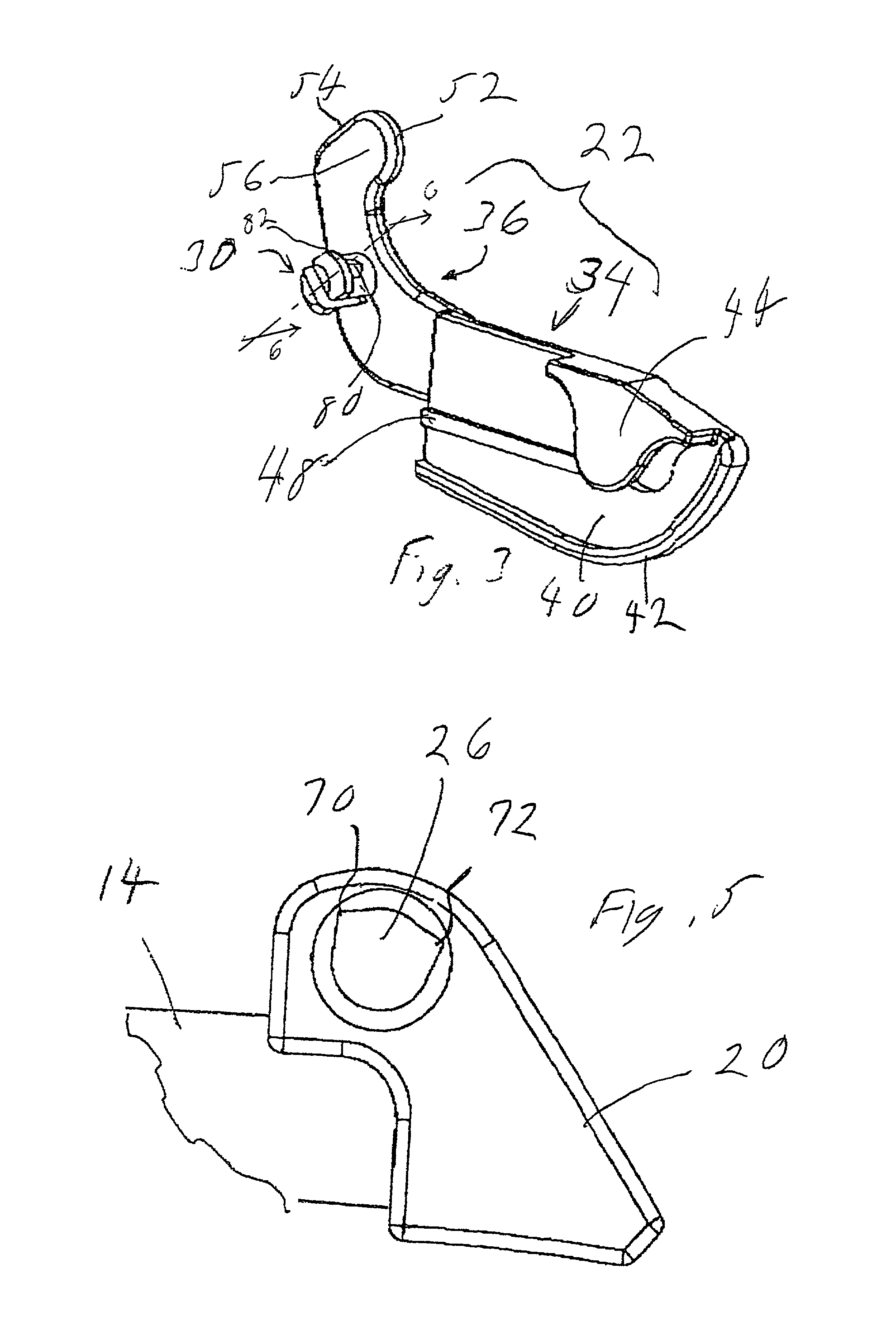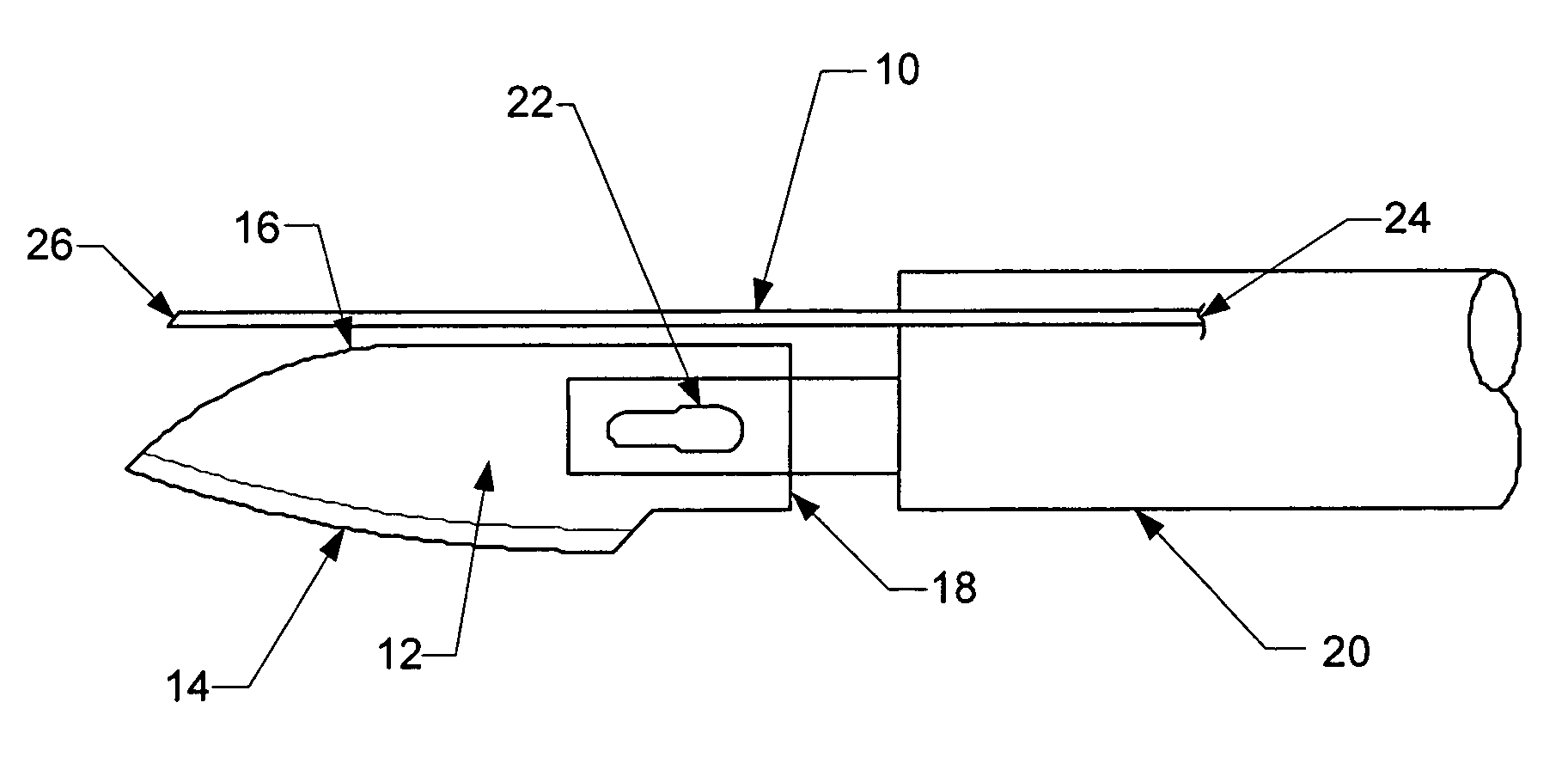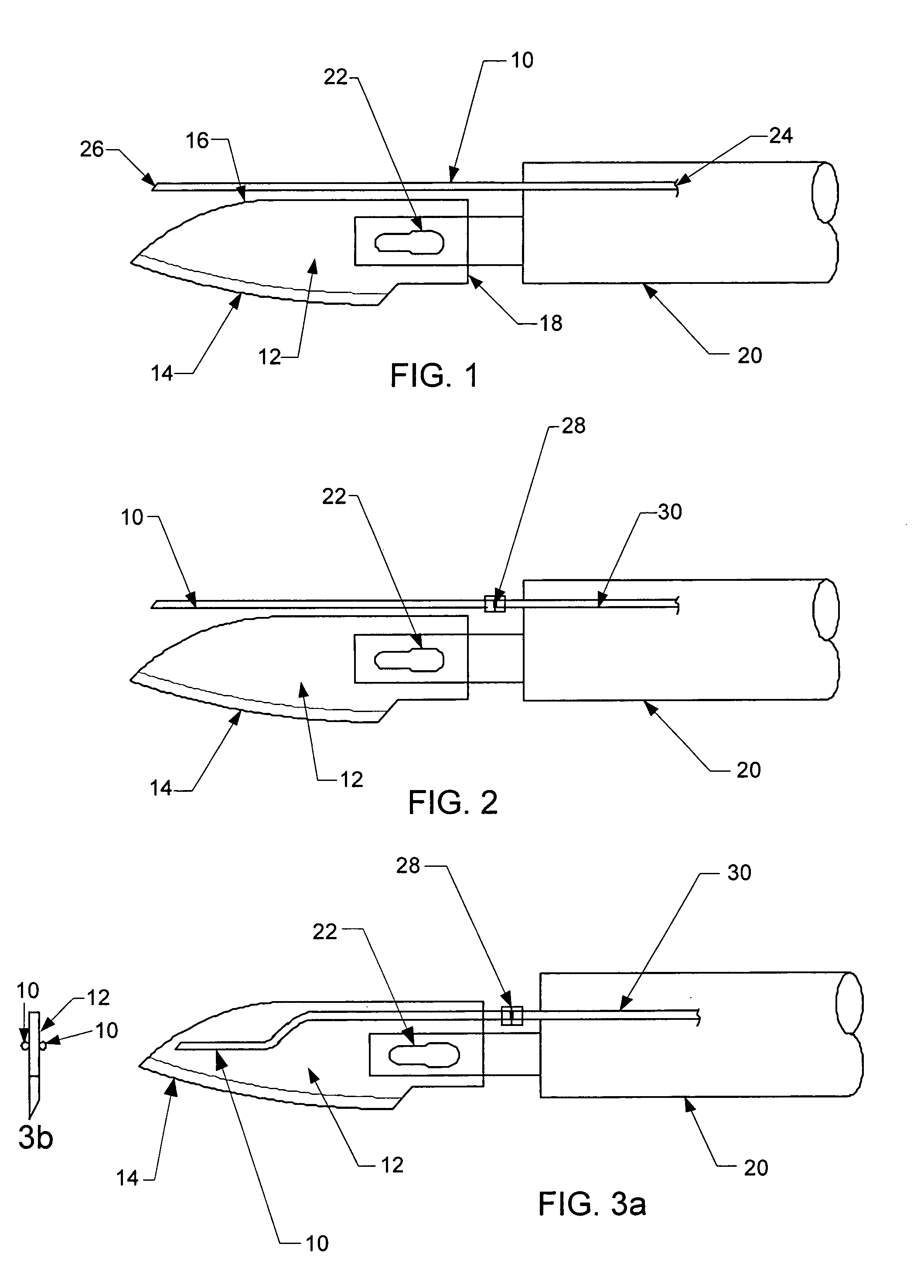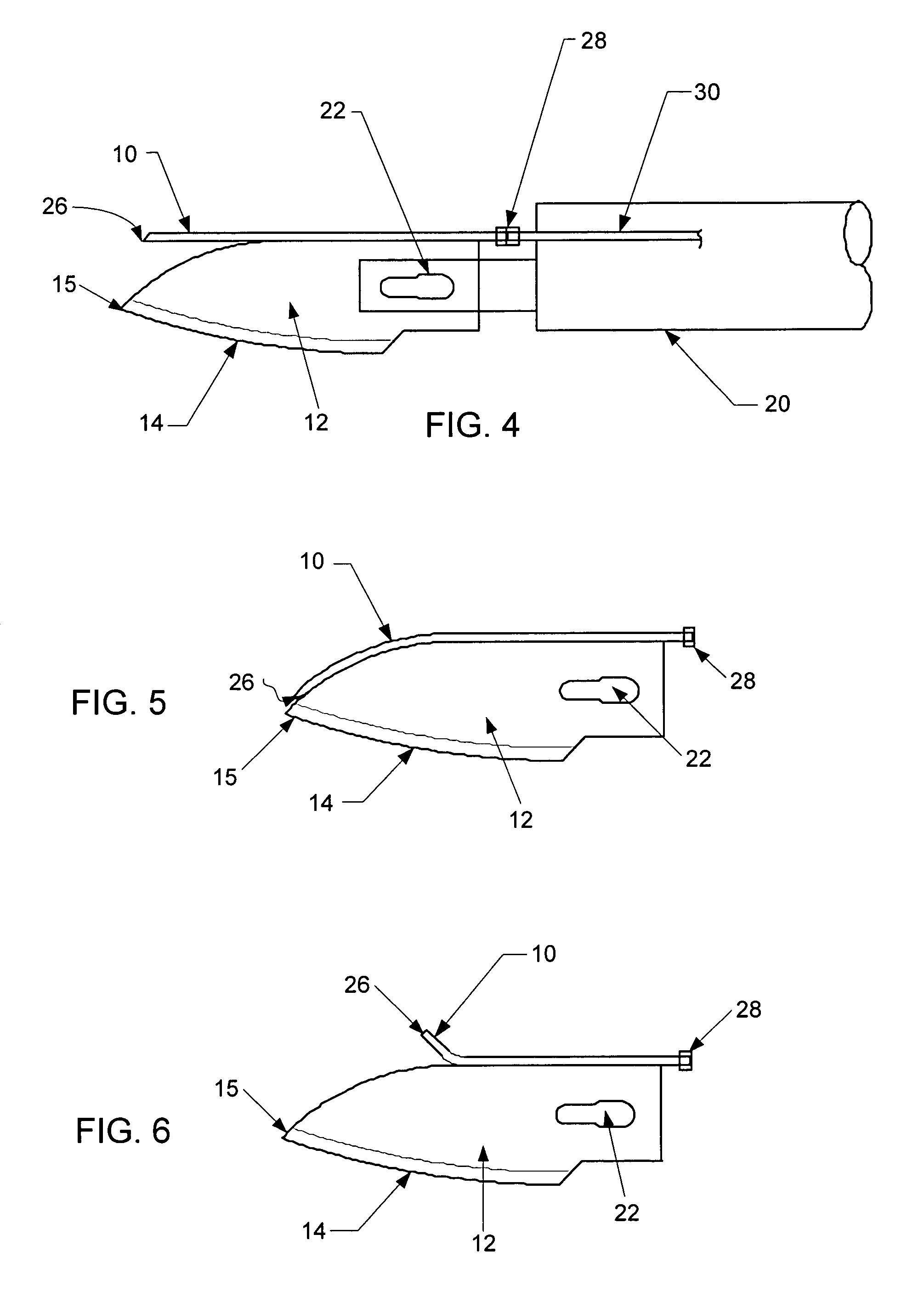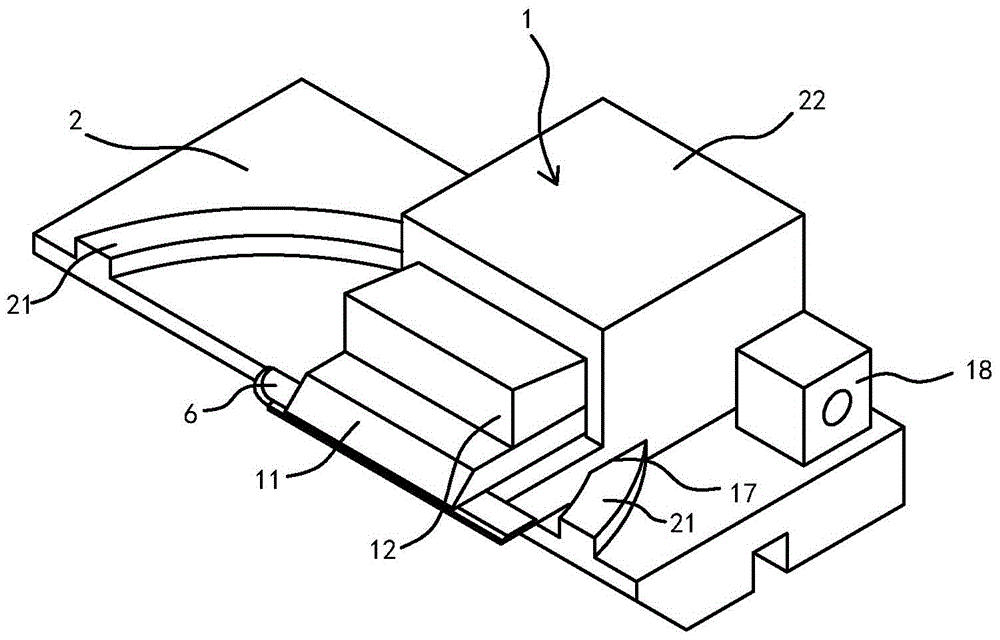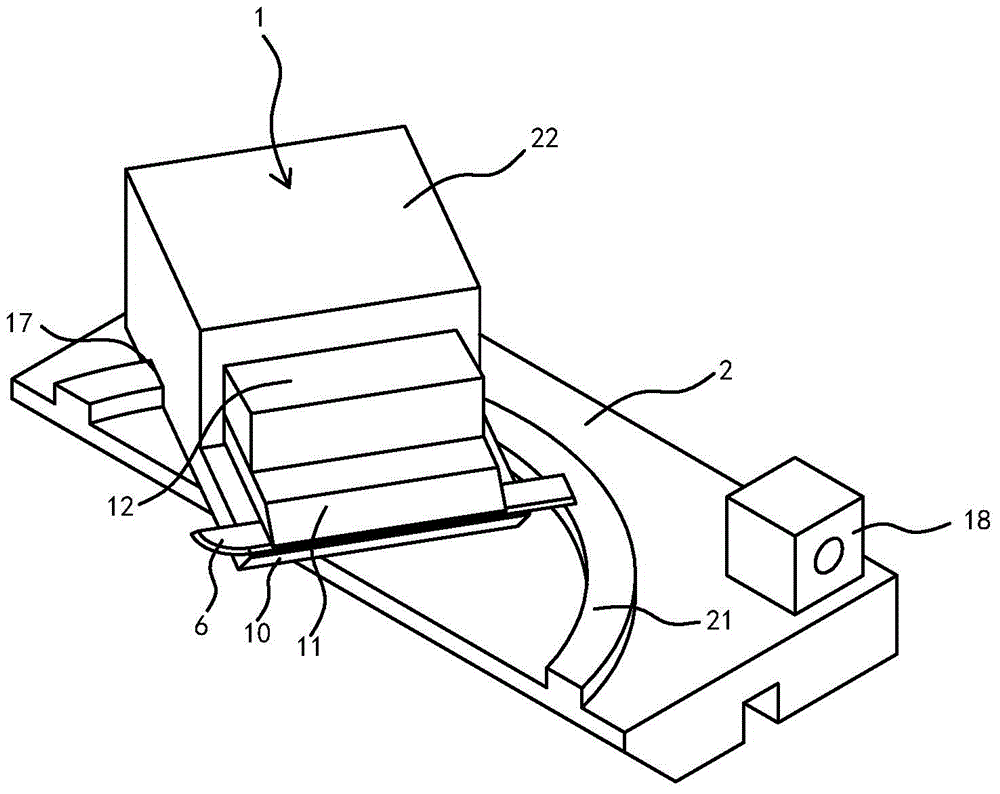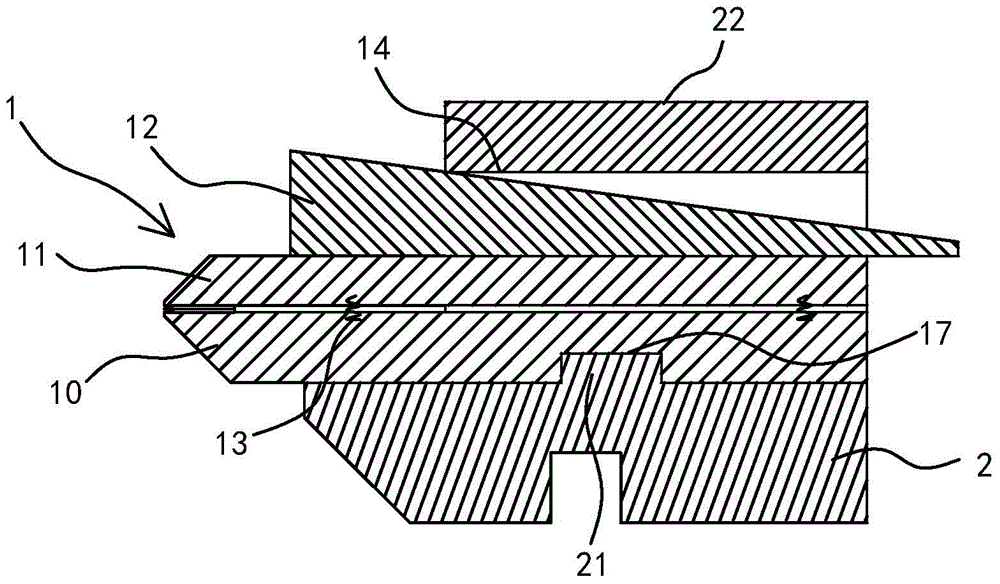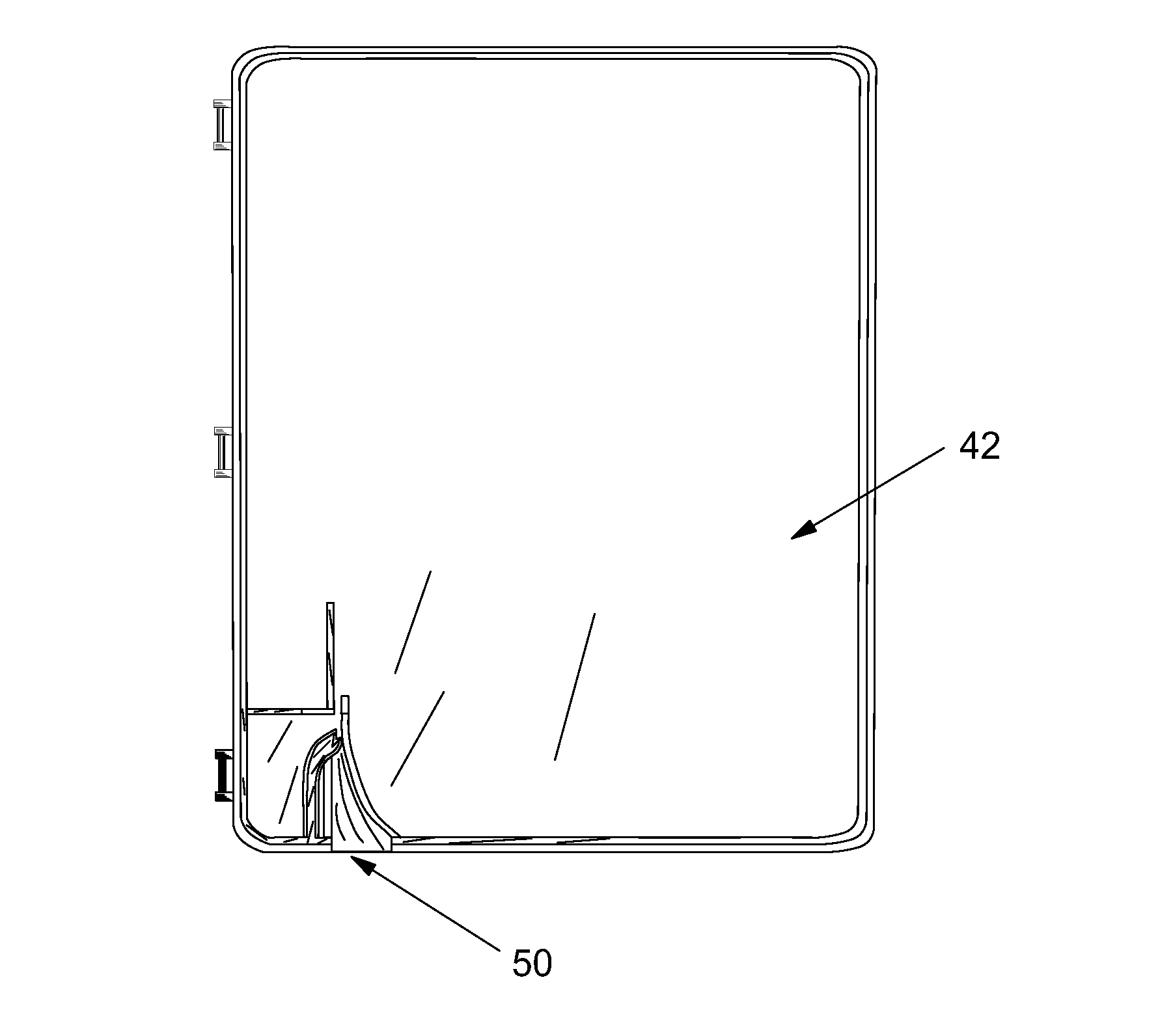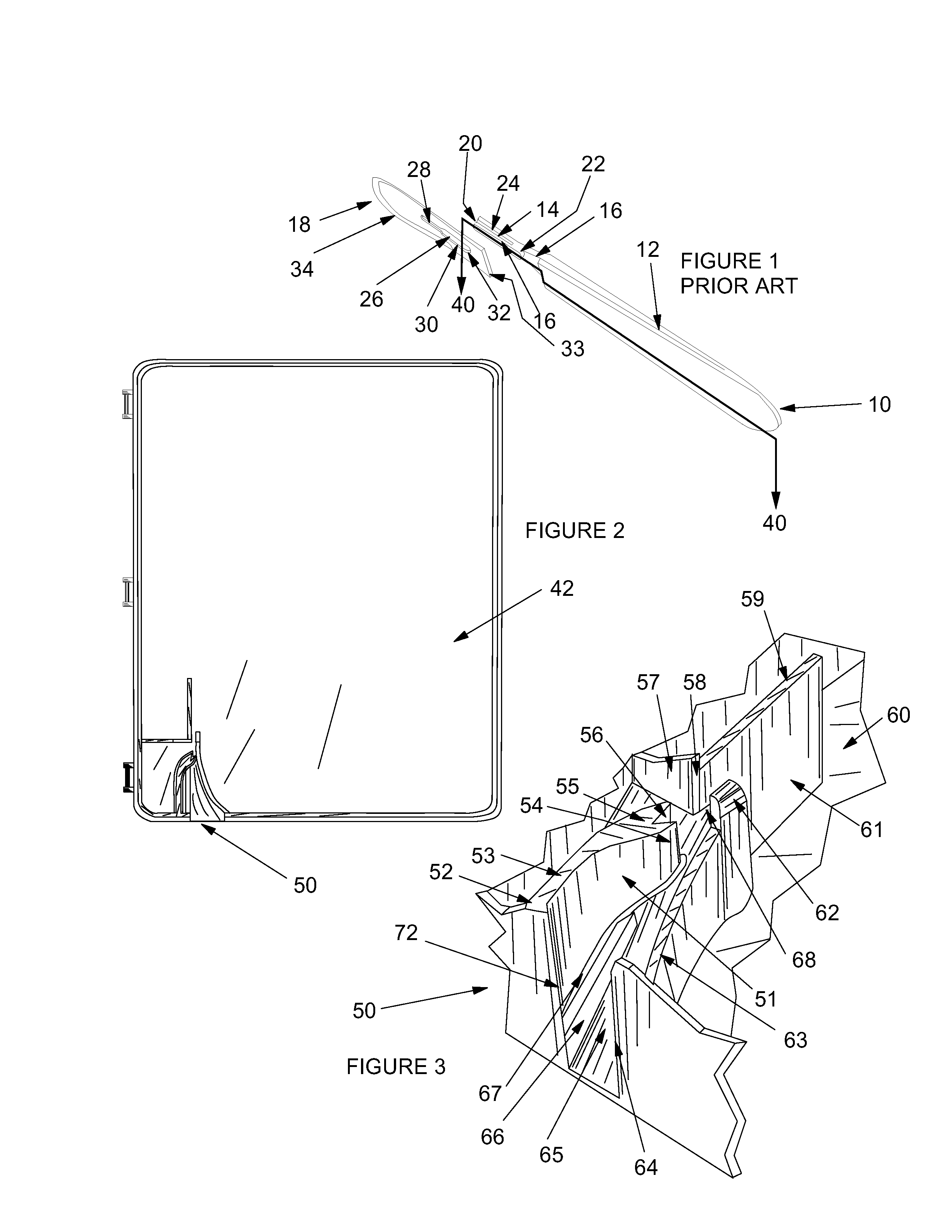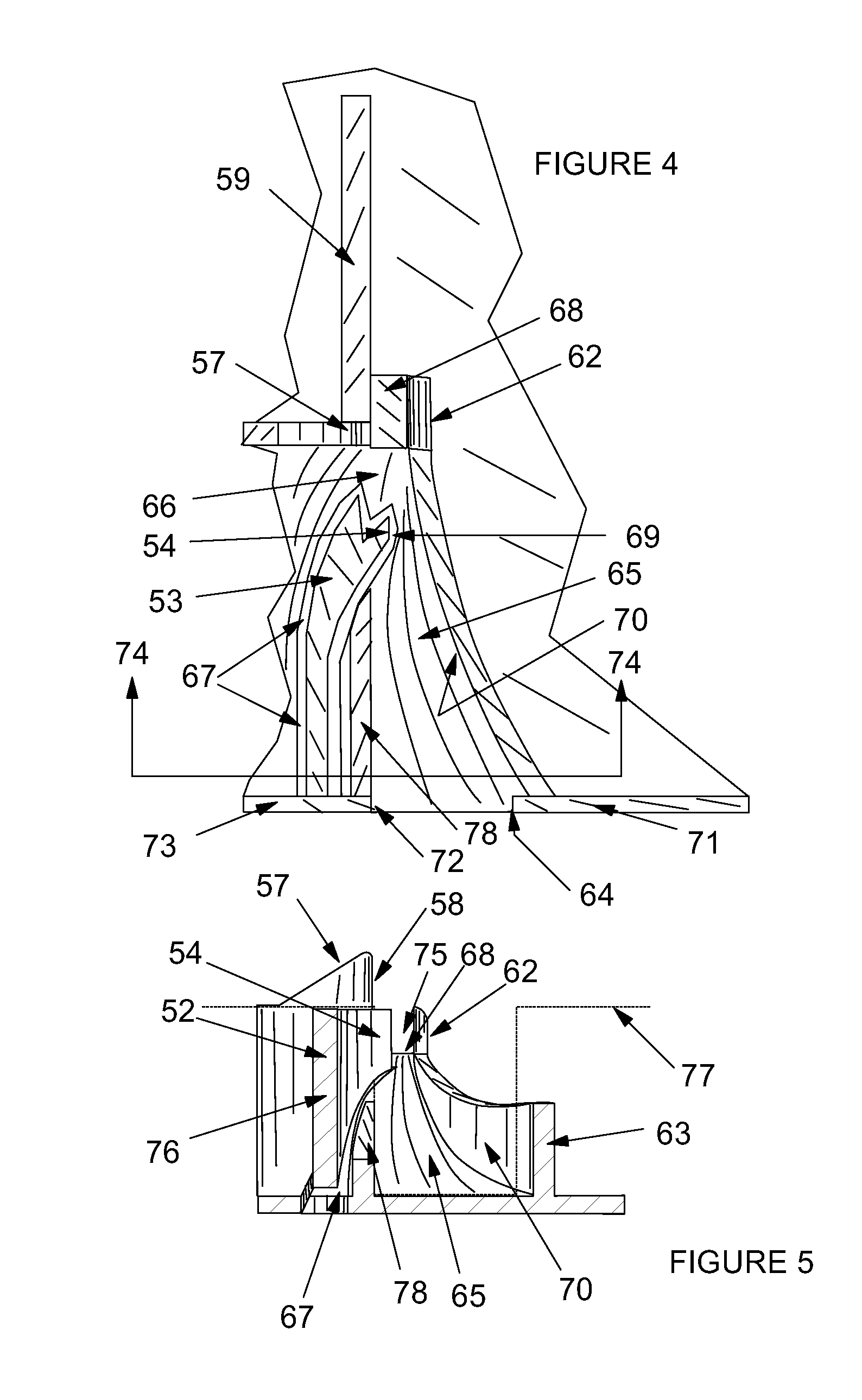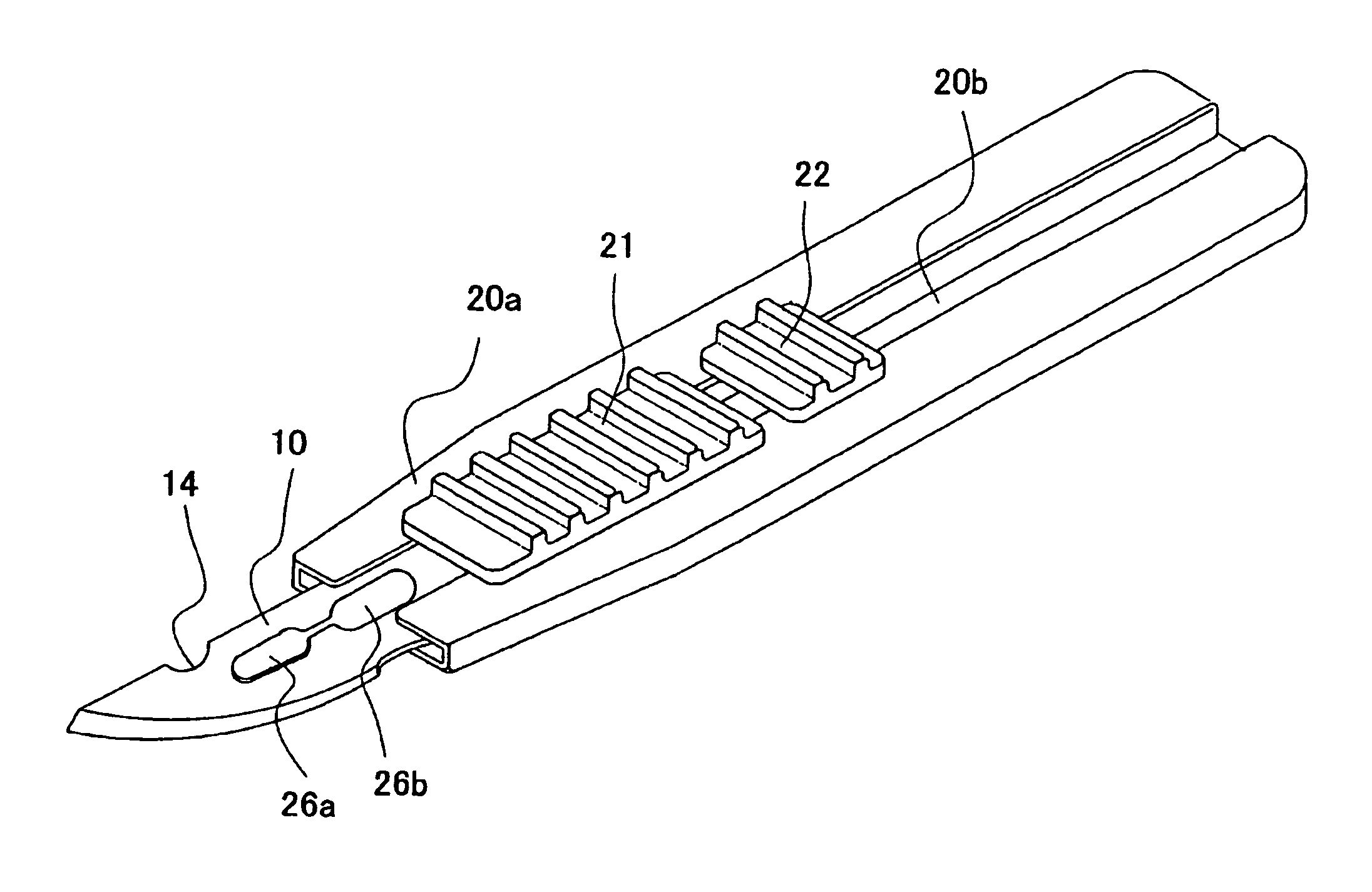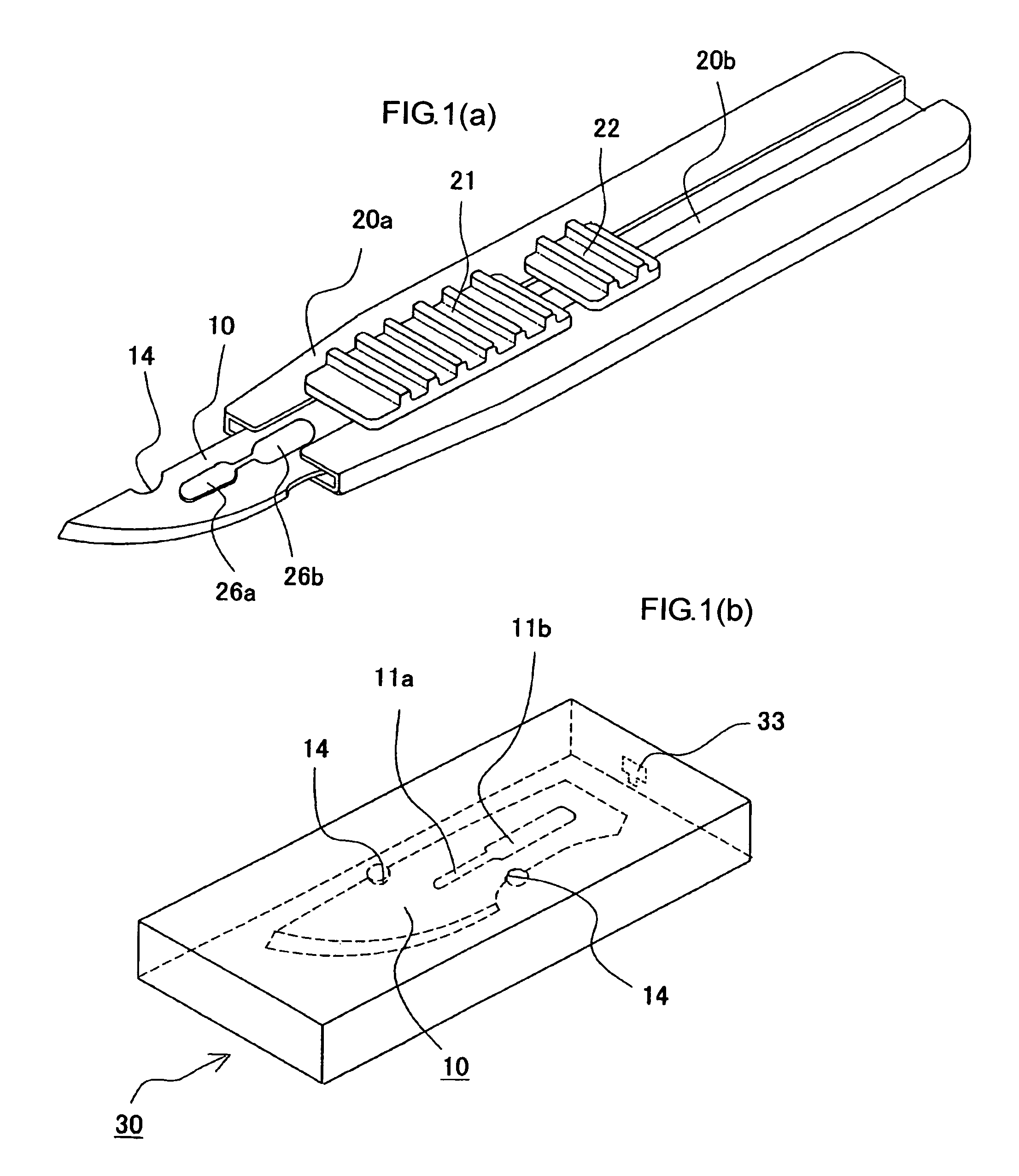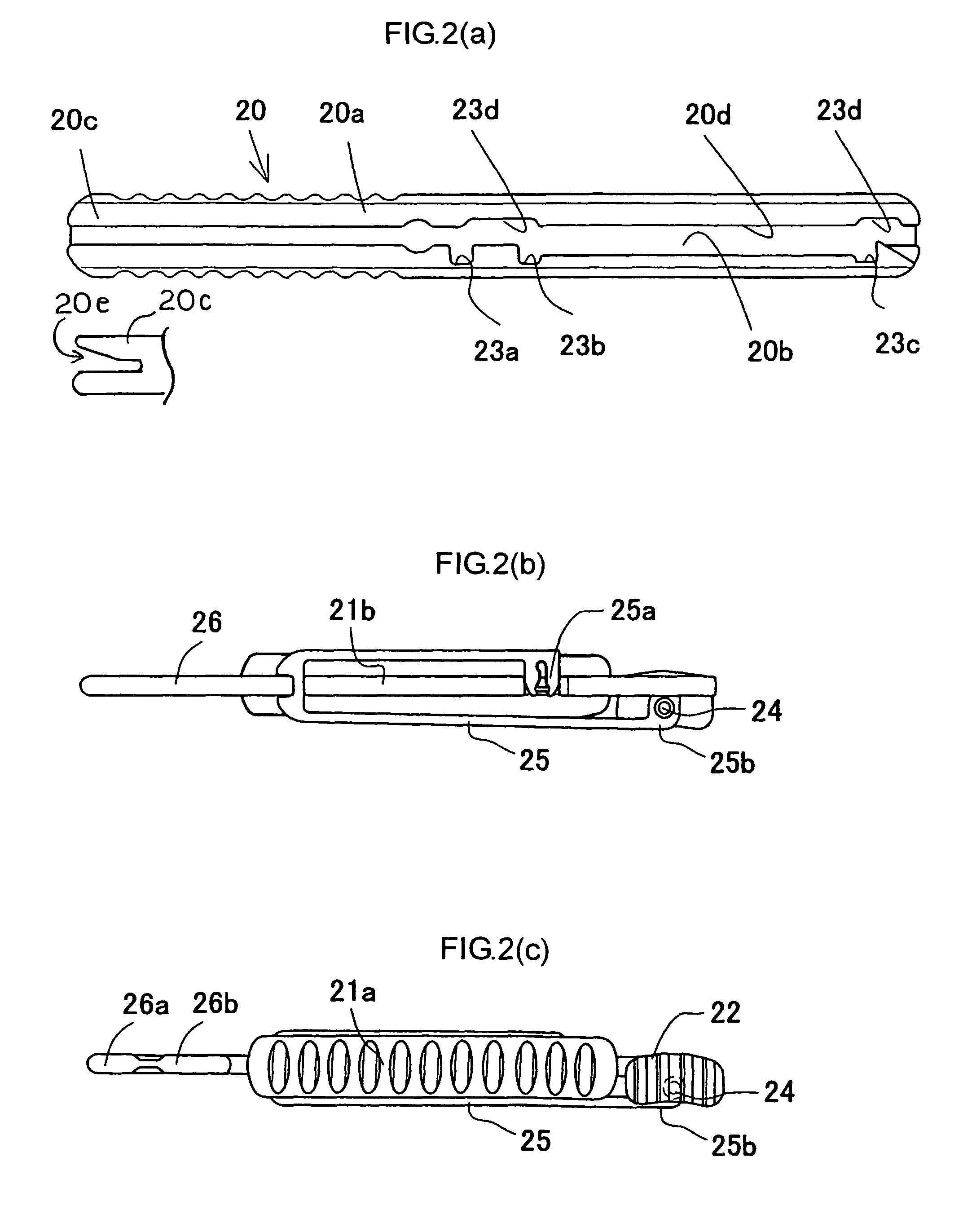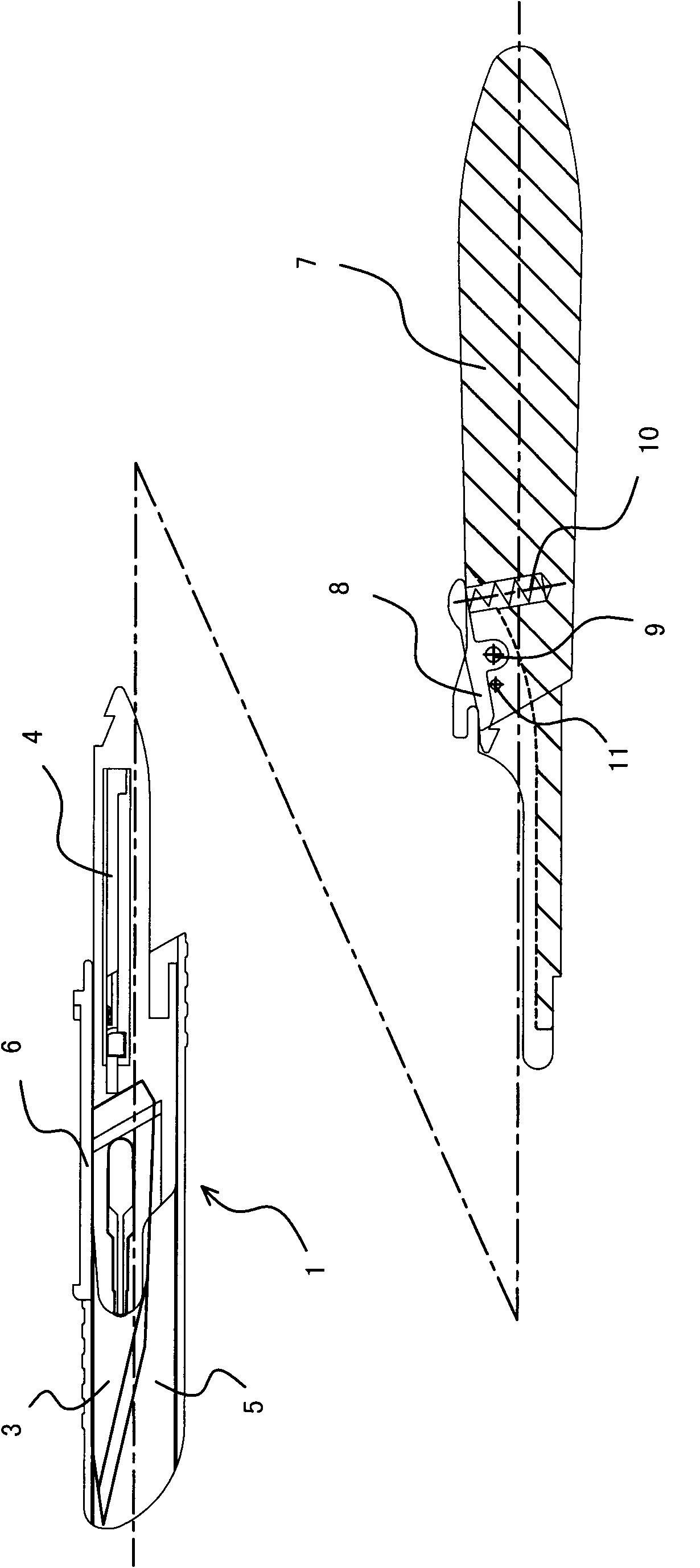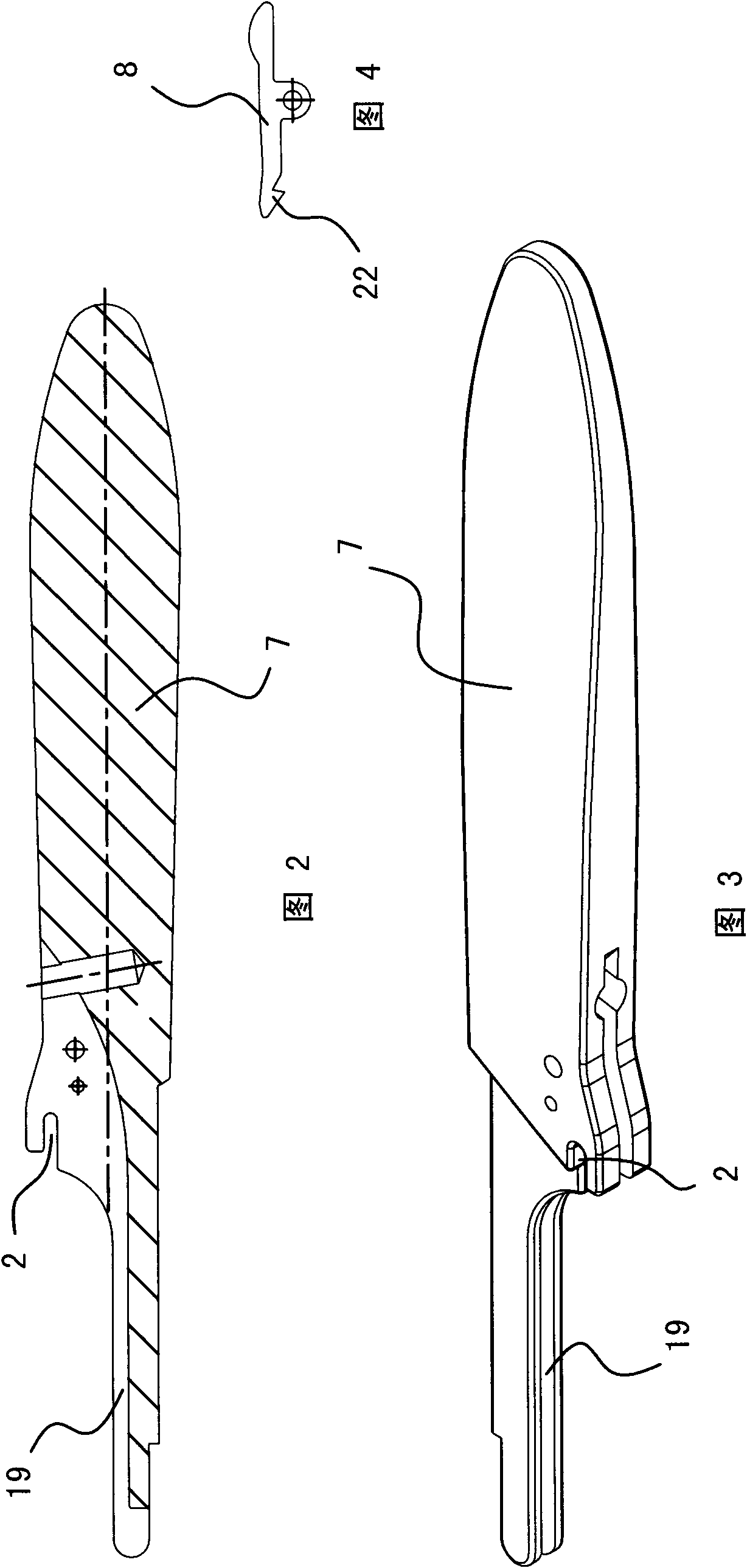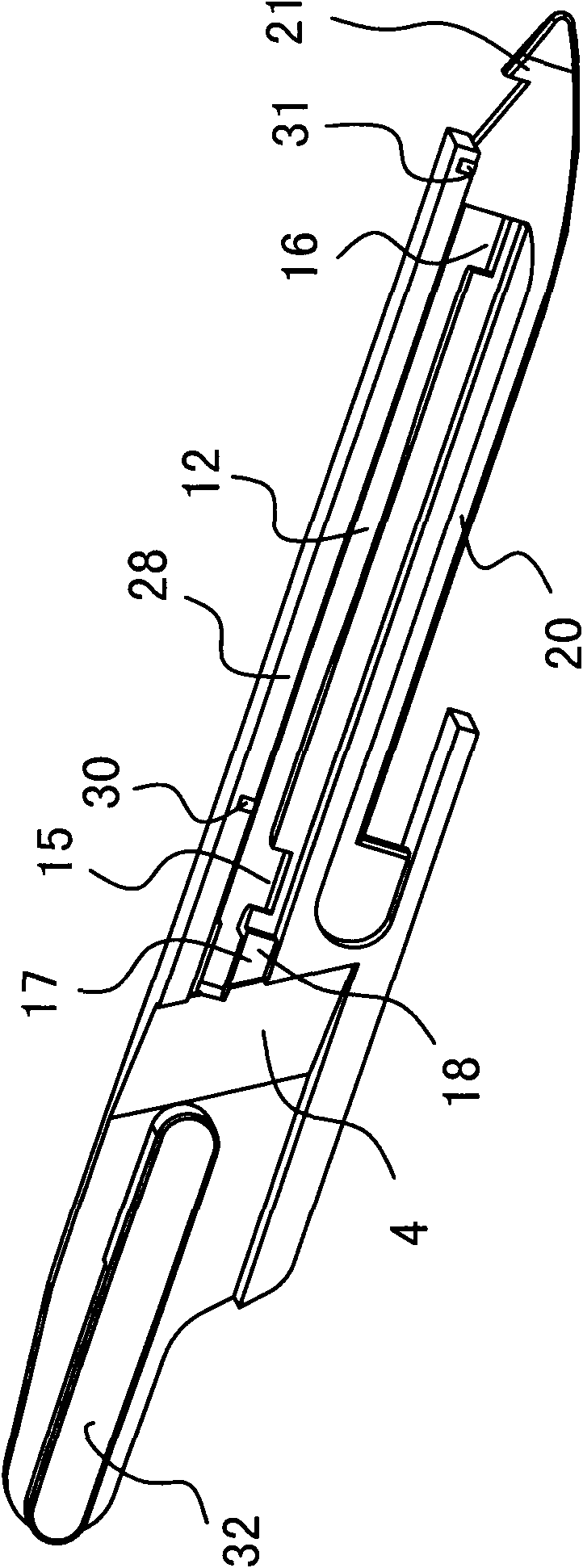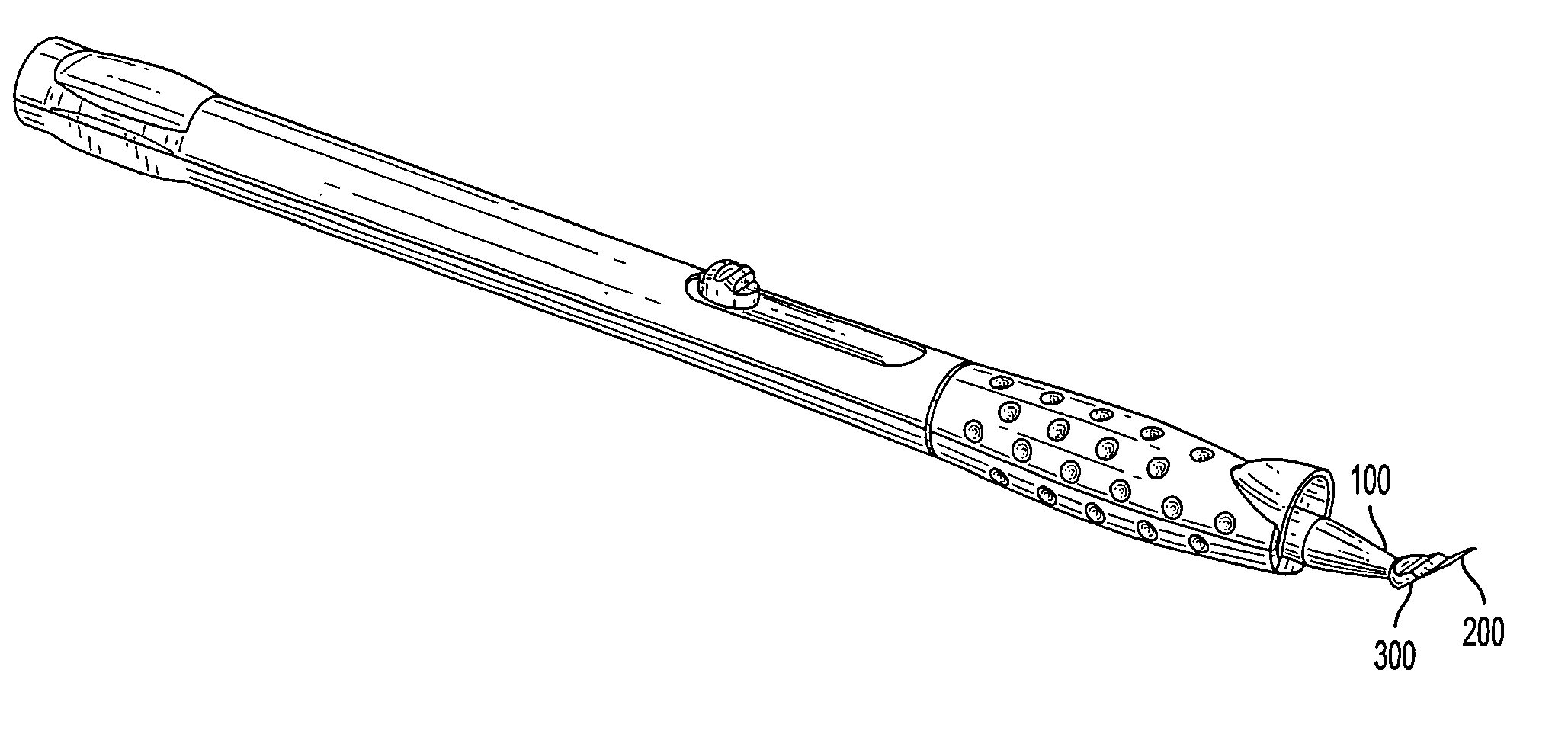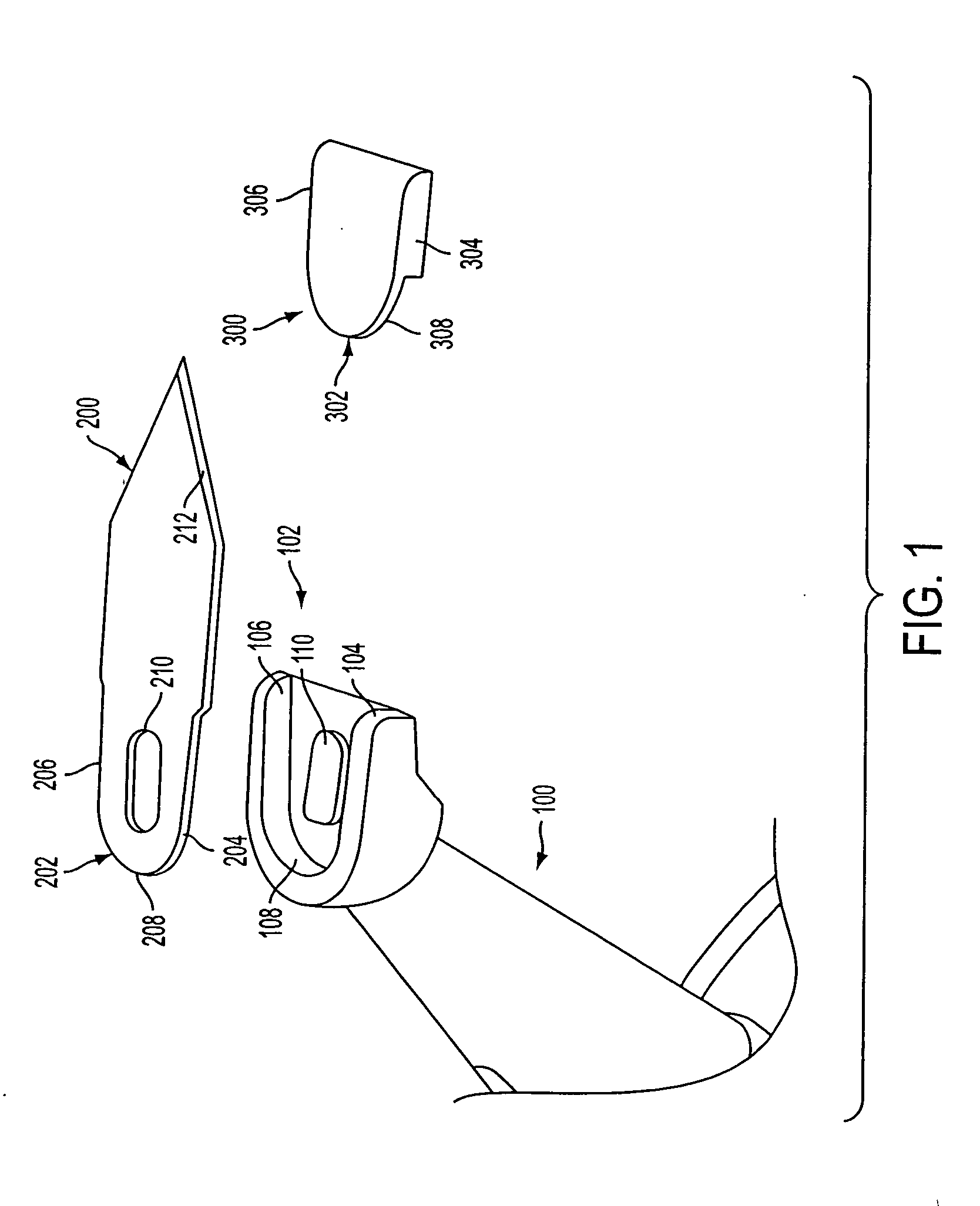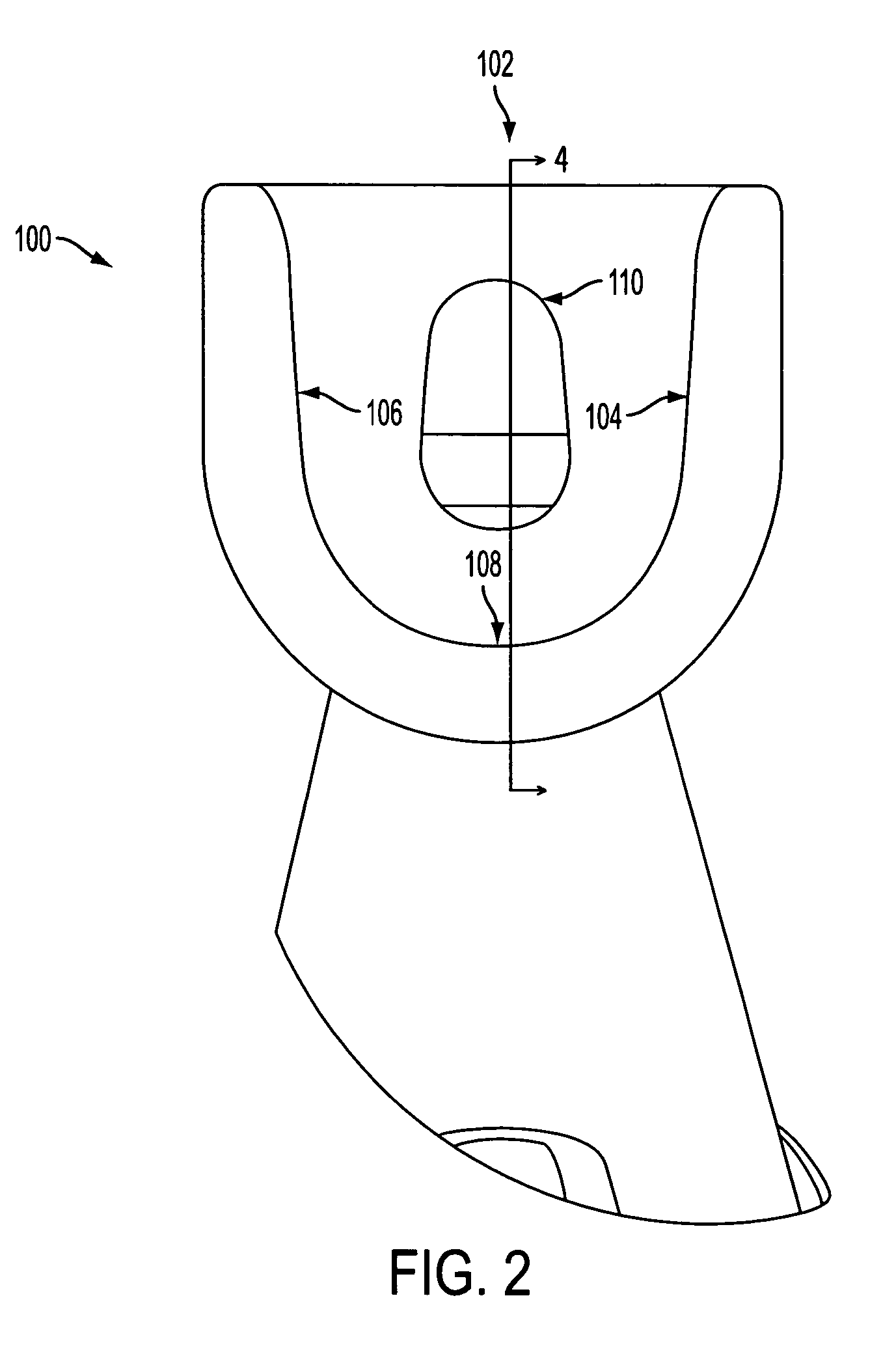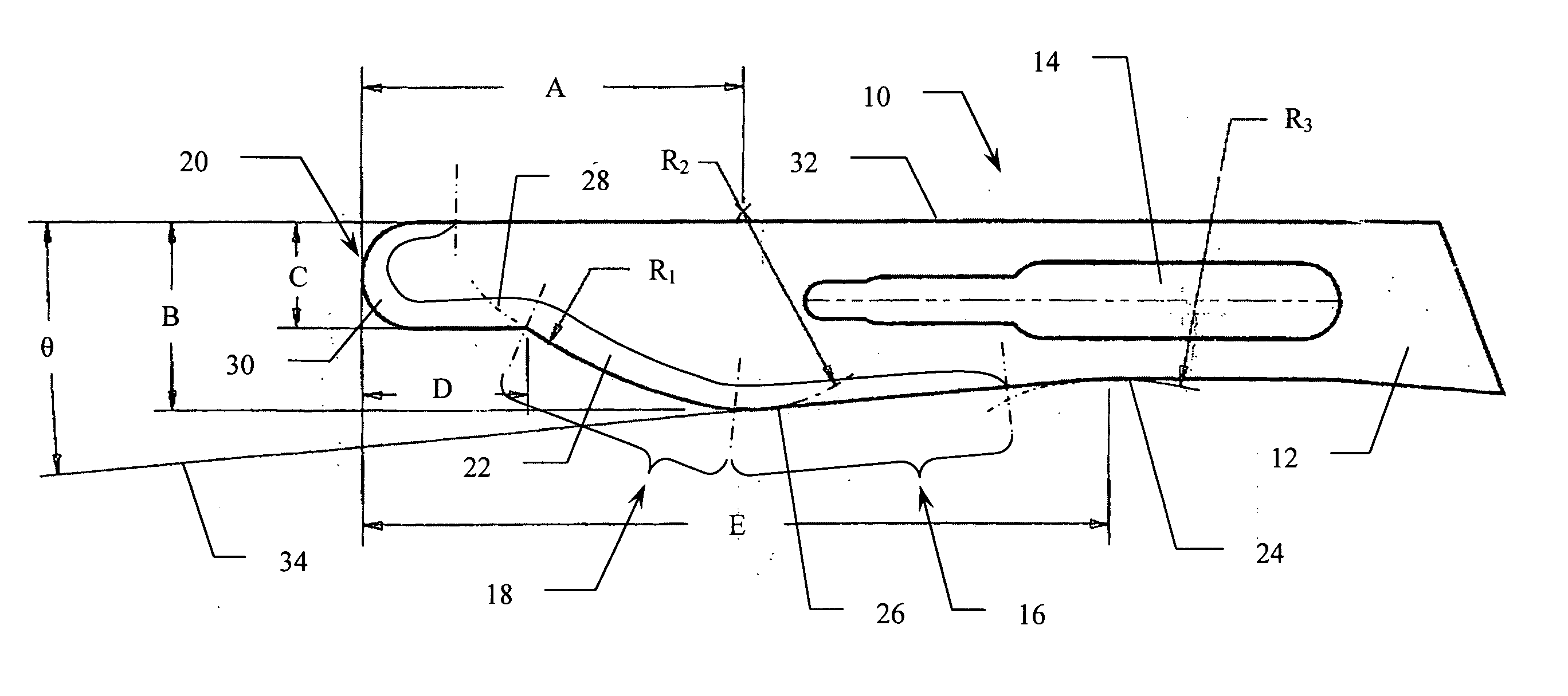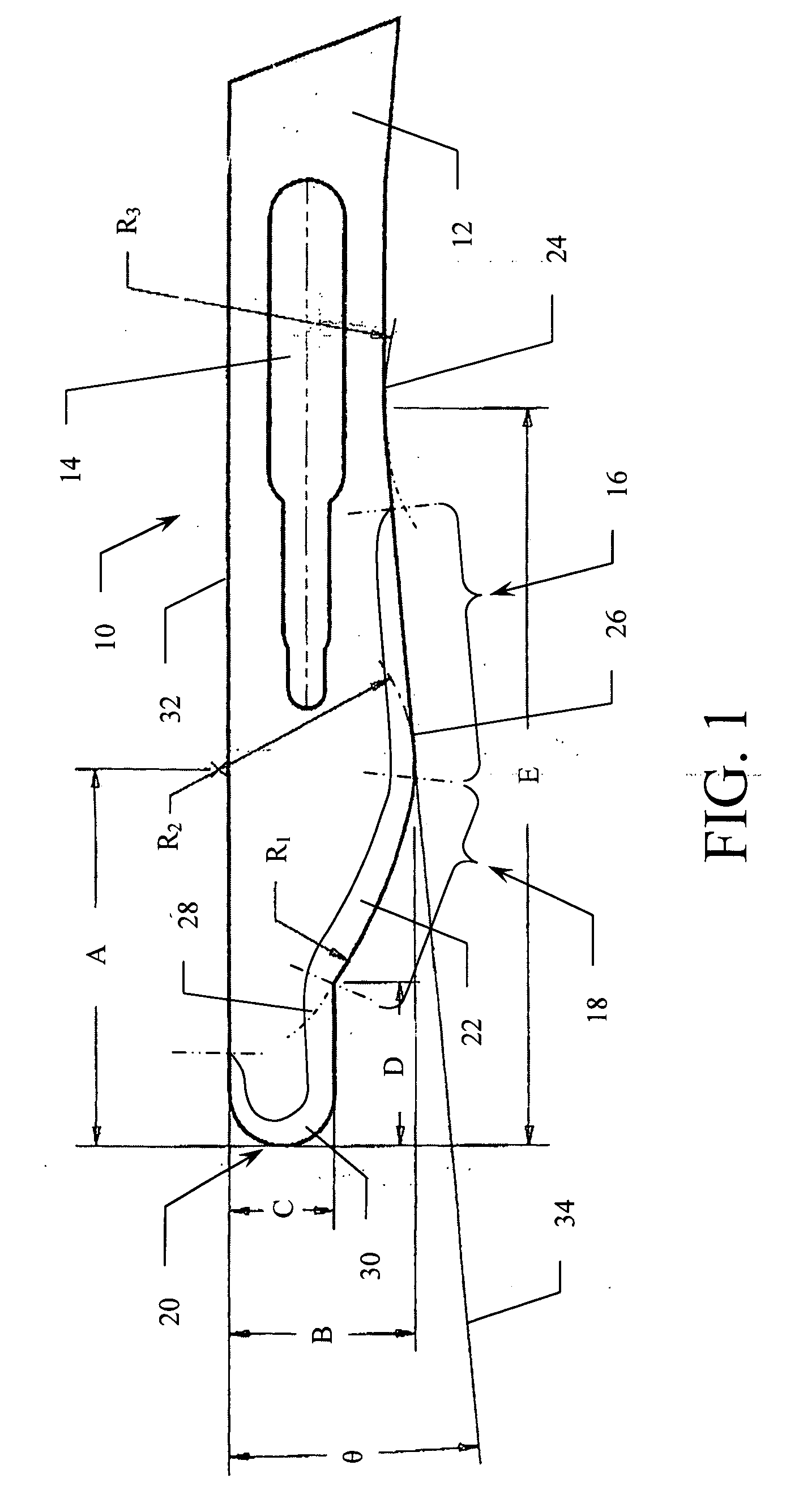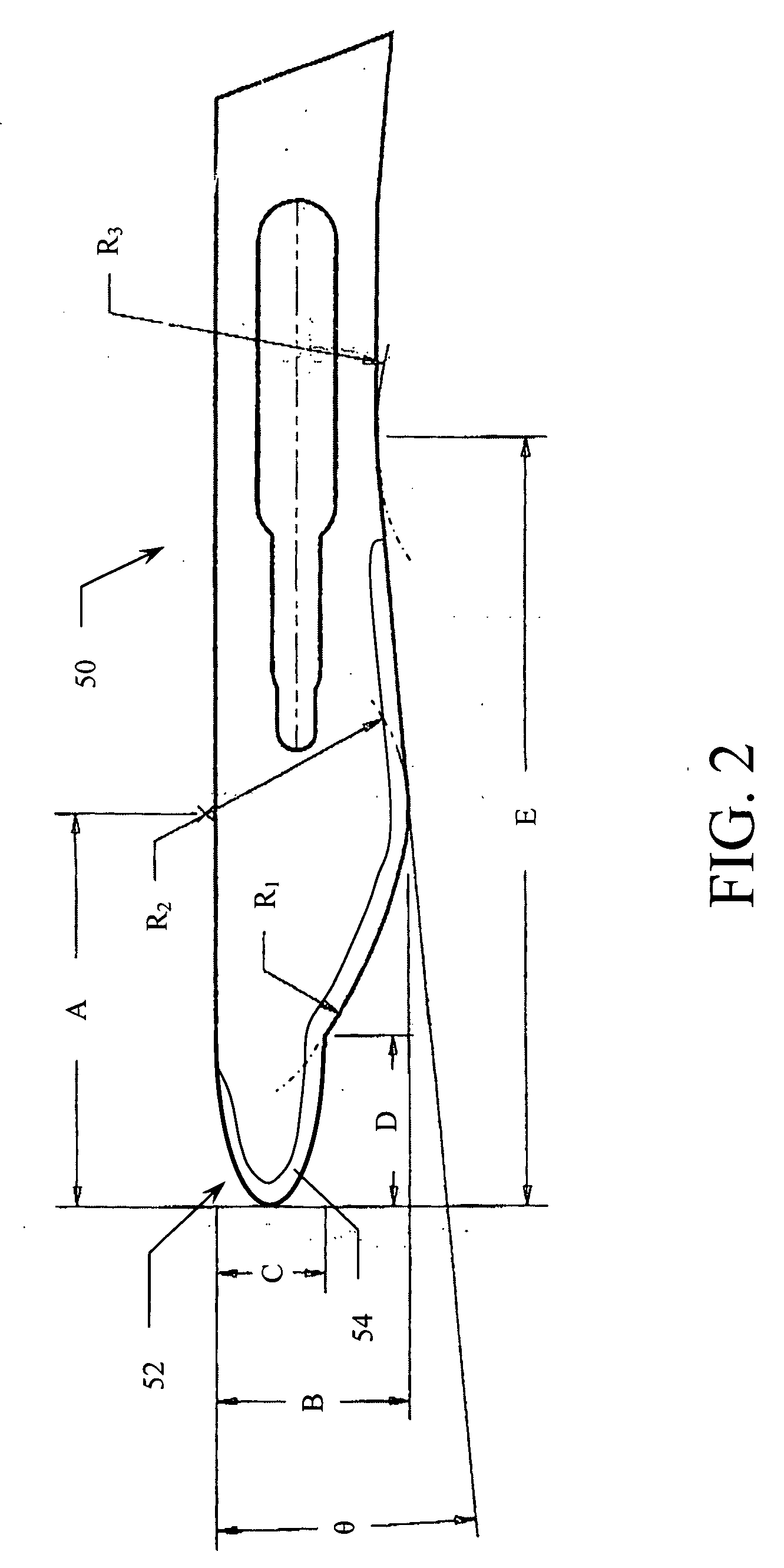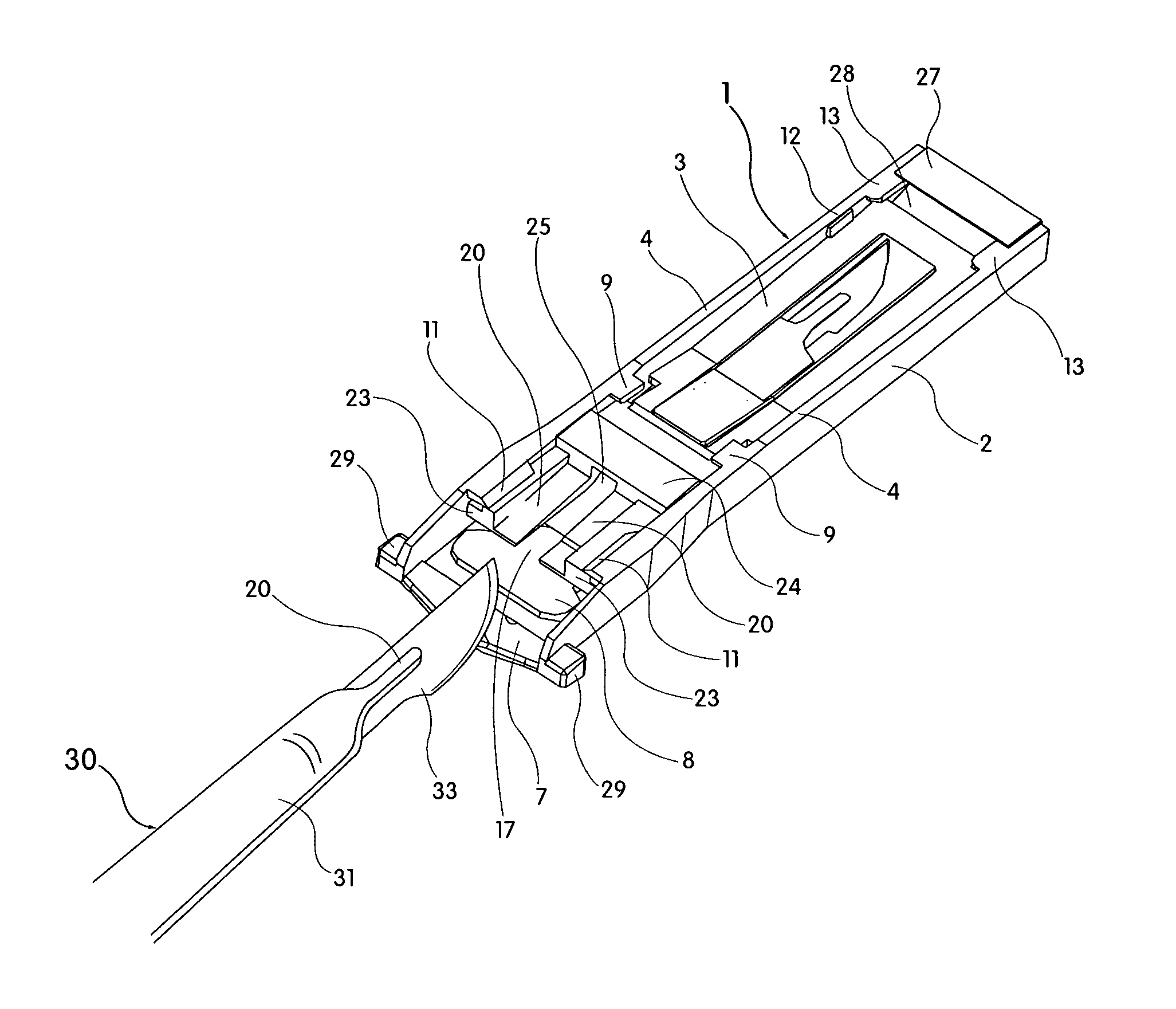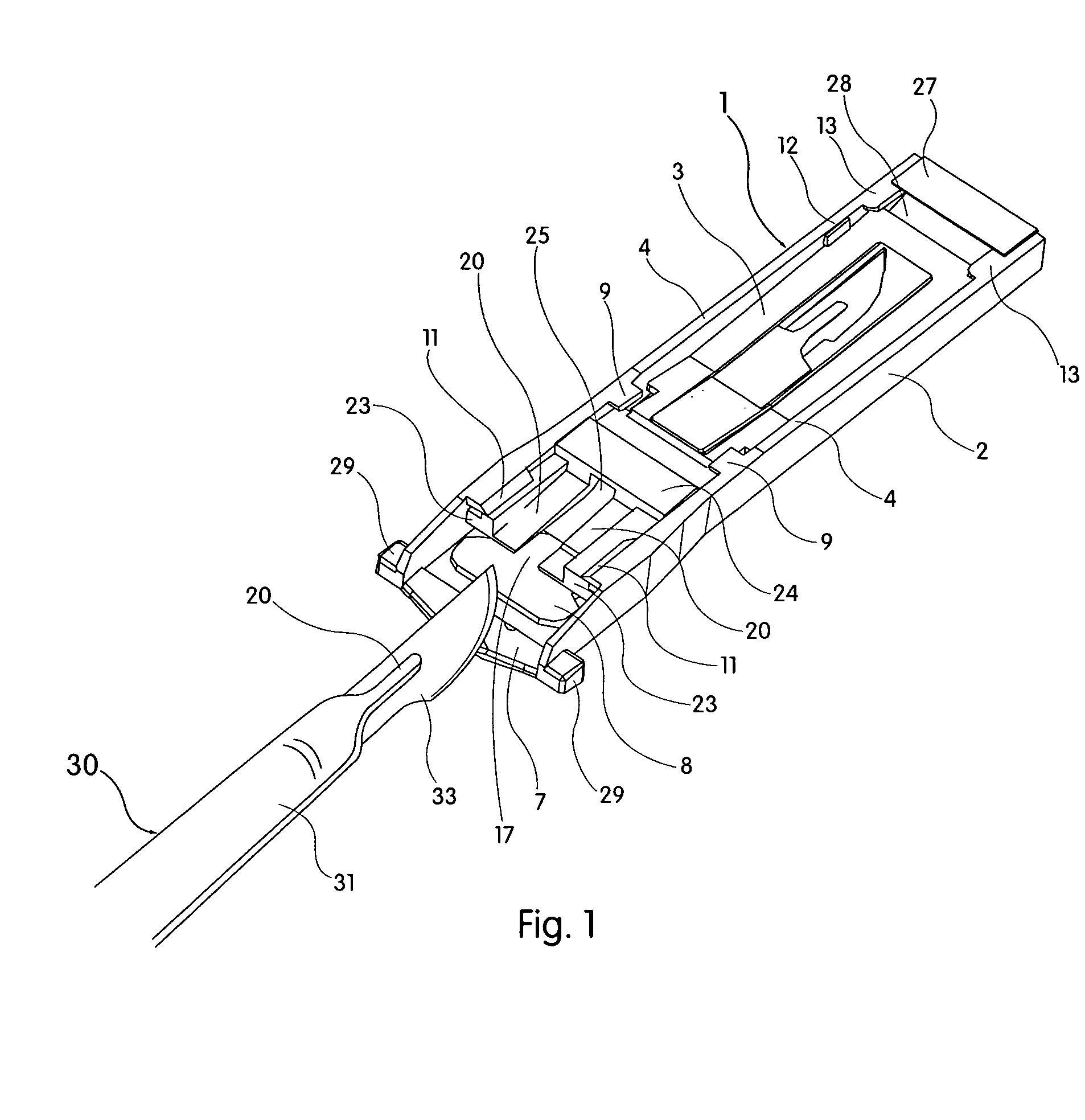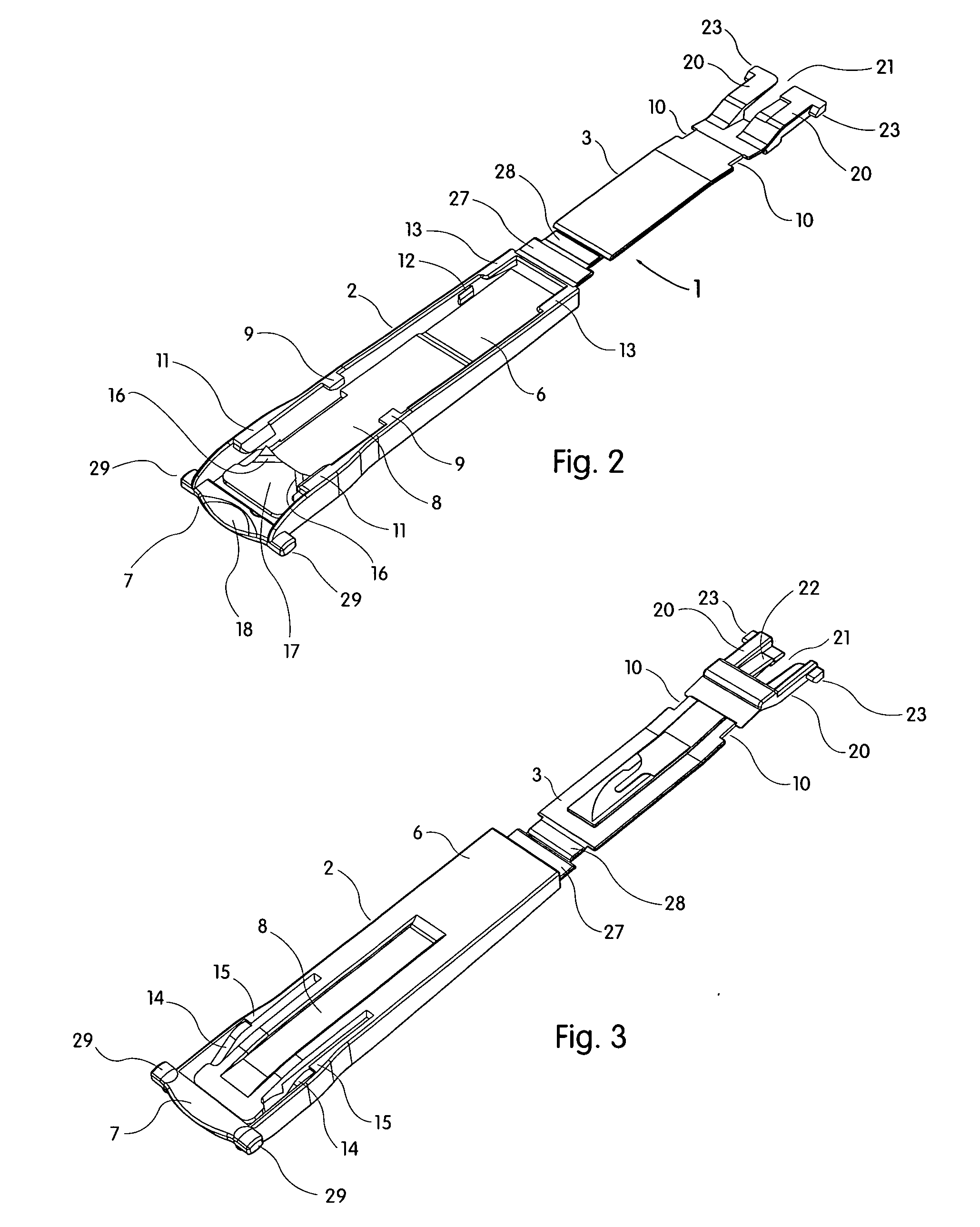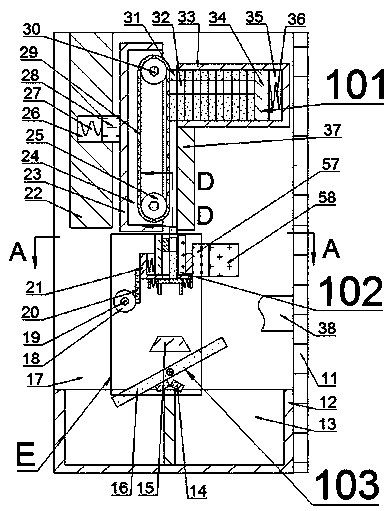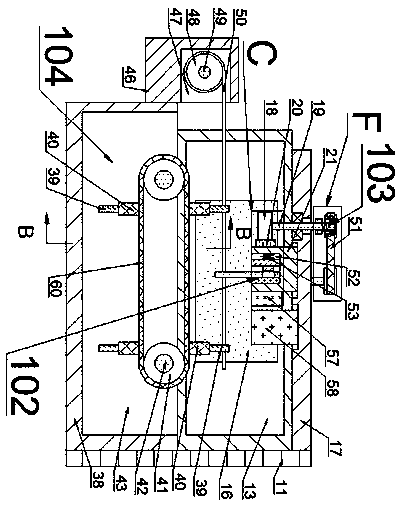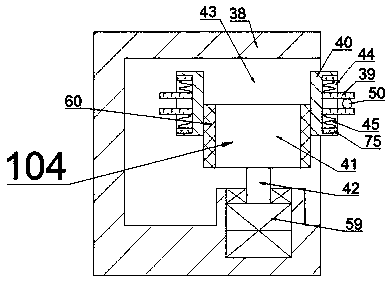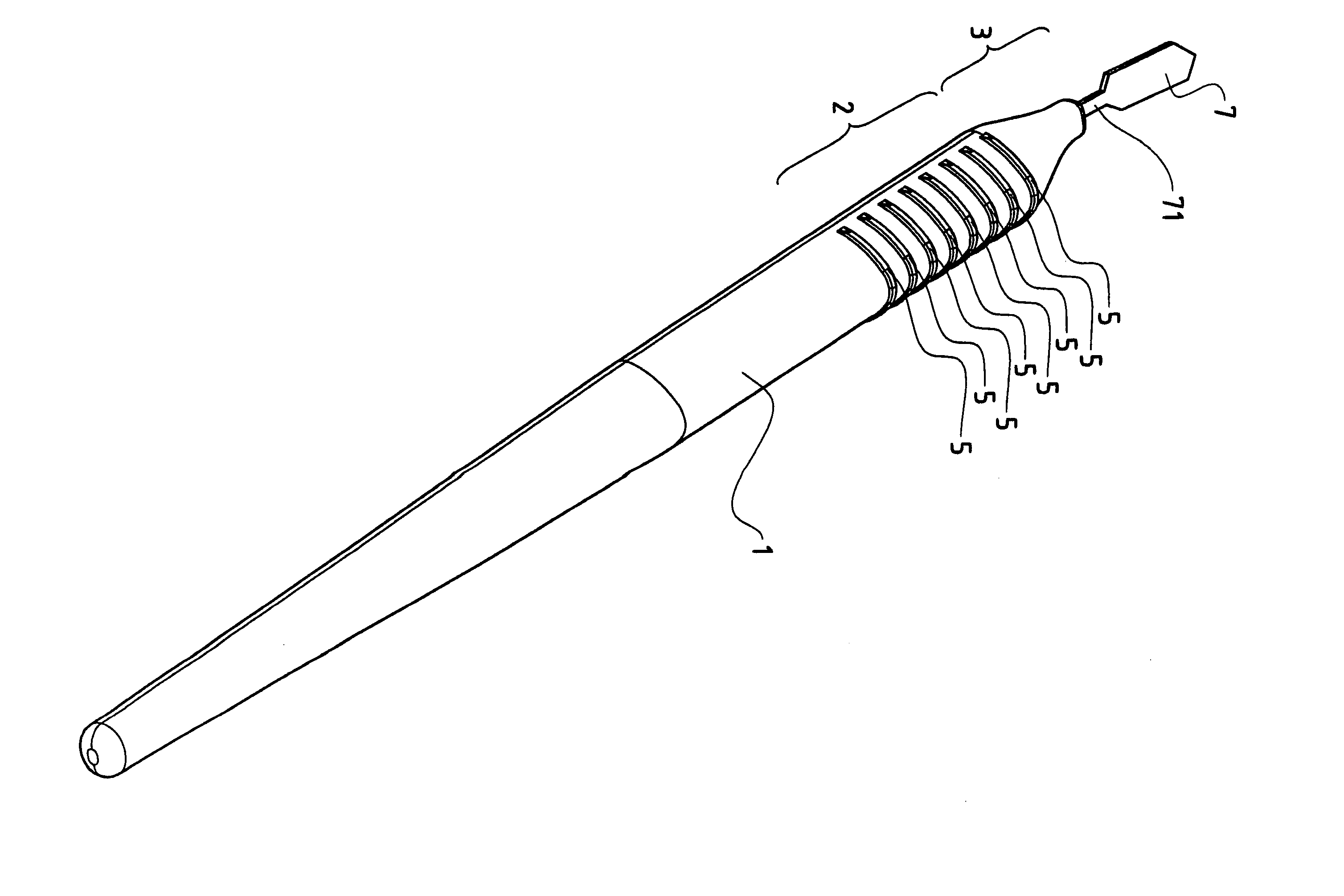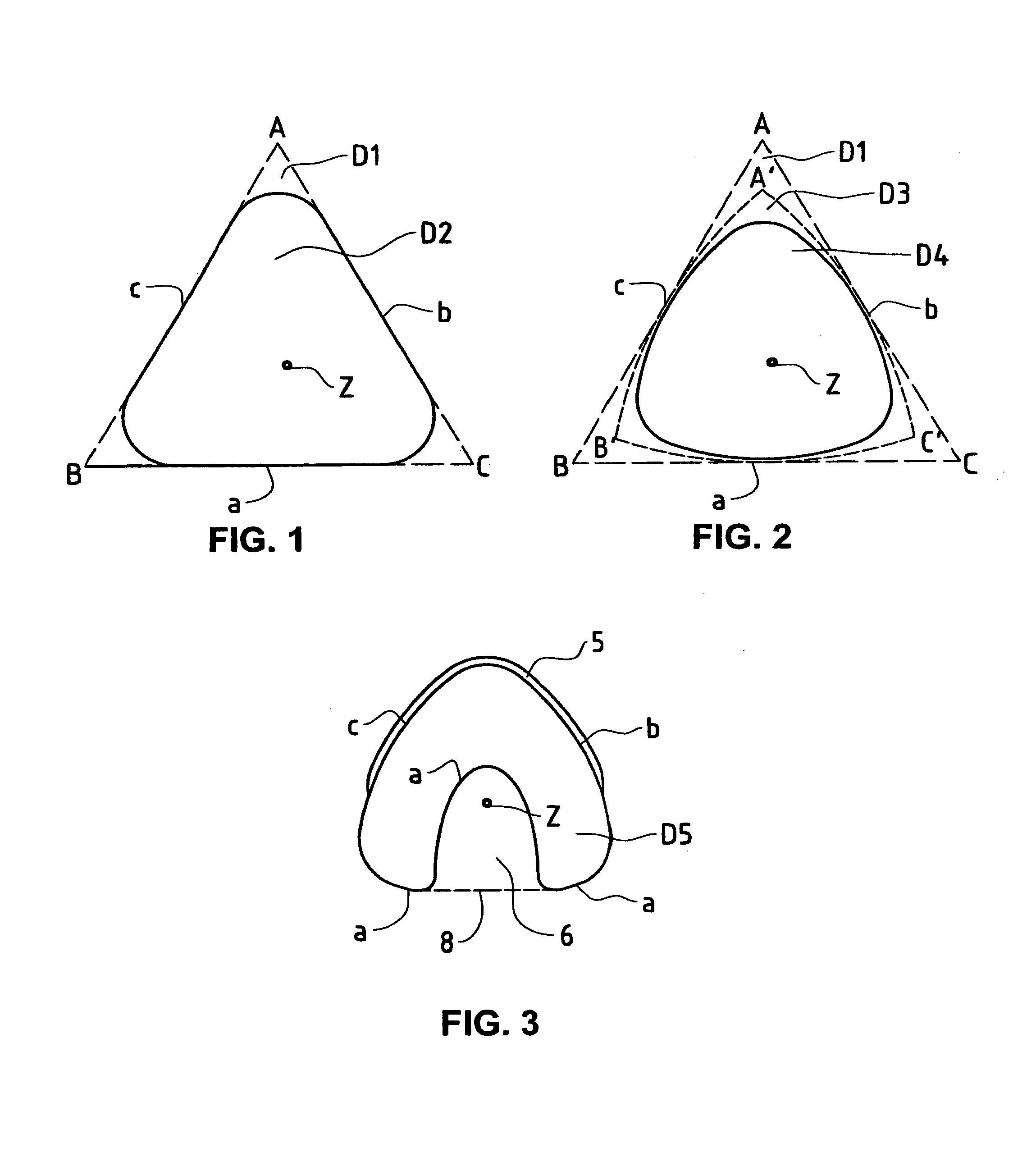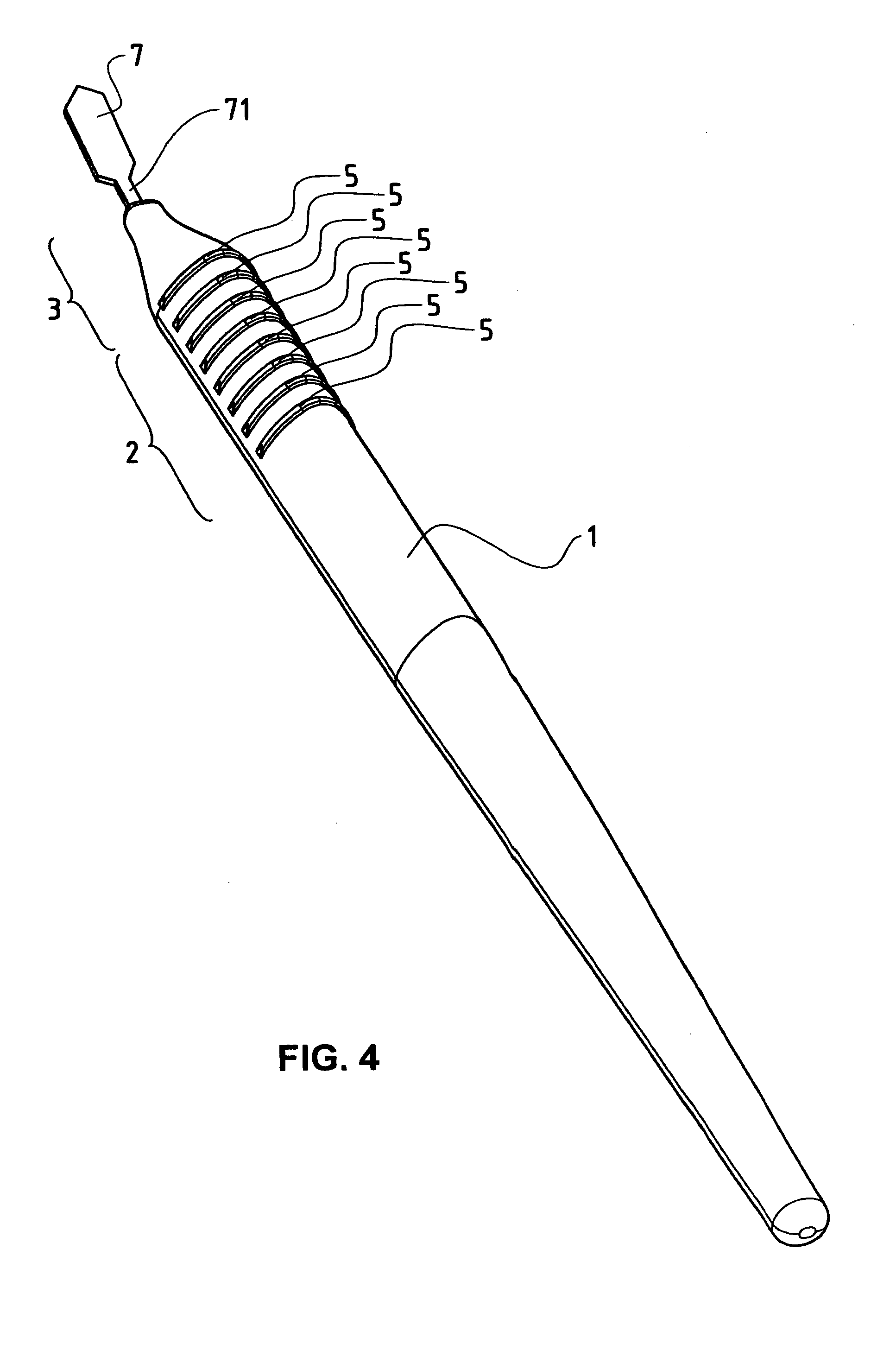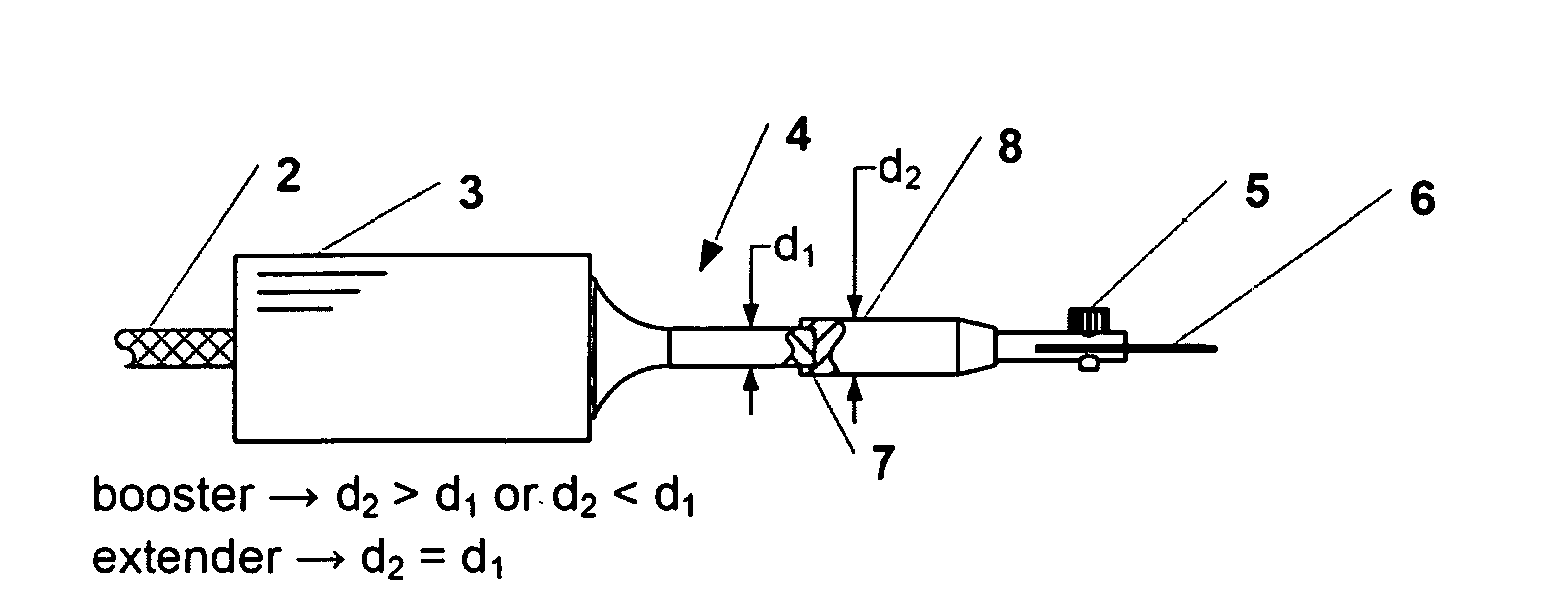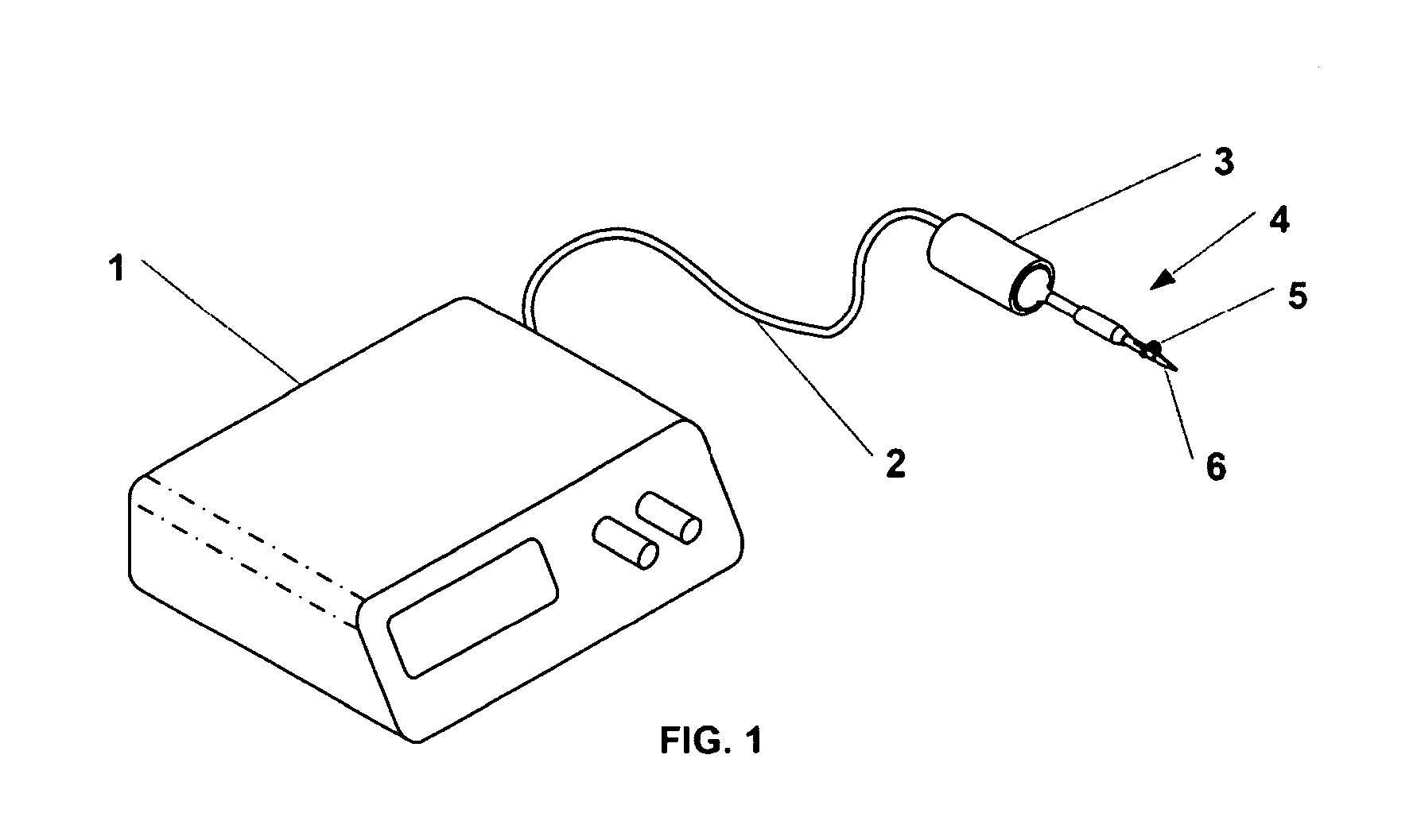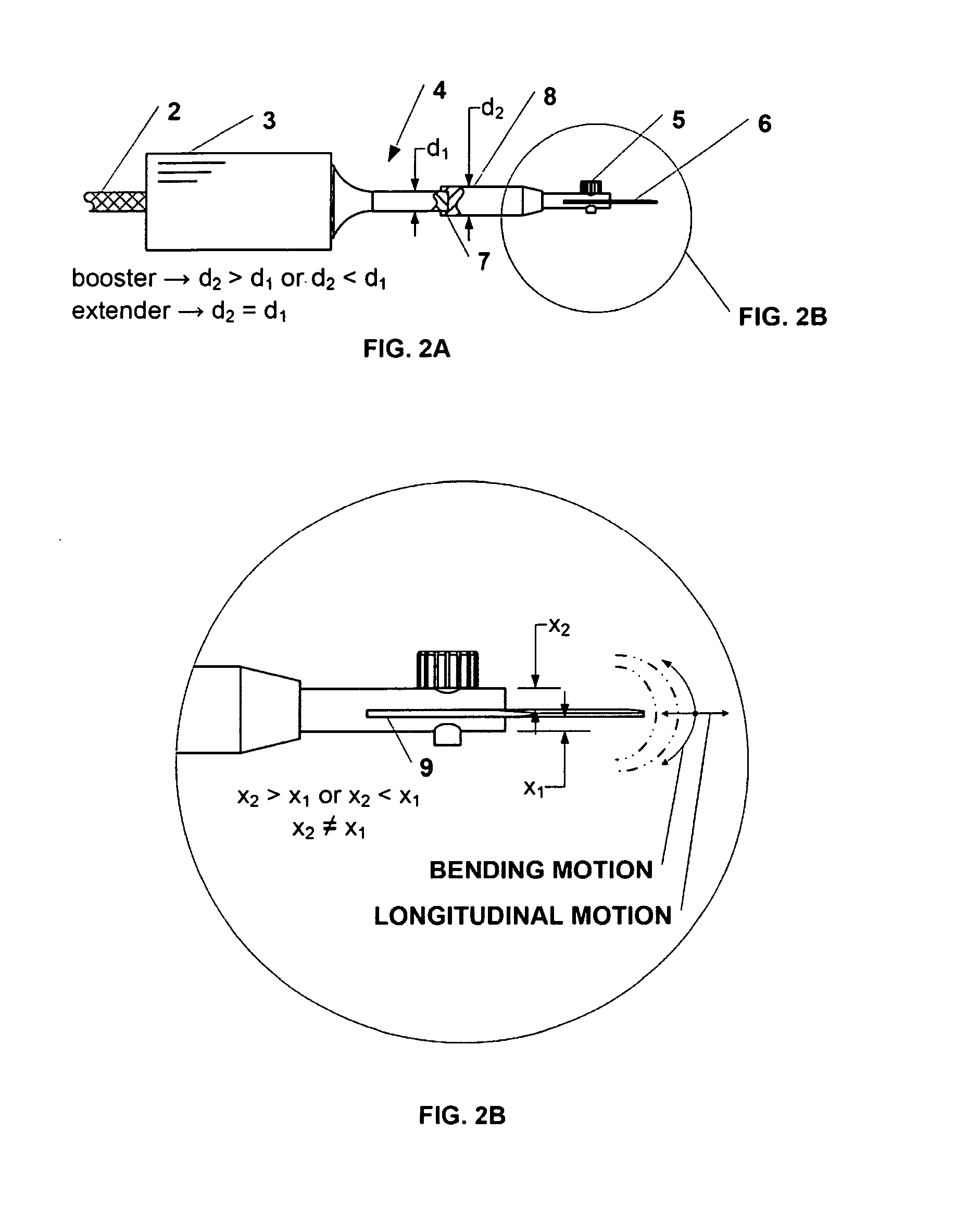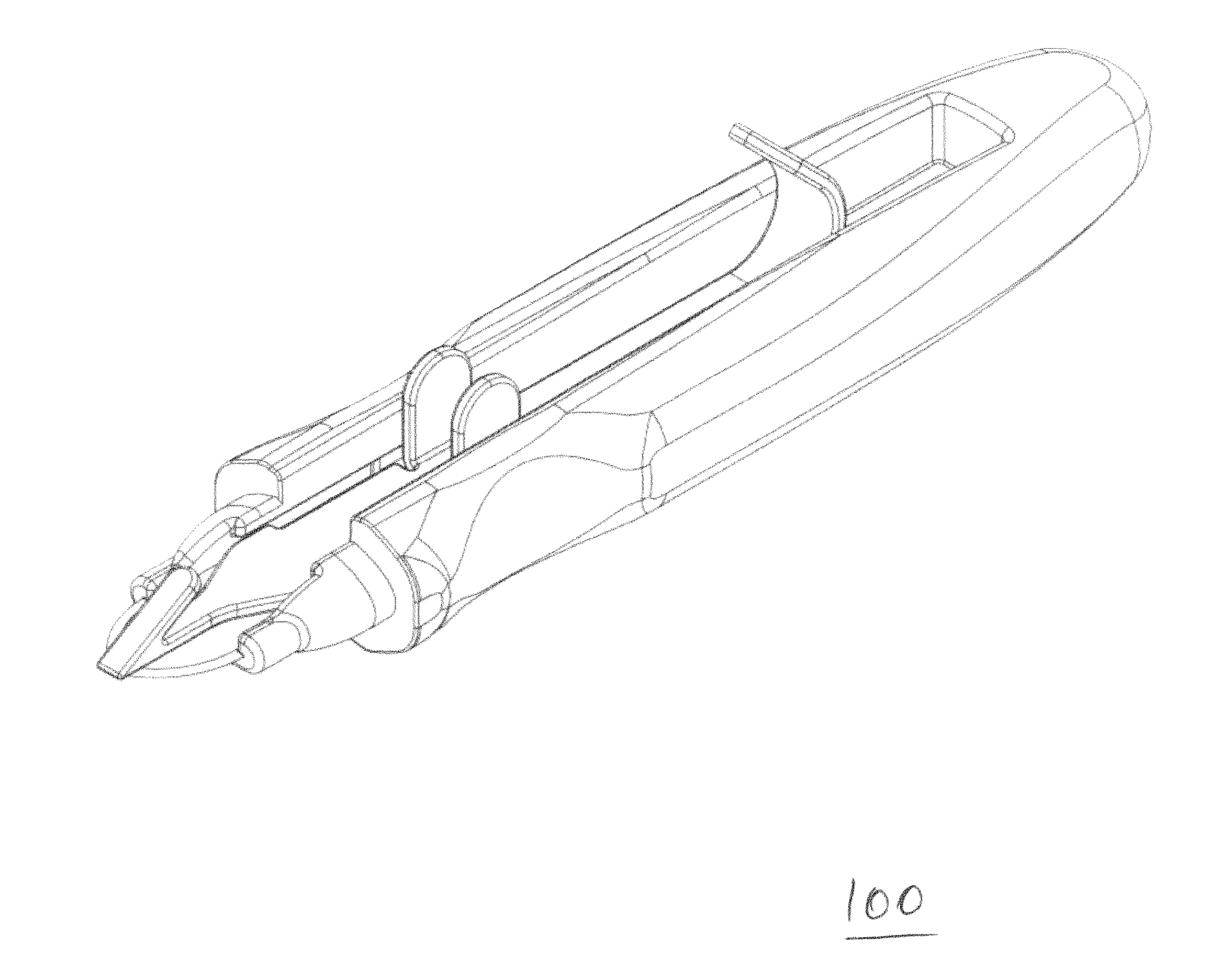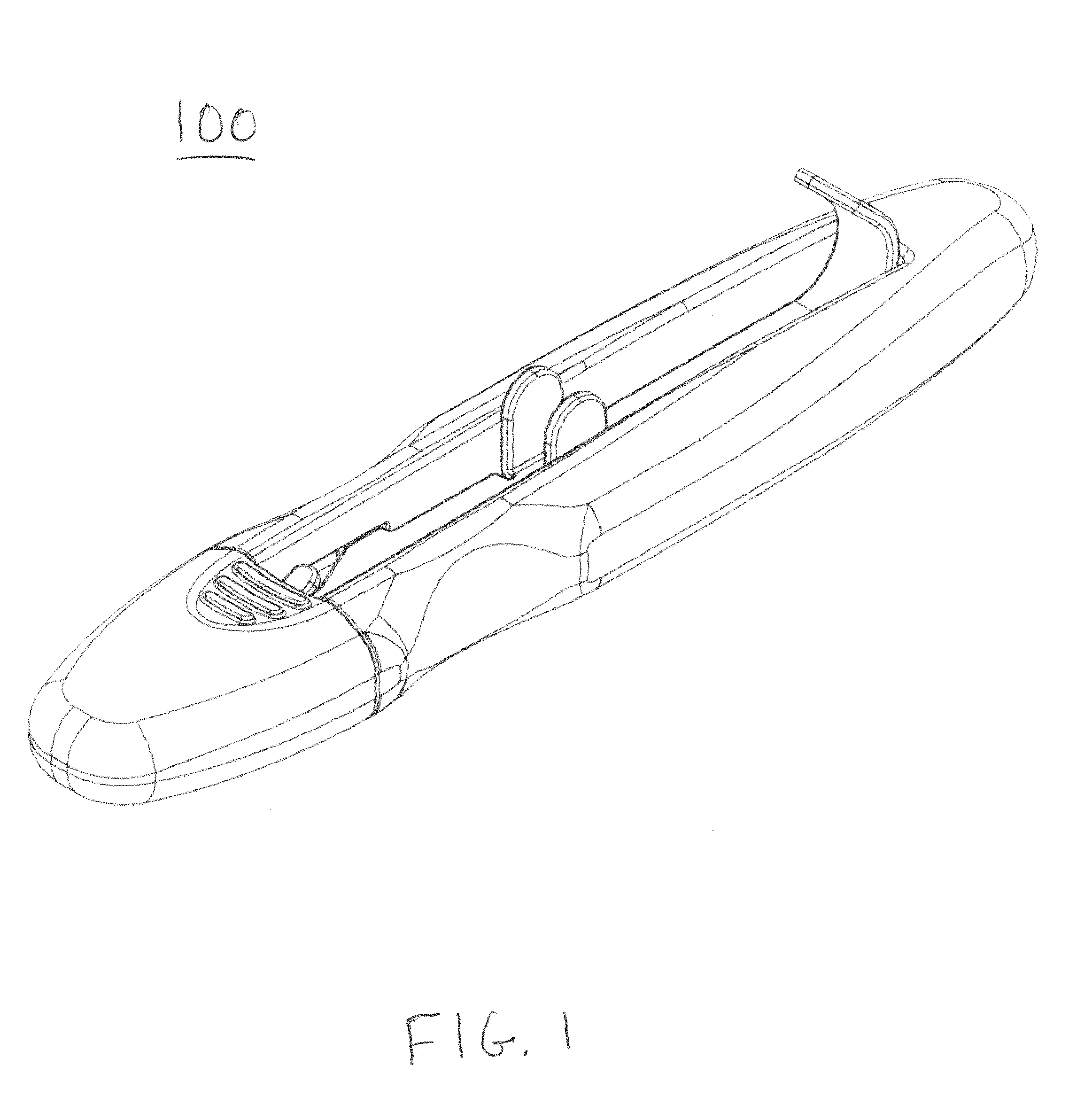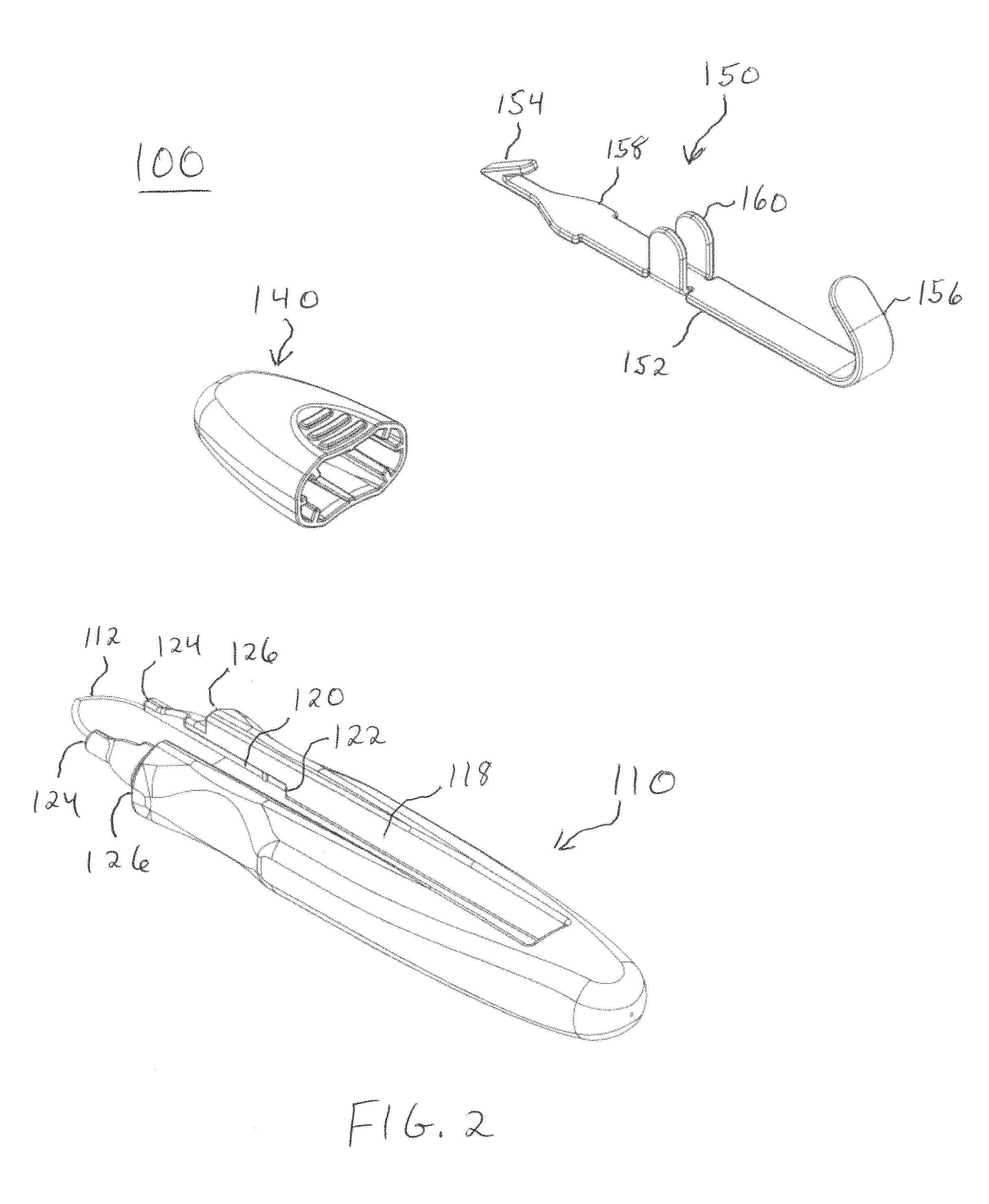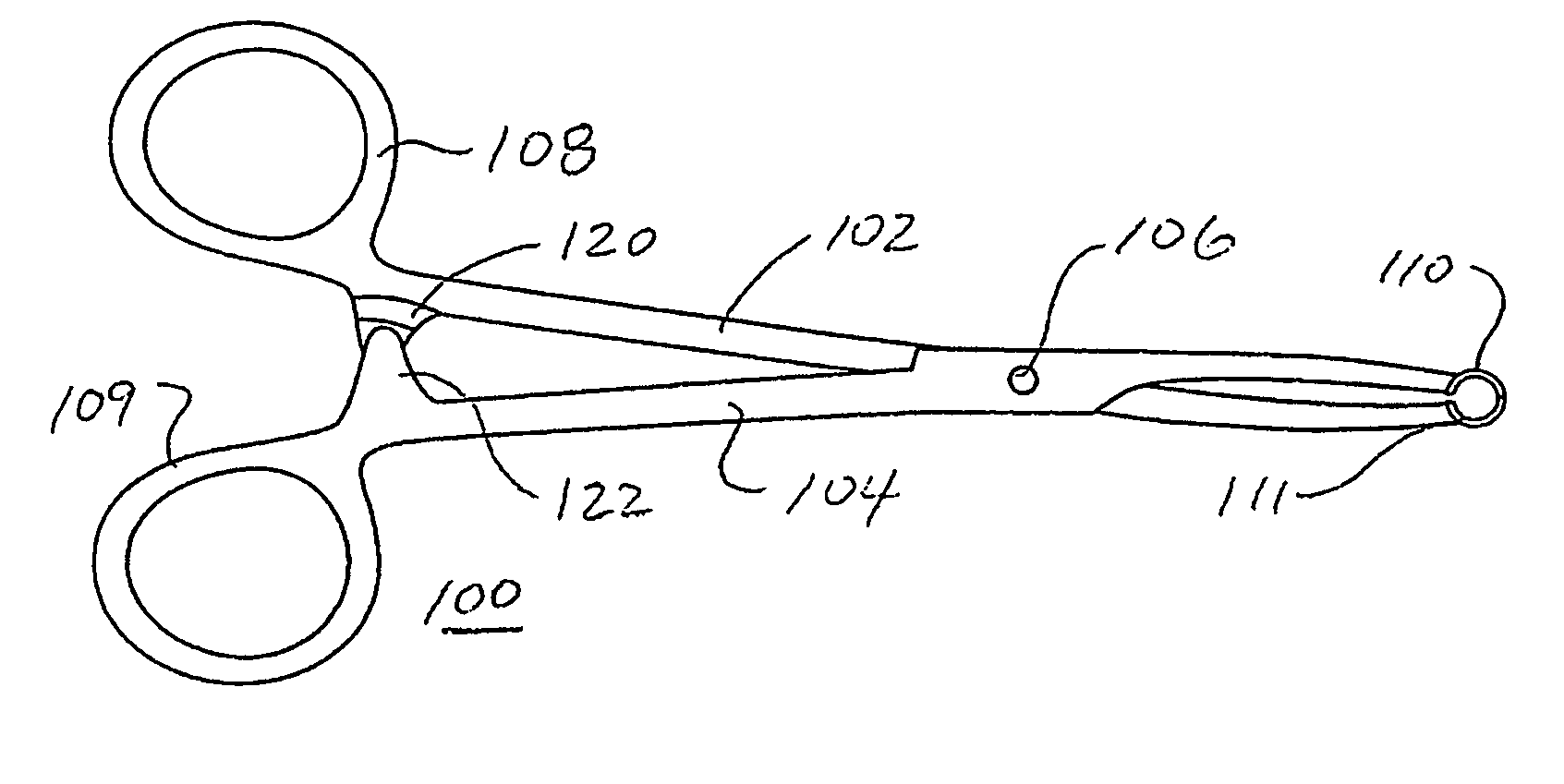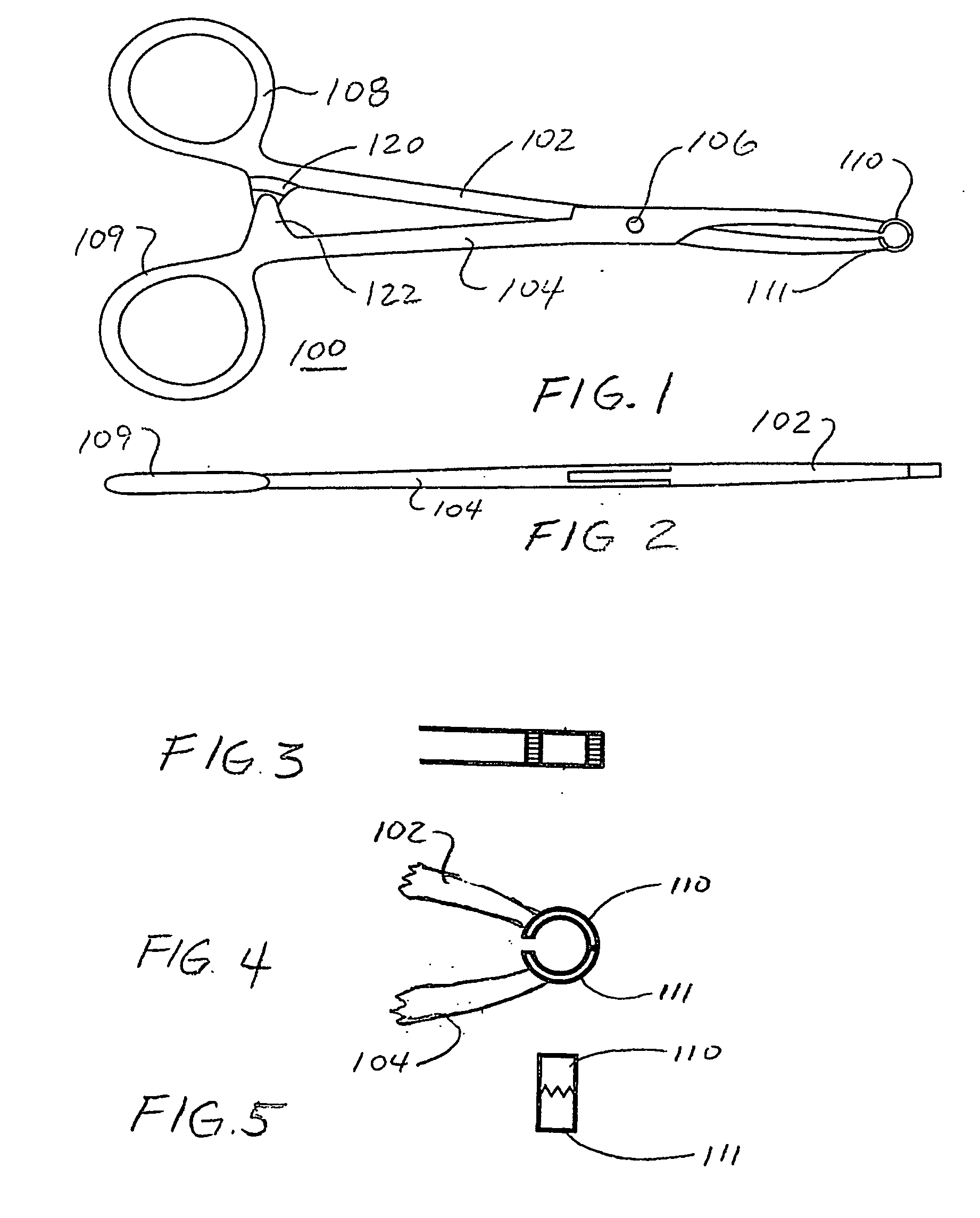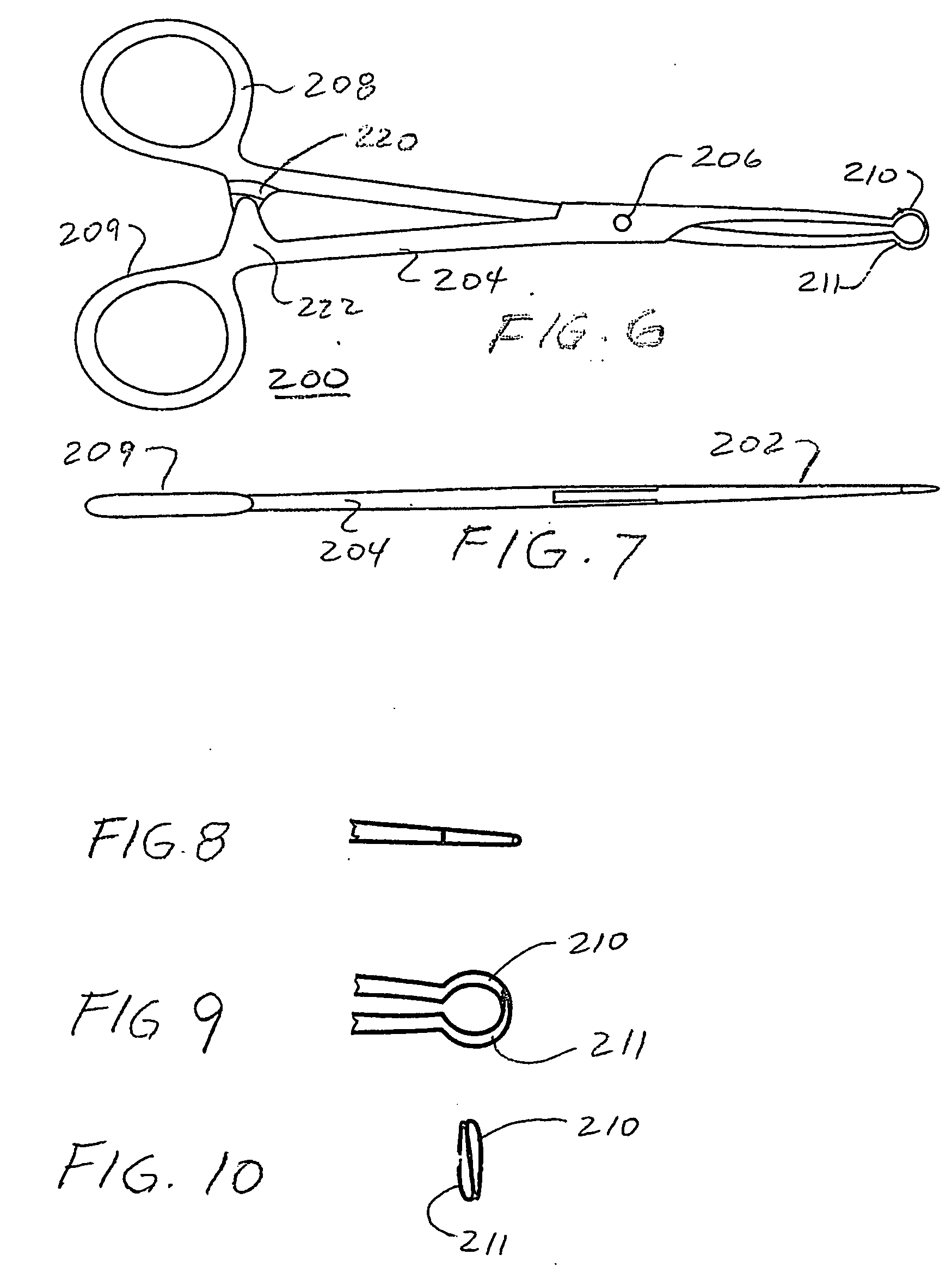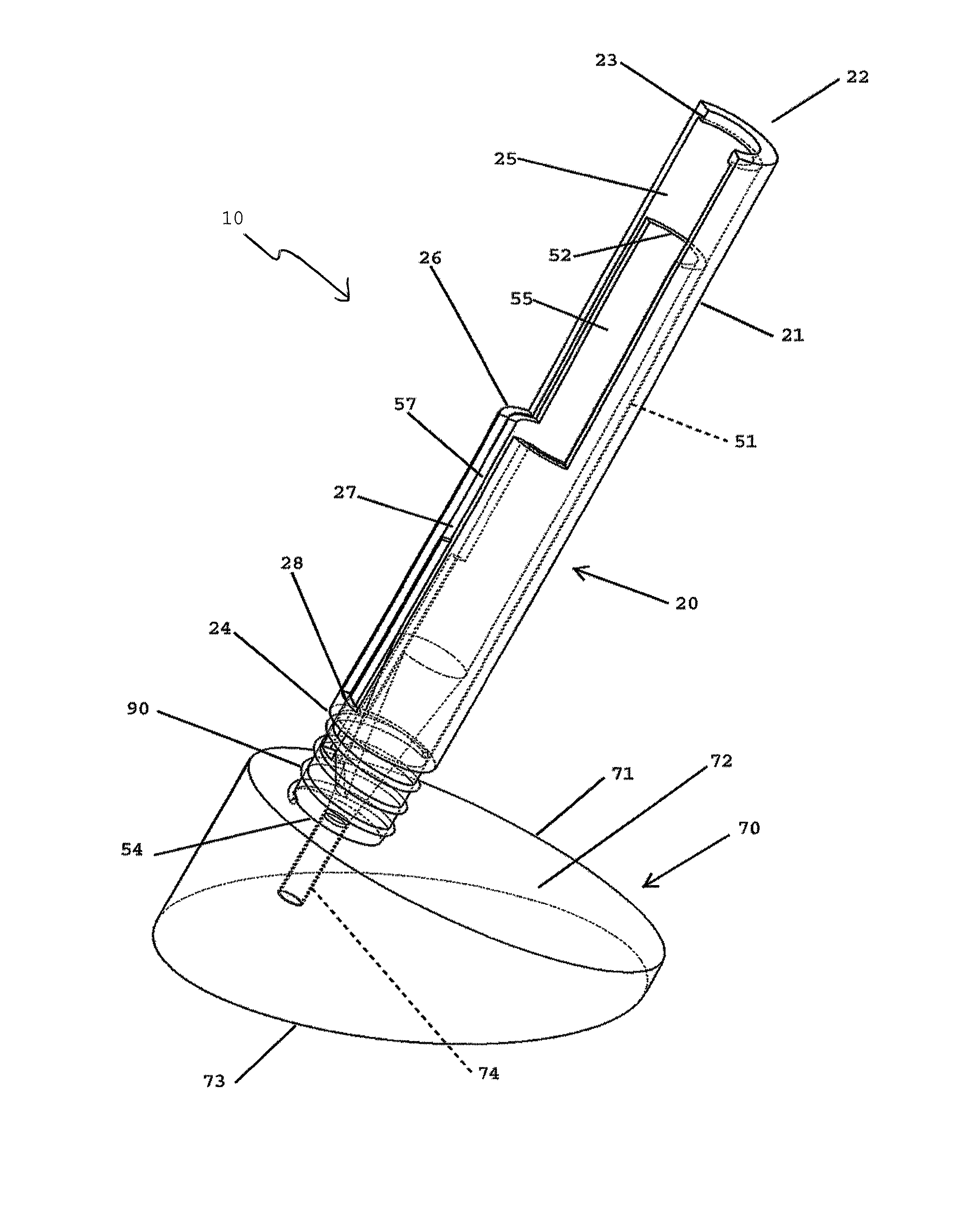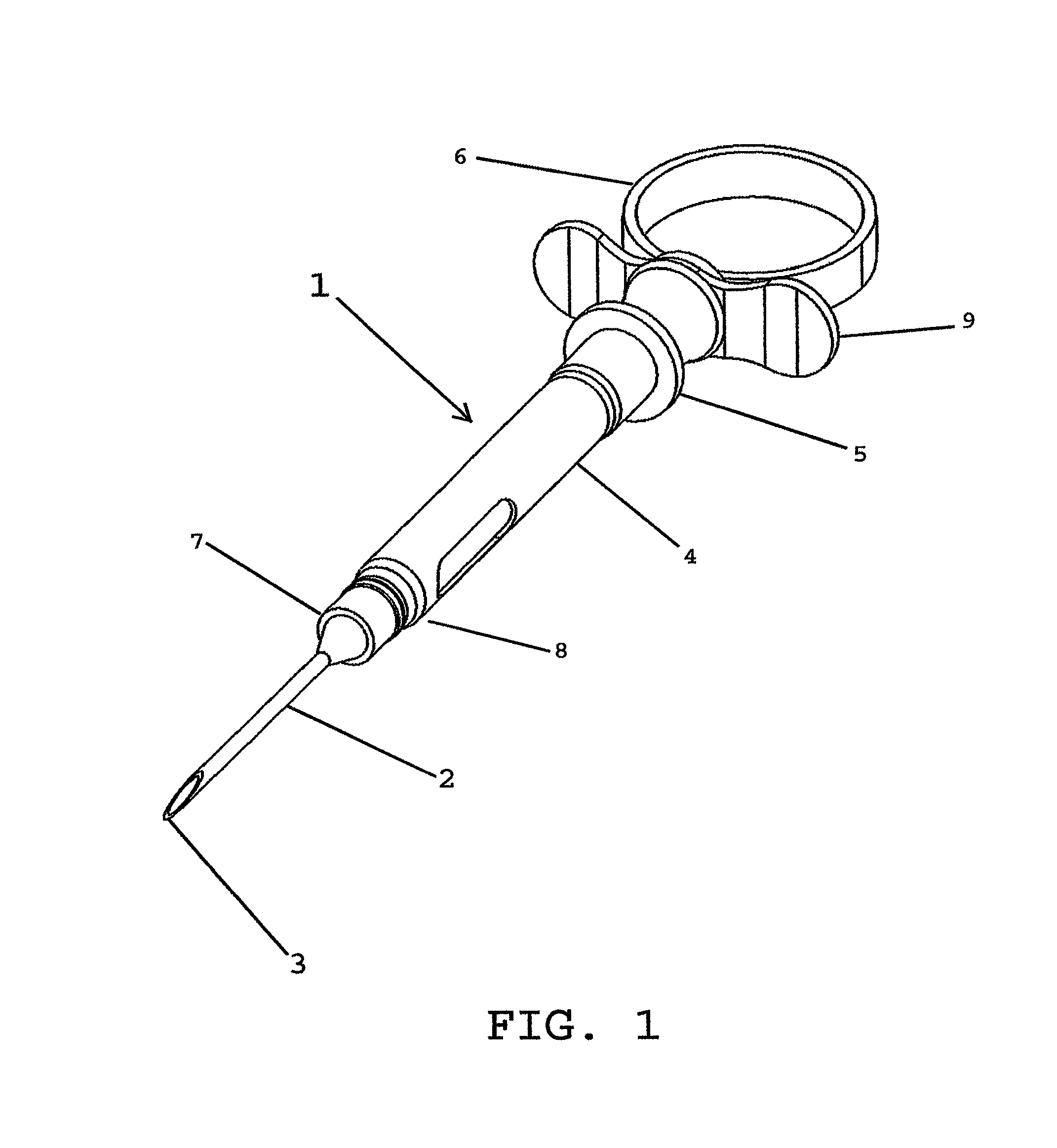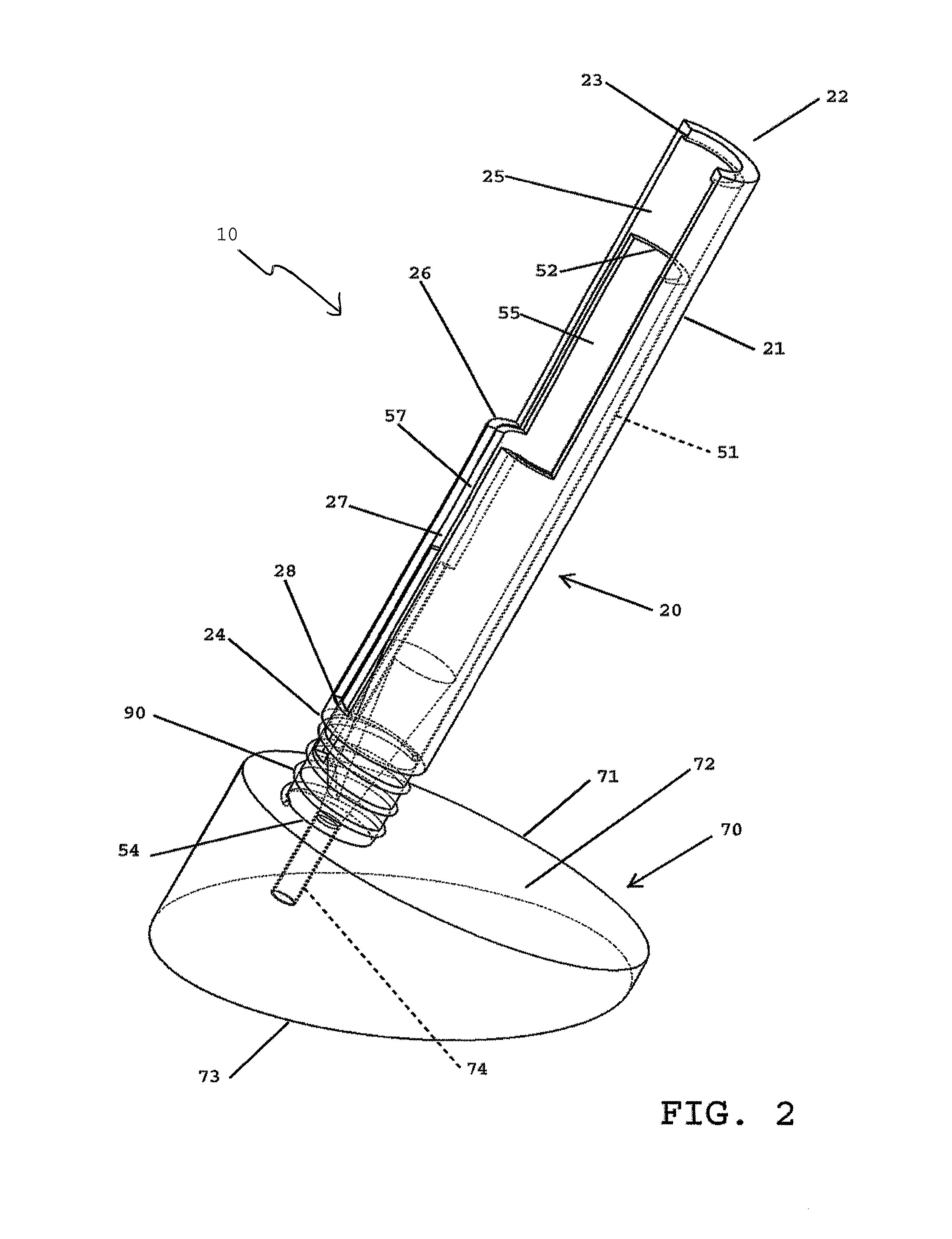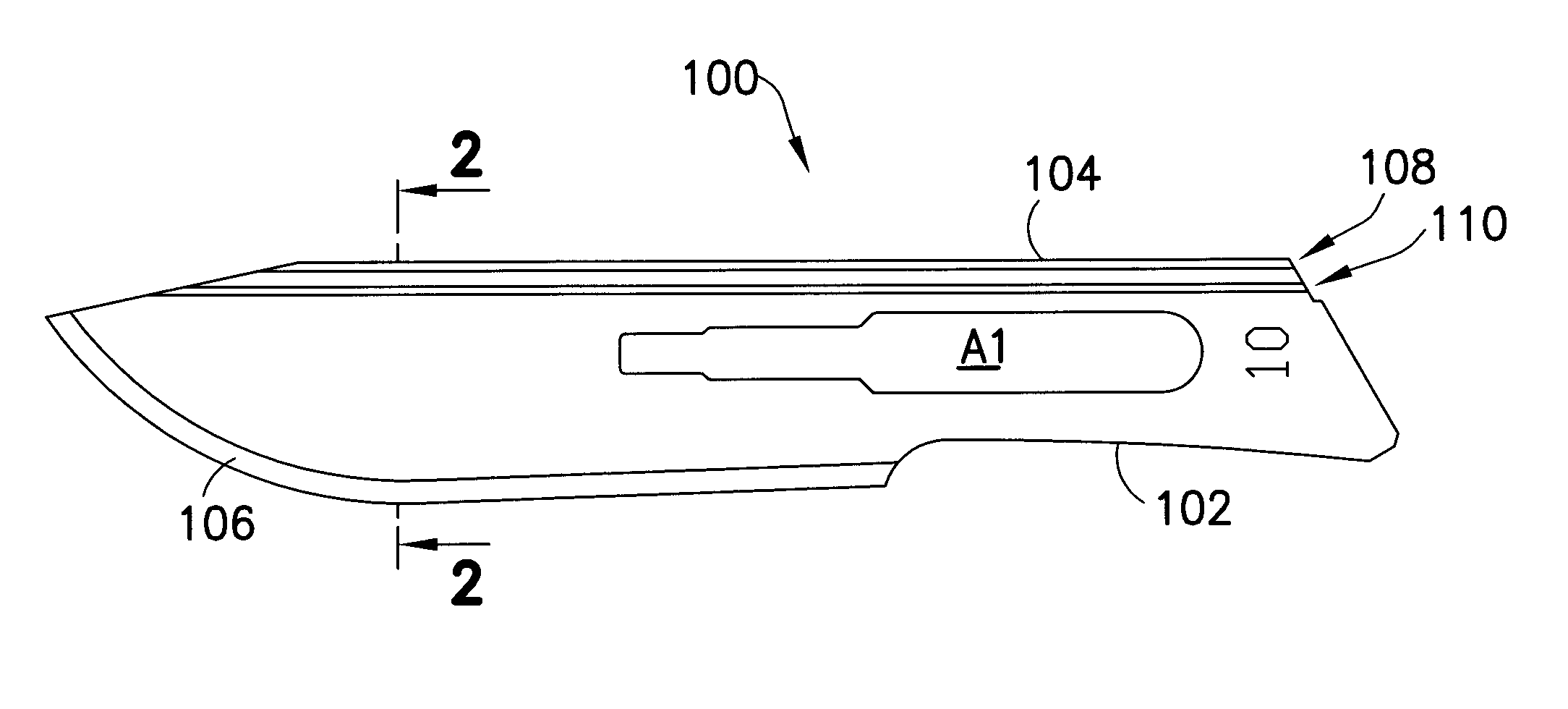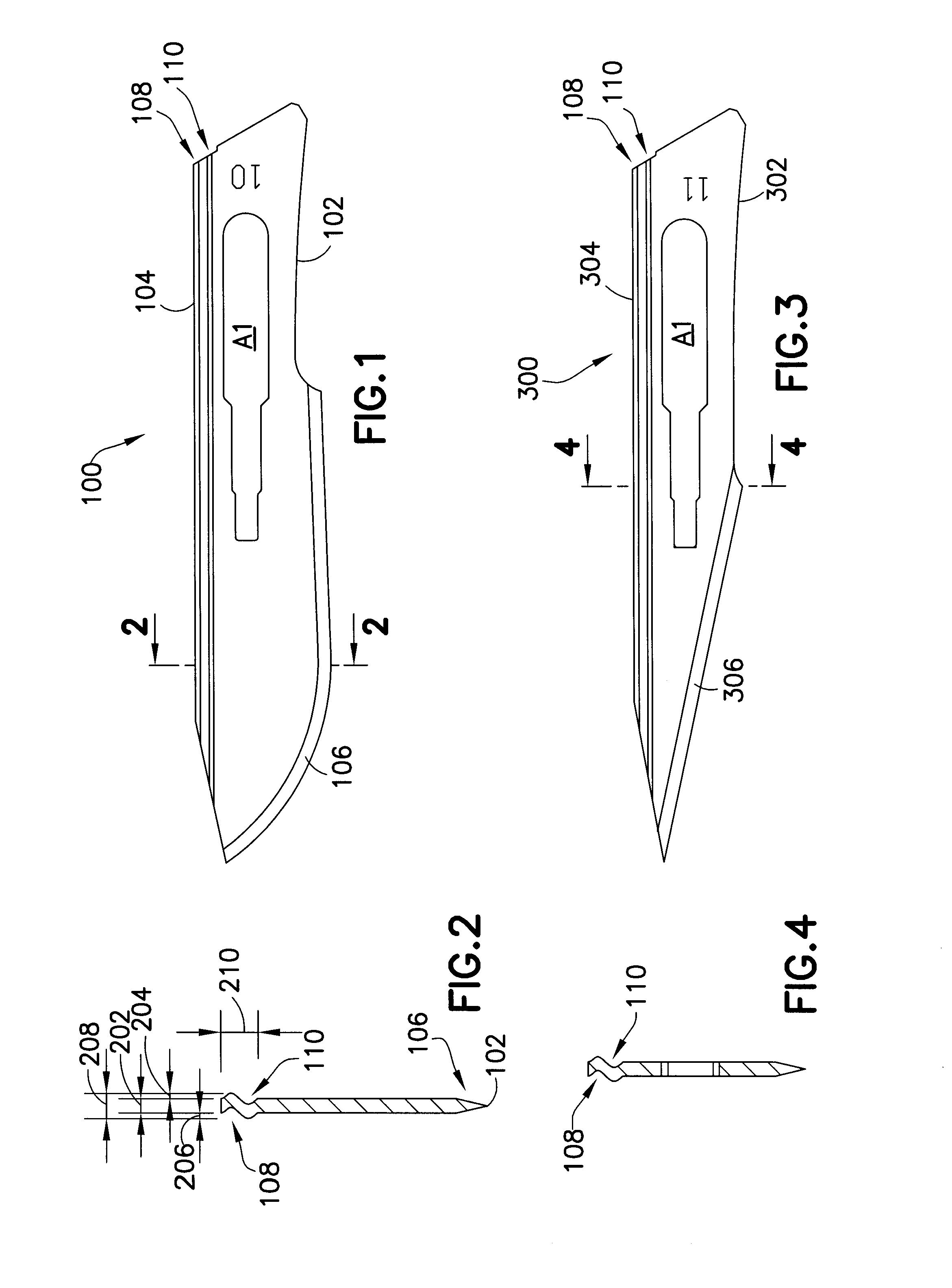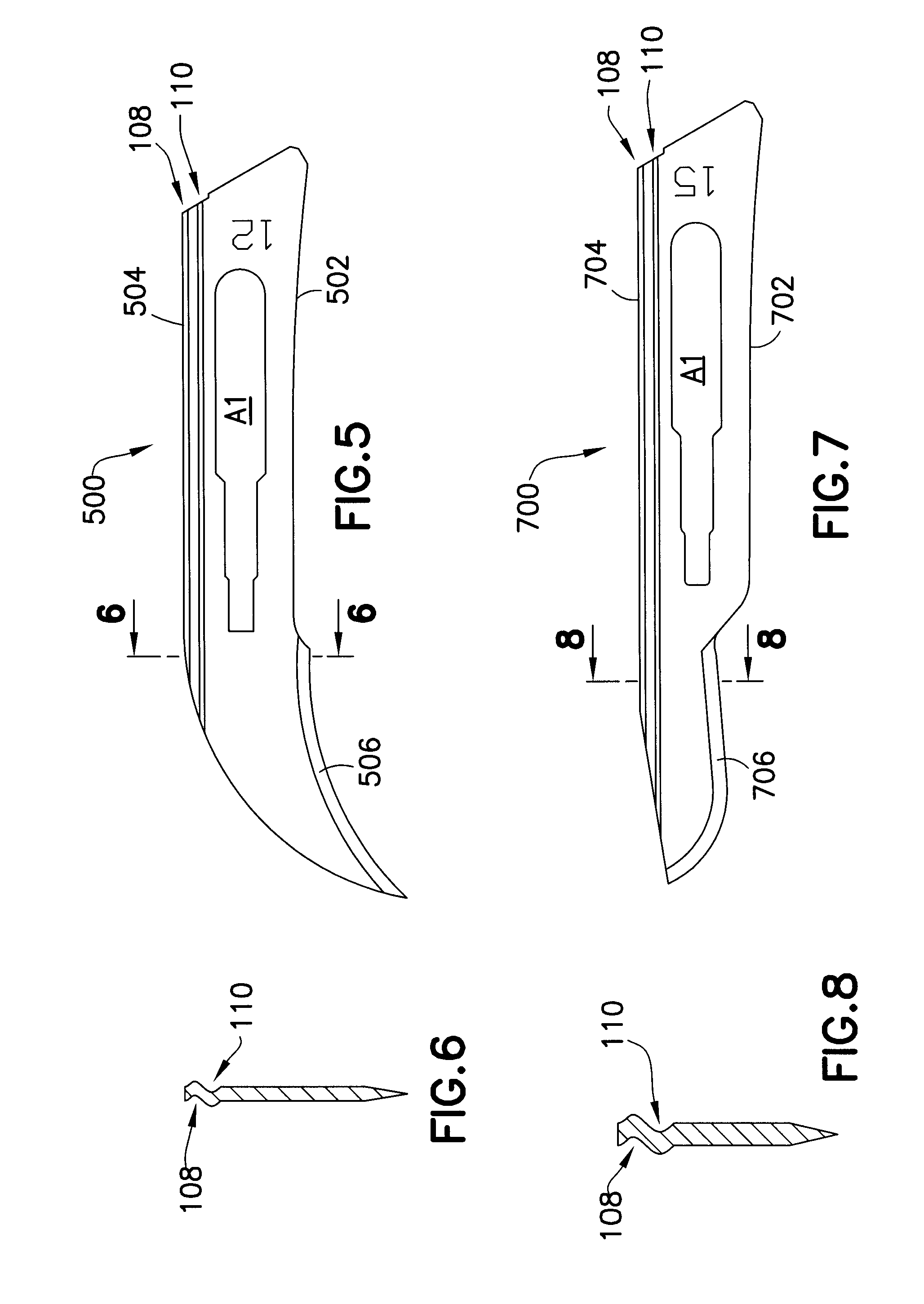Patents
Literature
116 results about "Scalpel blade" patented technology
Efficacy Topic
Property
Owner
Technical Advancement
Application Domain
Technology Topic
Technology Field Word
Patent Country/Region
Patent Type
Patent Status
Application Year
Inventor
Surgical instrument
An electrosurgical instrument for use in cutting and / or coagulating tissue includes a dielectric material, the dielectric material being positioned in the current pathway between the tissue-treatment regions of first and second electrodes. This can be achieved by providing one or more electrode surfaces coated with a dielectric material having a reactive impedance of less than 3,000 ohms / sq. mm. at 450 kHz. The dielectric coating acts to couple the RF signal into the tissue primarily by capacitive coupling, providing a more even heating of the tissue and the elimination of “hot spot”. Examples of electrosurgical instruments employing such coated electrodes include forceps, scissors or scalpel blade instruments.
Owner:GYRUS MEDICAL LTD
Surgical scalpel with retractable guard
InactiveUS6629985B1Safe handlingLittle risk of cuttingIncision instrumentsThrusting weaponsEngineeringSurgical department
A safety scalpel blade assembly comprising a scalpel blade, a guard which extends at least about the cutting edge of the blade, and releasable attachments device which releasably attach the blade to the guard as the assembly is being attached to the scalpel handle, thereby preventing the blade from cutting a person, but which releases the blade from the guard when the blade is attached to the blade carrier of the scalpel handle.
Owner:SOUTHMEDIC +1
Transfer tray for surgical sharps
The present invention is a dual function transfer tray that can be used for either a scalpel or a suturing needle holder with suturing needle. A scalpel slot is formed in the bottom of a relatively deep set of sloped walls. A suture needle cavity is formed above the first slot. However, at a mid-section of the scalpel slot and the half-cylindrical suture needle cavity are opposing and deep V-shaped cutaway sections in the sidewalls with a flat floor section between them. A user need never have to focus their attention for more than a split second to discern the location of the mid-section of the transfer tray. The user's thumb and forefinger are aimed at the V-shaped sidewall openings to grasp a midsection of a supported surgical sharps. The scalpel slot and half-cylindrical suture needle cavity are set relatively deep with respect to top edges of the transfer tray and the to form an open tray to prevent a user from being inadvertently injured by a scalpel blade or a suture needle. In addition, the scalpel cannot be placed in the scalpel slot unless it rests on one of its longitudinal edges, preferably the same one as that of its blade edge. Thus, a user grasping the mid-section of the scalpel handle in the cutaway and flat floor section picks up the scalpel in a ready-to-use position.
Owner:HOFTMAN MIKE
Retractable scalpel
ActiveUS7101382B2Rule out the possibilityEliminates accidental stabbingIncision instrumentsThrusting weaponsEngineeringMechanical engineering
The present invention is a retractable scalpel device with two releasable latching elements. When the scalpel blade is in an extended position, each releasable latching element is accessible for depression by finger pressure to cause retraction of the extended blade. However, the releasable latching elements are located on opposite edges (top and bottom edges) of a cover housing and about halfway along its length. The releasable latching elements must be depressed at the same time for the extended scalpel blade to be retracted into the cover housing.
Owner:GEORGE SAMUEL +1
Scalpel Blade Holder
A scalpel blade holder including a handle, a blunt probe, and a blade. A method of using the scalpel blade holder including inserting the blunt probe into a small incision, and advancing the scalpel blade holder to create the incision.
Owner:MORGAN LEE
Scalpel blade holder and scalpel
InactiveUS7150754B2Not to damageImprove gripIncision instrumentsDiagnosticsEngineeringMechanical engineering
Proposed are a scalpel blade holder and a scalpel with a scalpel blade holder, which make it possible for a user to determine the rotation of the scalpel about the center axis of the scalpel blade holder without eye contact with the scalpel or with the scalpel blade. The handle region of the scalpel blade holder comprises three lateral faces which are disposed such that a cross-section with a substantially triangular envelope results for the handle region. The envelope of the cross-section of the handle region has substantially the form of an arc triangle whose corners are rounded. A plurality of tactile identifying features are designed as protrusions in the form of ribs extending over two of the lateral faces and running crosswise to the longitudinal axis of the scalpel blade holder. One of the tactile identifying features is designed as a recess, and is disposed on the remaining third lateral face, and extends over part of the length of the scalpel blade holder. By means of his sense of touch, the user can determine the alignment of the scalpel blade with regard to its rotation about the center axis of the scalpel blade holder.
Owner:SIS SURGICAL INSTR SYST
Surgical scalpel with protective sheath
ActiveUS7087067B2High-quality materialStable and reliableIncision instrumentsPortable power-driven toolsProtection KITSurgical department
A protective sheath for a disposable surgical scalpel includes at least three modes of operation, (i) a protective mode, (ii) an open mode, and (iii) a permanently locked mode. In the open mode, a locking strip of the scalpel handle resides in one opening of the sheath to keep the sheath substantially immobile during use of the scalpel blade. In the protective mode, the locking strip resides in a second opening of the sheath to keep the sheath substantially immobile when the scalpel blade is not in use. In the permanently locked mode, a button connected to the sheath is depressed into the second opening and engages the locking strip, thereby preventing the blade from being used and allowing the scalpel to be safely disposed.
Owner:KEHR SURGICAL PRIVATE
Automatic retractable blade scalpel
Owner:REVOLUTIONS MEDICAL CORP
Scalpel blade safety accessory
A scalpel blade accessory and cartridge are provided wherein a tubular guard is slideable over the scalpel blade carrier between a retracted position in which the blade carrier is positioned to expose any scalpel blade associated with it for use and an extended position in which the guard covers the blade carrier and any blade thereon. The scalpel blade has a mounting slot for attachment to a lug on a standard scalpel handle for use. The blade carrier has a bridge spanning an alignment face so as to provide space for a scalpel blade between the alignment face and bridge. A blade catch cooperates with a rear end of the mounting slot to hold a relevant scalpel blade captive. The blade catch is disengagable by assembling it onto a standard handle, in use.
Owner:MEDI SAFE SURGICALS
Method and apparatus for sharps protection
ActiveUS20090266729A1Risk minimizationSuture equipmentsIncision instrumentsHypodermic needleSurgical blade
Devices and methods are disclosed for protecting individuals from the sharp ends of medical objects following use on a patient. Such sharp objects include hypodermic needles, scalpel blades, cannulae, trocars, and the like. The invention utilizes a disposable protective cover for the used sharp. The protective cover is designed to surround and embed the sharp in a permanent cover that is blunt and will not permit further puncture or cutting with the sharp. In an embodiment, the protective cover also absorbs any fluids on or in the used sharp and prevents any fluids from escaping the protective cover. The sharp cover is configured to irreversibly lock, once closed. A refillable or replaceable dispenser dispenses the protective covers at points of use. A disposable receptacle receives the used sharp embedded in the protective cover. When the receptacle is full, the entire receptacle may be discarded in a medical waste container.
Owner:PROVIDENCE ST JOSEPH HEALTH
Surgical knife blade attachment and method for using same
A system and method are disclosed for securing a blade to a blade post or handle base. A handle base is provided with a receiving port that includes a taper or dovetail configuration along a portion of each wall. The receiving port accepts a blade, and a cap is positioned within the exposed receiving port above the blade surface. The sides of the cap are secured within the dovetail sections along each wall of the receiving port and opposite securing ramps engage to secure the blade into position. The blade may be a keratome blade that is intended for opthalmic use, but the system and method can be used in connection with various types of opthalmic and non-opthalmic surgical knives.
Owner:BEAVER VISITEC INT US
Disposable scalpel
PCT No. PCT / GB96 / 02863 Sec. 371 Date Oct. 20, 1998 Sec. 102(e) Date Oct. 20, 1998 PCT Filed Nov. 20, 1996 PCT Pub. No. WO97 / 18764 PCT Pub. Date May 29, 1997This invention relates to a medical scalpel (10) that comprises a grip (20) and a scalpel blade (30) located on a blade carrier (40). The grip (20) and the blade carrier (40) are hingedly connected to each other by means of a hinge formation extending transversely to the principal axis of the scalpel. The blade carrier (40) is rotatable between an operative position, in which the blade (30) is exposed for use, and an inoperative position, in which the blade (30) is retained in a recess (22) formed in the grip (20). The blade carrier (40) is preferably adapted for one time rotation to and retention in the inoperative position of the blade (30) by engagement formations formed in corresponding surfaces of the blade carrier (40) and the grip (20). The scalpel is integrally moulded in injection moulded plastics material in which the hinge formation is constituted by an integrally moulded line of weakness (50) formed between the blade carrier and the grip.
Owner:FLEXICARE MEDICAL
Scalpel blade remover
ActiveUS7398880B2Easy to countRemoved and automaticallySurgical furnitureIncision instrumentsDetentActuator
A single-use scalpel blade remover (1) removes a blade (33) from a tang (32) of a scalpel (30) and captures it, in a single-handed operation. The remover (1) comprises a housing (2) having a detent (16), and an actuator (3) which is operatively juxtaposed with the housing (2) and moveable alongside the housing in a forward direction from a proximal position (whereat an opening is formed between the proximal ends of the actuator and the housing) to a distal position (whereat the detent (16) engages the proximal end of the actuator). The blade remover (1) also includes a cam-operated mechanism (14,23,20) for automatically separating the heel of the blade (33) from the tang (32) as the actuator (3) is moved to the distal position. In use, the blade (33) on the tang (32) is inserted in the opening and the actuator is pushed forward by the tang to its distal position, whereupon the detent (16) engages the proximal end of the actuator (3) and retains it in its distal position and prevents rearward movement of the blade (33). As the heel has been separated from the tang (32), upon withdrawal of the tang from the scalpel blade remover (1), the blade (33) is stripped from the tang and retained captively between the actuator (3) and the housing (2).
Owner:QLICKSMART PTY LTD
Cutting blade storage apparatus
A scalpel blade storage device, including a cover having a first lever arm and a second lever arm defined therein and further including a base. The base has a face defining a blade pocket therein having a distal portion adapted to receive a blade portion of a surgical scalpel blade and a proximal portion adapted to receive a shank portion of a surgical scalpel blade. The base is disposed adjacent to the cover, with the face in which the blade pocket is defined facing said cover. A plurality of arms is fixed to one of the base and the cover. The arms envelop at least a portion of the other of the base and the cover to retain the base and the cover in a sliding relationship. The cover is movable between a first closed position in which the blade pocket is completely covered by the cover, and a second open position in which the blade pocket is at least partially uncovered. The invention further includes methods of withdrawing a scalpel blade to the storage device and mounting it on a scalpel handle, and for demounting the scalpel blade and returning it to the storage.
Owner:R MED
Scalpel blade guard
A scalpel shield system for a scalpel that has a handle and a blade with a sharp cutting edge. The system is mountable on the scalpel and provided with a blade guard member having a pivot component engagable with a pivot component on the blade or the handle. The blade guard member is manually pivotable relative to the scalpel between a guard position for preventing injury by the sharp cutting edge and a retracted position for exposing the sharp cutting edge.
Owner:NEW YORK UNIV
Cauterizing scalpel blades
InactiveUS7097642B1Incision instrumentsSurgical instruments for heatingSurgical bladeCombustible gas
An apparatus is disclosed for cutting and cauterizing of tissue. The apparatus comprises a cutting edge of a blade. The apparatus further comprises a conduit having a catalyst located near the conduit outlet, and the conduit is for delivering a combustible mixture of gases. The gases react in the presence of the catalyst and generate heat. The heat generated cauterizes blood vessels when applied to the cut tissue.
Owner:UOP LLC
Knife edge polishing and grinding device provided with arc-shaped scalpel
ActiveCN104959882AImprove work efficiencyAchieve double-sided polishingOther manufacturing equipments/toolsGrinding machinesRelative motionEngineering
The invention relates to a knife edge polishing and grinding device provided with an arc-shaped scalpel. The knife edge polishing and grinding device comprises a base, a polishing and grinding fixture and a polishing and grinding head mechanism; the polishing and grinding fixture comprises a knife clamping base and a rail base plate, an arc-shaped rail and a matching body are arranged between the knife clamping base and the rail base plate, and a swing mechanism is formed by the knife clamping base and the rail base plate by matching of the arc-shaped rail and the matching body; when external force is acted on the knife clamping base, the knife clamping base swings on the rail base plate along the arc-shaped rail. A prismatic pair is arranged between the polishing and grinding fixture and the base or between the polishing and grinding head mechanism and the base, so that relative motion is generated between the polishing and grinding fixture and the polishing and grinding head mechanism; the polishing and grinding head mechanism comprises a first polishing and grinding wheel and a second polishing and grinding wheel, and the first polishing and grinding wheel and the second polishing and grinding wheel are arranged in a staggered mode in the direction of the relative motion of the polishing and grinding fixture and the polishing and grinding head mechanism. According to the knife edge polishing and grinding device, the structure is simple, the conception is ingenious, the cost is low, and the work efficiency is high. By means of the simple structure, effective space avoidance is achieved, therefore double-faced polishing and grinding can be carried out on a scalpel blade, and the processing efficiency of the knife edge polishing and grinding device is improved in multiples.
Owner:STERILANCE MEDICAL SUZHOU
Sharps container with blade remover, needle unsheather, latch and security alignment extensions
ActiveUS8752700B1Low costEasily and effectively sealedIncision instrumentsDispensing apparatusEngineeringScalpel blade
The present invention includes a scalpel blade removal device with an opening in a wall defining a first blade guide, extending to a narrowing upward ramp bounded by left and right guide walls. A horizontal top ramp extends from the distal end of the upward ramp, bounded by left and right guide towers. A spring loaded notch device is adapted to lock behind a proximal end of a scalpel blade seated on a scalpel, where the scalpel is inserted in the opening and the blade edge is driven up the ramp to the top ramp. When the notch device is locked behind that end of the scalpel blade, the scalpel is pulled back, causing the scalpel blade to slide off the scalpel handle. A sharps container incorporates the removal device, a reinforced latch, a scalpel resting location, and needle cover removers.
Owner:HOFTMAN MOSHE MIKE
Holder for a surgical knife blade
InactiveUS8074364B2Easy to operateNot have risk of injuryIncision instrumentsThrusting weaponsEngineeringScalpel blade
A holder for a surgical knife blade has a holder body, a slide member supported slidably by the blade storage barrel, an attaching finger formed in part of the slide member to attach the surgical knife blade, a slide operating piece integrally formed with the slide member, a lock hook member that prevents the slide member from sliding, locking concave grooves disposed in a slide guide edge of the holder body which guides the slide member slidably and engaging in the lock hook member, and a lever device, coupled to the slide member, for supporting the lock hook member while biasing the lock hook member toward the locking concave groove. The locking concave grooves are formed in an attachment position where the surgical knife blade is attached to the attaching finger in the slide member. In a storage position, the surgical knife blade is stored in the storage barrel.
Owner:ACP JAPAN +1
Safe scalpel with assembled steel handle
InactiveCN101642383ANo disengagementEliminate potential safety hazardsIncision instrumentsMechanical engineeringScalpel blade
The invention relates to a safe scalpel with an assembled steel handle, comprising a guarded scalpel assembly and the steel handle, wherein the guarded scalpel assembly comprises a scalpel blade, a scalpel loading body, a scalpel sleeve and a safety latch, the scalpel blade is fixed in the front of the scalpel loading body, the scalpel sleeve is sleeved on the scalpel loading body in a sliding mode, and the safety latch is connected to the scalpel loading body in a sliding mode. Before the scalpel is used, the guarded scalpel assembly is firstly inserted into the steel handle and is connectedwith a tache by an inserting structure, then, a button arranged on the scalpel sleeve is pressed by a thumb to pull the scalpel sleeve from a first valve to the end backwards and is locked to a secondvalve, the safety latch is driven by the scalpel sleeve and inserted into a groove of the steel handle, so a tache connecting structure is in a protection state and can not be separated, and the scalpel blade can be exposed to use at the moment. In order to prevent the damage of medical personnel by the scalpel blade in an operation process, the scalpel sleeve is pushed to the first valve by pressing the button. After safe scalpel with the assembled steel handle is used, the scalpel sleeve is pushed to a death valve forwards by pressing the button, the safety latch retreats from the groove inorder to relieve protection simultaneously, and the guarded scalpel body assembly can be disassembled by pressing the button on the steel handle. Because the guarded scalpel assembly can not be usedagain after being self-locked, the safe scalpel with the assembled steel handle thoroughly eliminates the potential safety hazards of the prior scalpel with a steel handle.
Owner:STERILANCE MEDICAL SUZHOU +1
Surgical knife blade attachment and method for using same
A system and method are disclosed for securing a blade to a blade post or handle base. A handle base is provided with a receiving port that includes a taper or dovetail configuration along a portion of each wall. The receiving port accepts a blade, and a cap is positioned within the exposed receiving port above the blade surface. The sides of the cap are secured within the dovetail sections along each wall of the receiving port and opposite securing ramps engage to secure the blade into position. The blade may be a keratome blade that is intended for opthalmic use, but the system and method can be used in connection with various types of opthalmic and non-opthalmic surgical knives.
Owner:BEAVER VISITEC INT US
Combination scalpel blade
InactiveUS20060271077A1Increase flexibilityImprove efficiencyIncision instrumentsSurgical bladeBiomedical engineering
A surgical scalpel having multiple cutting segments designed especially for podiatric surgical procedures is disclosed. More particularly, the scalpel blade has a handle attachment section and a number of cutting segments. The blade includes a single-edged longitudinal cutting segment extending from the handle attachment section, a single-edged curved cutting segment contiguous with the longitudinal cutting segment, and a double-edged end tip cutting segment contiguous with the curved cutting segment. The double-edged end tip cutting segment may be designed in varying degrees of curvature, including semi-circular and semi-elliptical. Multiple cutting edges are contained on one scalpel blade for optimum flexibility, efficiency, and economy.
Owner:LOWE JOHN PATRICK TRUSTEE CHAPTER 7 CASE NO 09 51026 C IN THE UNITED STATES BANKRUPTCY COURT FOR THE WESTERN DISTRICT OF TEXAS SAN ANTONIO DIV
Scalpel blade remover
A single-use scalpel blade remover (1) removes a blade (33) from a tang (32) of a scalpel (30) and captures it, in a single-handed operation. The remover (1) comprises a housing (2) having a detent (16), and an actuator (3) which is operatively juxtaposed with the housing (2) and moveable alongside the housing in a forward direction from a proximal position (whereat an opening is formed between the proximal ends of the actuator and the housing) to a distal position (whereat the detent (16) engages the proximal end of the actuator). The blade remover (1) also includes a cam-operated mechanism (14, 23, 20) for automatically separating the heel of the blade (33) from the tang (32) as the actuator (3) is moved to the distal position. In use, the blade (33) on the tang (32) is inserted in the opening and the actuator is pushed forward by the tang to its distal position, whereupon the detent (16) engages the proximal end of the actuator (3) and retains it in its distal position and prevents rearward movement of the blade (33). As the heel has been separated from the tang (32), upon withdrawal of the tang from the scalpel blade remover (1), the blade (33) is stripped from the tang and retained captively between the actuator (3) and the housing (2).
Owner:QLICKSMART PTY LTD
Scalpel cutting edge sharpness detection device
InactiveCN110987705ARealize automatic continuous detectionImprove detection efficiencyInvestigating machinabilityStructural engineeringKnife blades
The invention discloses a scalpel cutting edge sharpness detection device comprising a fixed plate. A lifting plate is fixedly connected to the left side end surface of the fixed plate; a blade supplydevice is arranged on the end surface of the front side of the lifting plate; a sharpness detection device arranged on the lower side of the blade supply device is arranged on the end face of the front side of the lifting plate and is used for clamping and fixing a blade to be detected. The sharpness detection device can drive the blade to move downwards, so that the movement required for detecting the sharpness of the blade is realized. A blade screening device arranged on the lower side of the sharpness detection device is arranged on the end face of the front side of the lifting plate. A blade screening device is used for screening qualified and un-qualified blades; and a suture supply device arranged between a storage box and a linear motor is fixedly connected to the left side end face of the fixed plate. A scalpel cutting edge sharpness detection device has the advantages that the scalpel blade sharpness can be automatically and continuously detected, the detection efficiency can be greatly improved; and the scalpel cutting edge sharpness detection device is suitable for large-batch detection.
Owner:淳安县环程医疗器械有限公司
Scalpel blade holder and scalpel
InactiveUS20050101978A1Not to damageImprove gripIncision instrumentsDiagnosticsEngineeringMechanical engineering
Proposed are a scalpel blade holder and a scalpel with a scalpel blade holder, which make it possible for a user to determine the rotation of the scalpel about the center axis of the scalpel blade holder without eye contact with the scalpel or with the scalpel blade. The handle region of the scalpel blade holder comprises three lateral faces which are disposed such that a cross-section with a substantially triangular envelope results for the handle region. The envelope of the cross-section of the handle region has substantially the form of an arc triangle whose corners are rounded. A plurality of tactile identifying features are designed as protrusions in the form of ribs extending over two of the lateral faces and running crosswise to the longitudinal axis of the scalpel blade holder. One of the tactile identifying features is designed as a recess, and is disposed on the remaining third lateral face, and extends over part of the length of the scalpel blade holder. By means of his sense of touch, the user can determine the alignment of the scalpel blade with regard to its rotation about the center axis of the scalpel blade holder.
Owner:SIS SURGICAL INSTR SYST
Ultrasonic scalpel
InactiveUS20090228032A1Improve cutting efficiencyLess necrosis formationIncision instrumentsSurgical operationSurgical blade
An ultrasound scalpel that may be used for surgical operations is disclosed in this invention. The ultrasound scalpel comprises an ultrasound generator, housing, transducer horn, retaining member and scalpel blade. The device is able to utilize sharp stainless steel surgical blades amenable to being produced as disposable single-use replacement blades. Ultrasonic energy transmitted from transducer horn to surgical blade causes bending waves to be created due to the off-center attachment and / or placement of the surgical blade. This device may be utilized for cutting through skin and / other soft tissues during surgical operations, thereby enhancing cutting efficacy, decreasing and / or eliminating necrosis formation.
Owner:BACOUSTICS LLC
Surgical device for cricothyrotomy and the like
For cricothyrotomy and the like, a surgical device has, in one embodiment, a device body with a bi-directional scalpel, an end cap, and a tracheal hook that fits within a channel formed in the device body. With the end cap removed to expose the bi-directional scalpel blade and with the tracheal hook fully inserted within the body channel, the device can be held, e.g., in the dominant hand of an operator, and manipulated to make an opening in the patient's neck using the exposed scalpel blade. The tracheal hook can then be slid away from the device body with the hook's barbed tip entering the opening to enable the operator to easily and quickly secure the surgical airway. The design of the surgical device enables an economy of movements that otherwise would typically not be within the skill set of an operator who was not a surgeon.
Owner:LEVITAN RICHARD M
Toothed vasectomy clamps and methods of using same
InactiveUS20070260269A1Overcomes shortcomingSimple methodSurgical forcepsWound clampsSplit ringEngineering
Apparatus and methods for performing vasectomies are disclosed. In preferred embodiments, a clamp has a set of jaws, the distal ends of which terminate in a circular structure that is essentially a split ring. In certain embodiments, each jaw has a serrated edge that corresponds to serration on the opposite jaw, and each jaw is slightly less than a half-circle so that when closed there is a small slot or opening toward the handle side of the jaws. The jaws are adapted to grasp the vas of a patient and the slit permits a scalpel blade to cut the vas sheath longitudinally in the clamped region. Alternatively, the serrated jaws can be replaced by a single tooth on each arm of the clamp, and these teeth overlap, again leaving a single slot. Finally, in certain other embodiments, the distal ends are hooked structures and remain spaced apart even when the clamp is in the closed position.
Owner:MARMAR JOEL L
Temporary instrument holder, sharps protector, passing aid and safety transport apparatus
Owner:STARCAP MEDICAL
Scalpel blade having dual indentations on back edge
The present invention is directed to a scalpel blade having a longitudinal axis, the scalpel blade preferably comprising a first edge coincident with the longitudinal axis, a second edge coincident with the longitudinal axis, a cutting edge located along at least a portion of the first edge, and a first indentation in juxtaposition with and spanning at least a portion of the second edge, wherein the first indentation is offset in a first direction from the second edge. The scalpel blade preferably further comprises a second indentation in juxtaposition with and spanning at least a portion of the first indentation, wherein the second indentation is offset in a direction opposite from the second edge. The scalpel blade can either be removably attached to a reusable scalpel handle or indelibly attached to a disposable scalpel.
Owner:ADITYA DISPOMED PRODS PRIVATE
Features
- R&D
- Intellectual Property
- Life Sciences
- Materials
- Tech Scout
Why Patsnap Eureka
- Unparalleled Data Quality
- Higher Quality Content
- 60% Fewer Hallucinations
Social media
Patsnap Eureka Blog
Learn More Browse by: Latest US Patents, China's latest patents, Technical Efficacy Thesaurus, Application Domain, Technology Topic, Popular Technical Reports.
© 2025 PatSnap. All rights reserved.Legal|Privacy policy|Modern Slavery Act Transparency Statement|Sitemap|About US| Contact US: help@patsnap.com
